MULTIPLE CHOICE. Choose the one alternative that best completes the statement or answers the question.
Name the quadrant in which the point is located.
1) (16, 14)
A) I B) II C) III D) IV
Answer: A
2) (-18, 8)
A) I B) II C) III D) IV Answer: B
3) (-12, -19)
A) I B) II C) III
IV Answer: C
4) (13, -11)
A) I B) II C) III
Answer: D
Identify the points in the graph for the ordered pairs. x


5) (0, 2), (4, 3)
A) F and E B) C and E
IV
C) B and C D) C and K Answer: B
6) (-5, -4), (0, -3)
A) A and G B) I and J C) A and J D) G and I Answer: B
7) (-3, 4), (2, 0), (4, -5)
A) F, K, and L B) A, B, and F
Answer: D
8) (3, 5), (-3, 0)
A) D and J B) I and G
Answer: D 1
C) B, C, and L
D) B, F, and L
C) L and J D) D and G
Give the coordinates of the points shown on the graph.
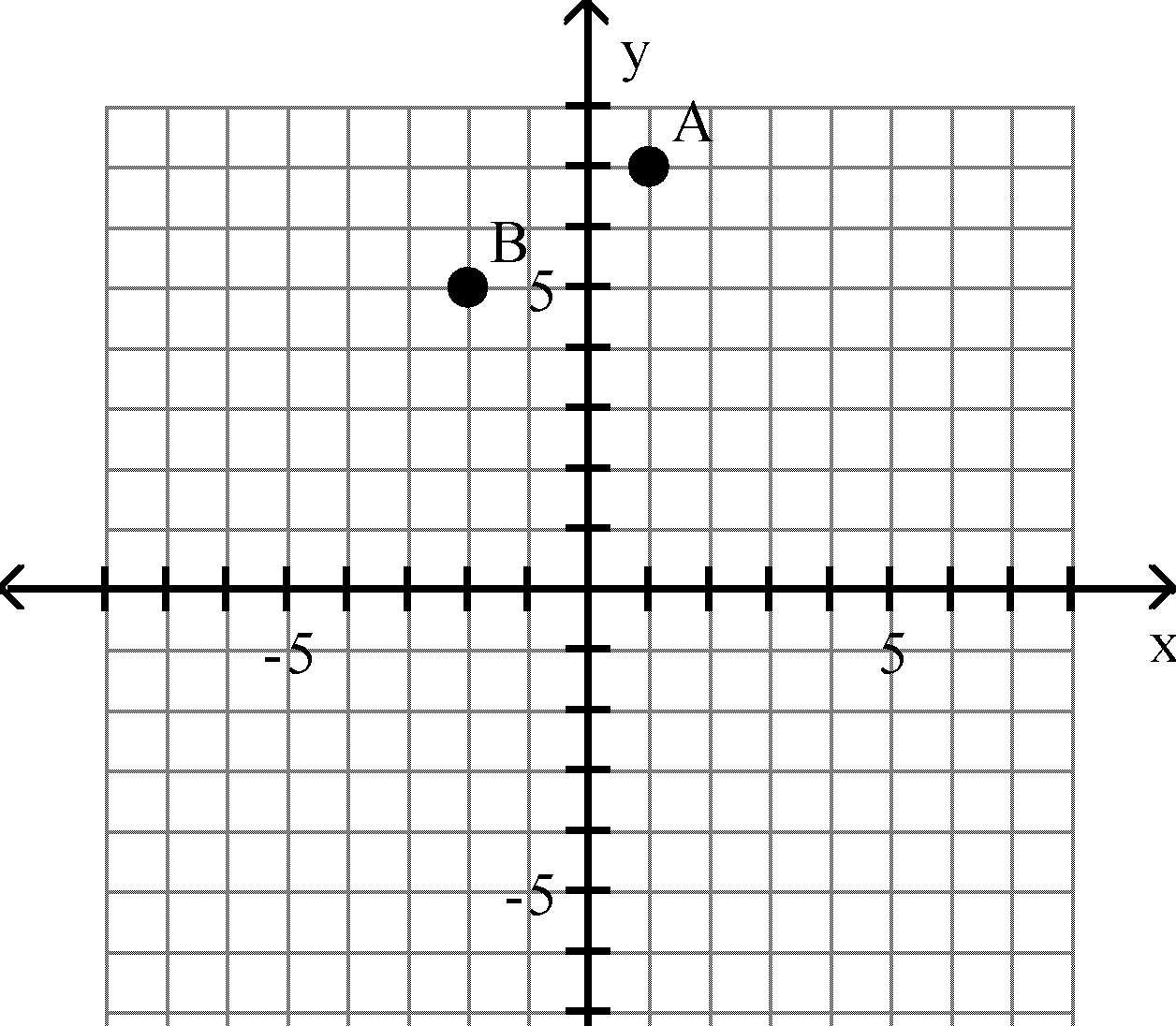

A) A = (1, 5), B = (7, 5)
C) A = (1, 7), B = (5, -2)
Answer: B
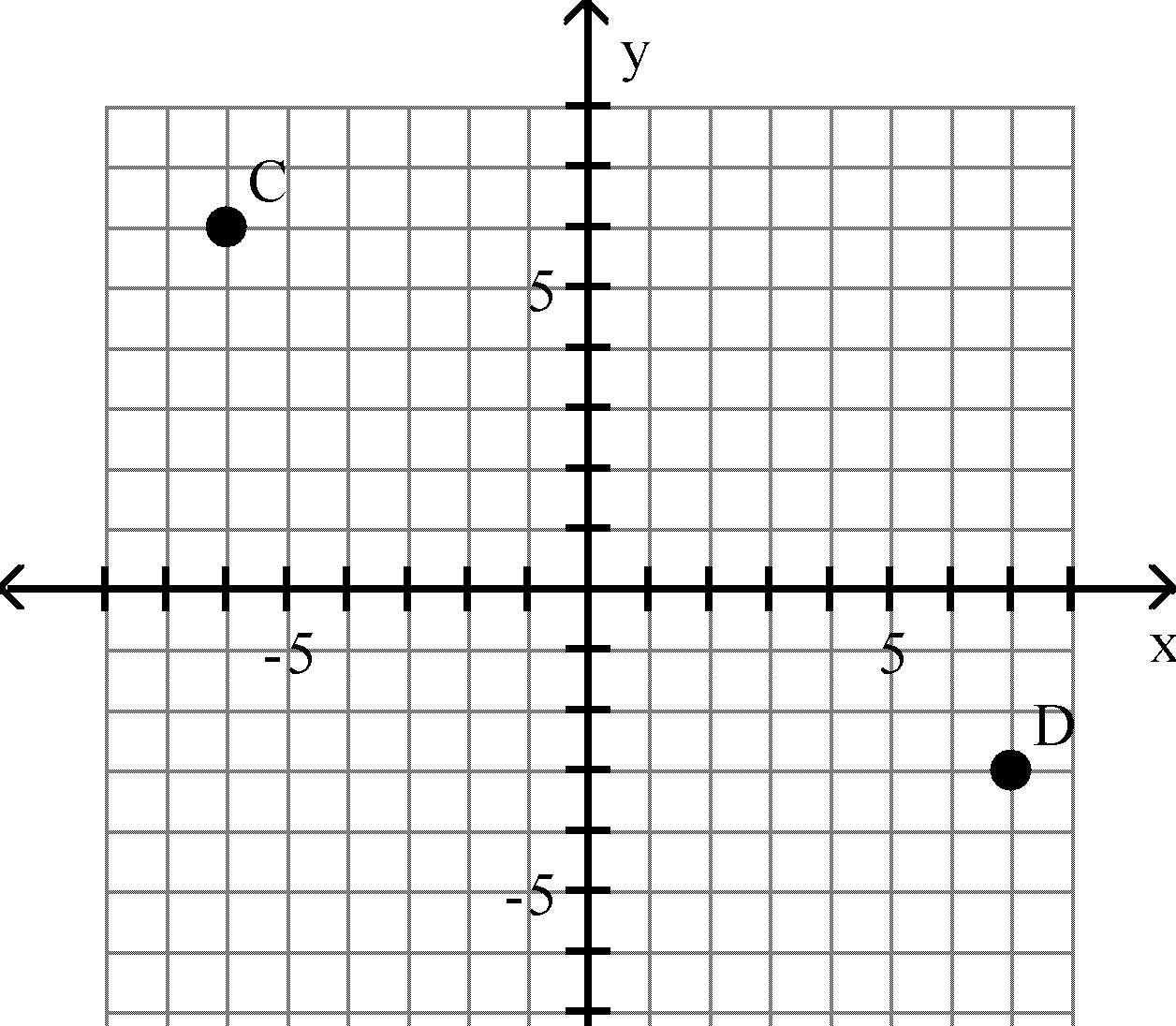

A) C = (6, -6), D = (-3, 7)
C) C = (-6, -3), D = (6, -3)
Answer: D
B) A = (1, 7), B = (-2, 5)
D) A = (7, 18), B = (5, -2)
B) C = (-6, 6), D = (-3, 7)
D) C = (-6, 6), D = (7, -3)
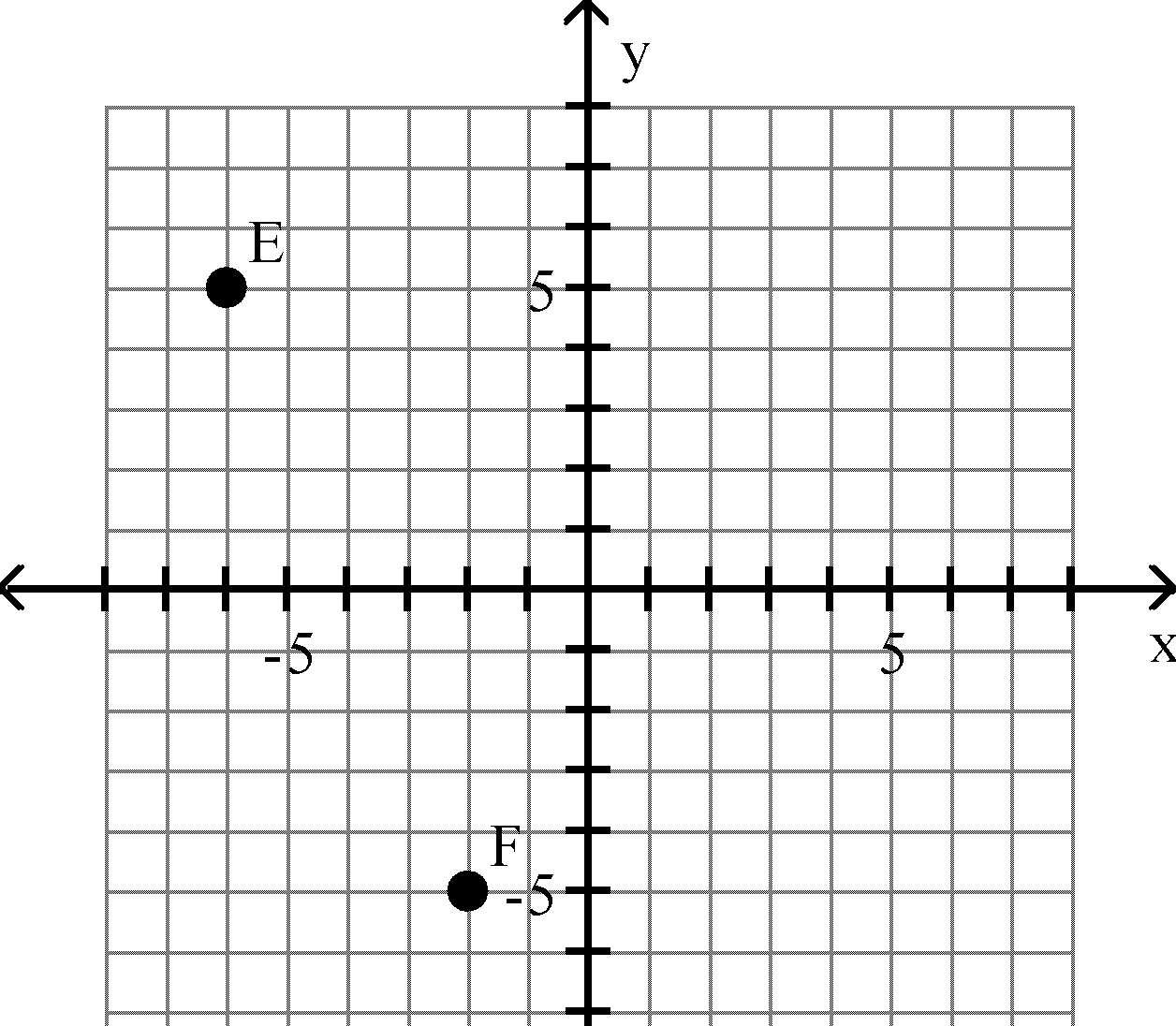

A) E = (5, -6), F = (-5, -2)
C) E = (-6, 5), F = (-2, -5)
Answer: C


A) G = (3, 2), H = (-3, -4)
C) G = (2, 3), H = (-3, -4)
Answer: D
B) E = (-2, -5) , F = (-6, 5)
D) E = (-6, -5), F = (5, -5)
B) G = (3, -3), H = (2, -3)
D) G = (3, 2), H = (-4, -3)
Plot the point in the xy-plane. Tell in which quadrant or on what axis the point lies. 13) (4, 6)
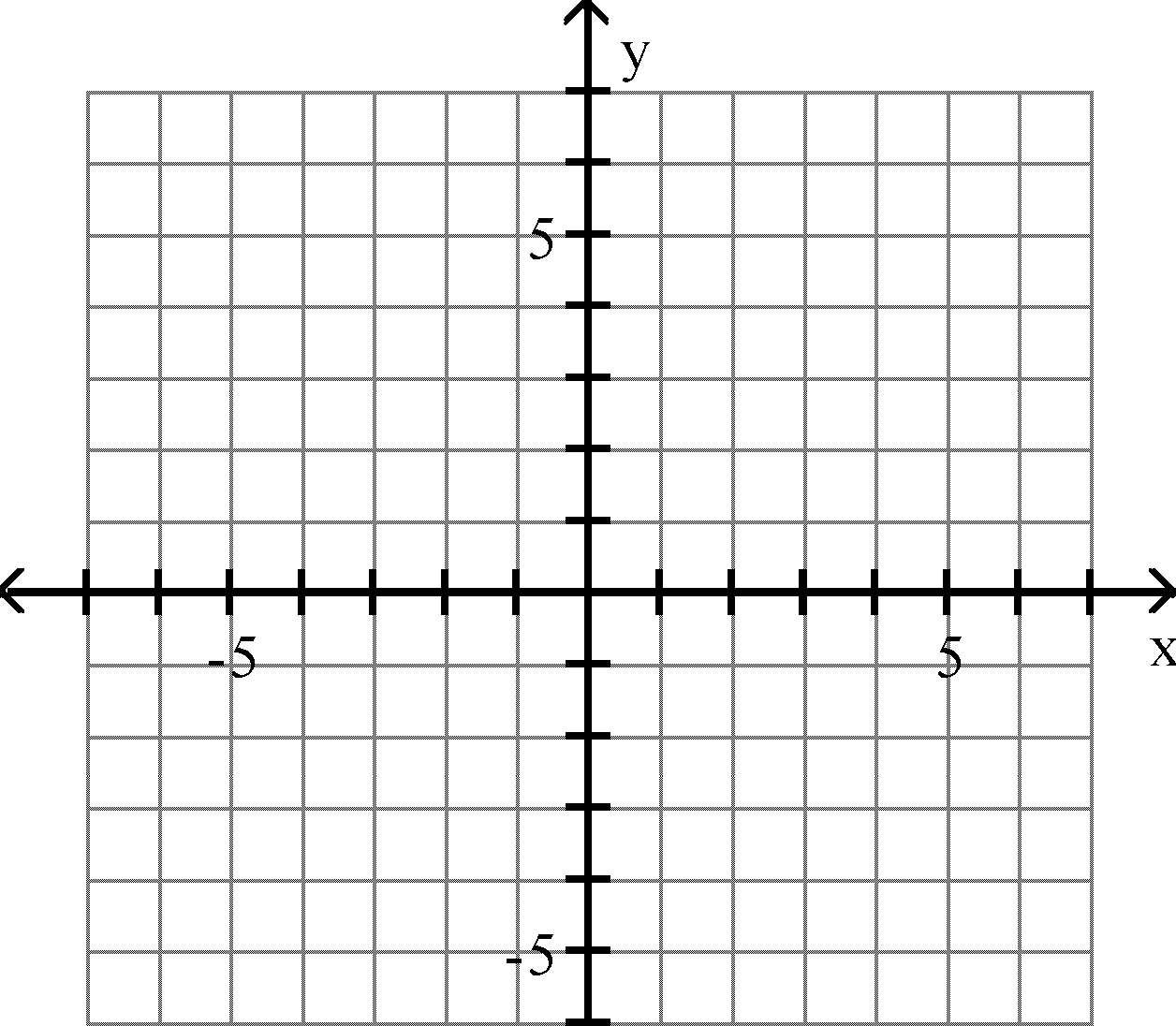

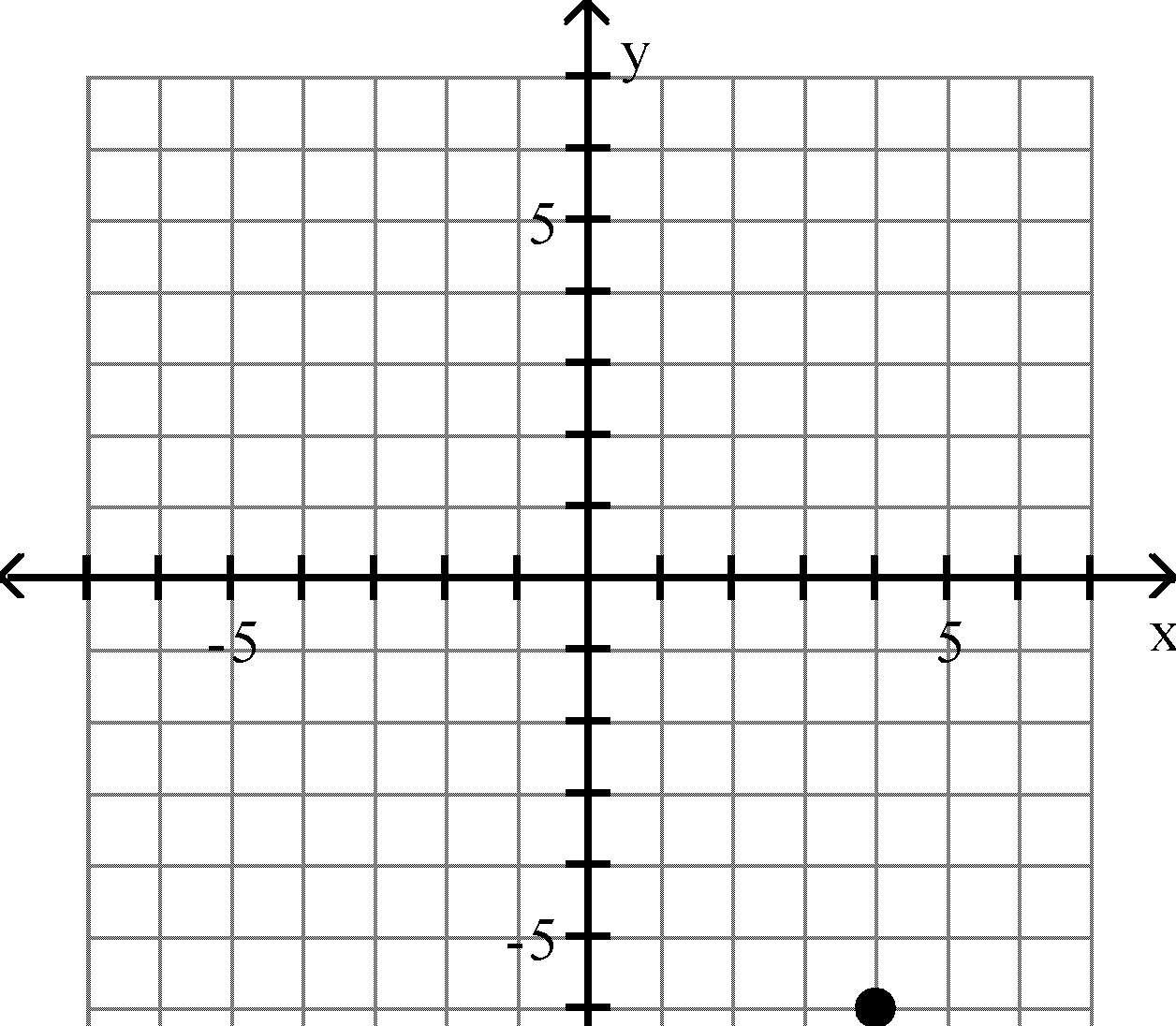
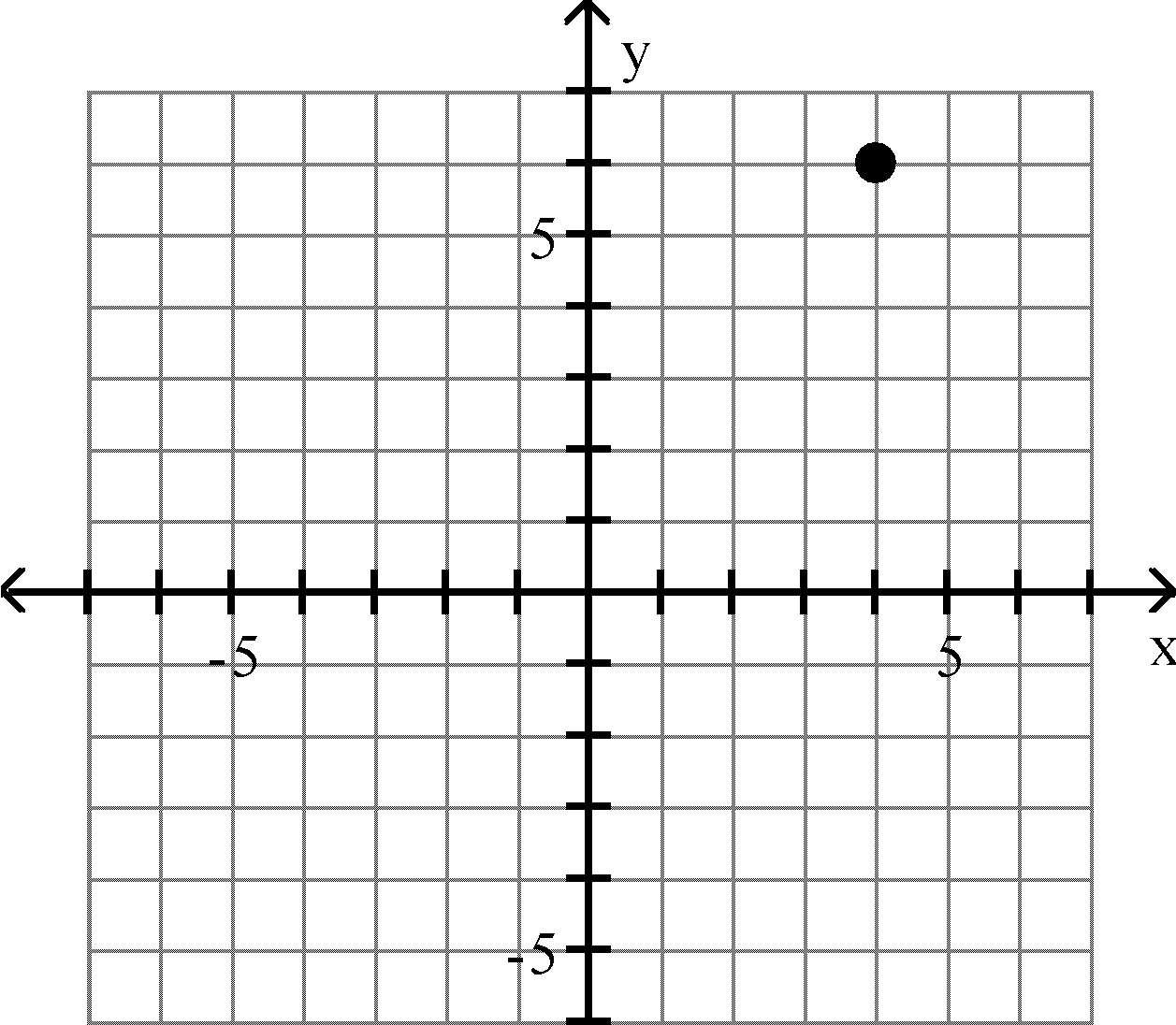

Answer: C 14) (-4, 5)

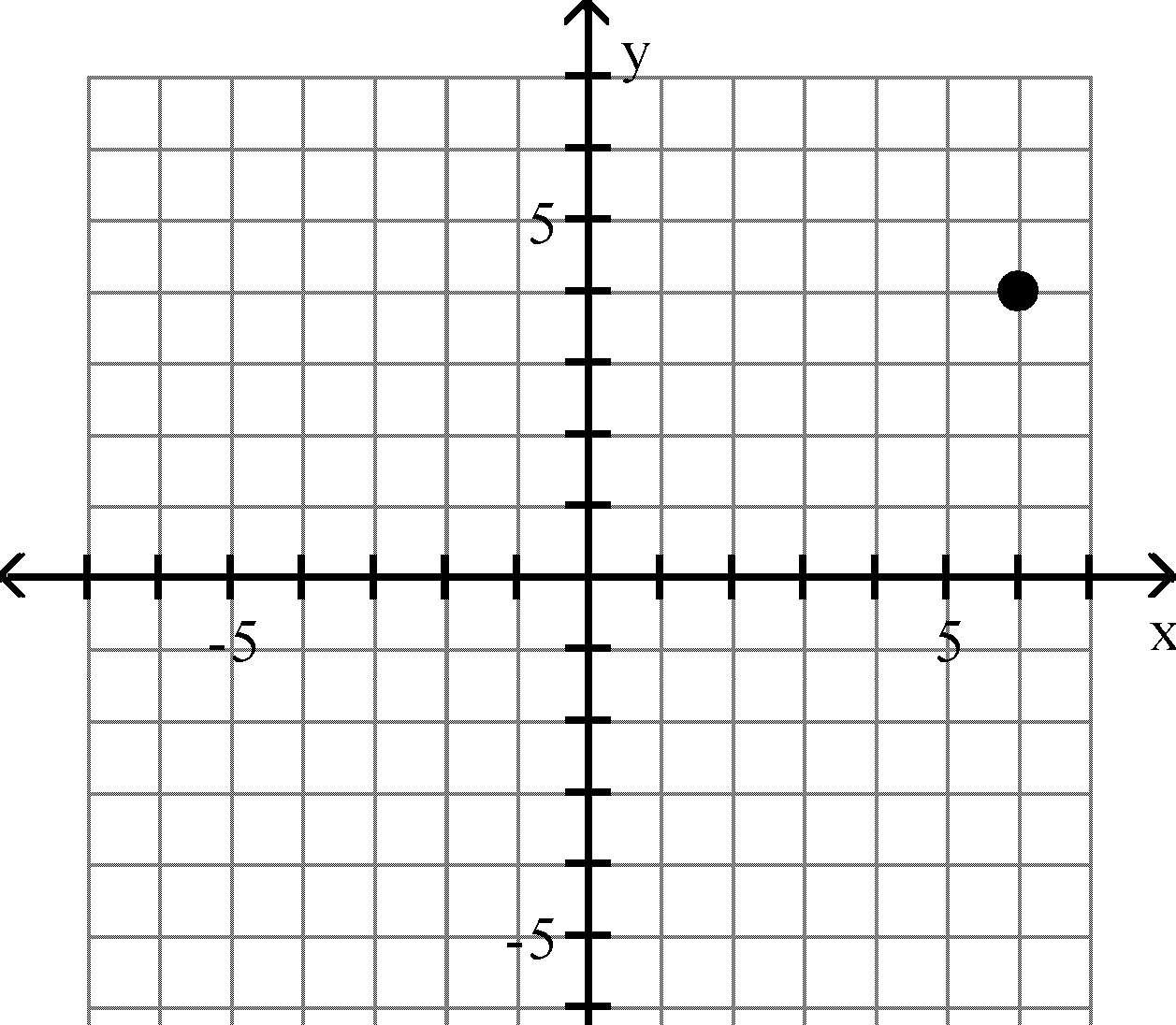
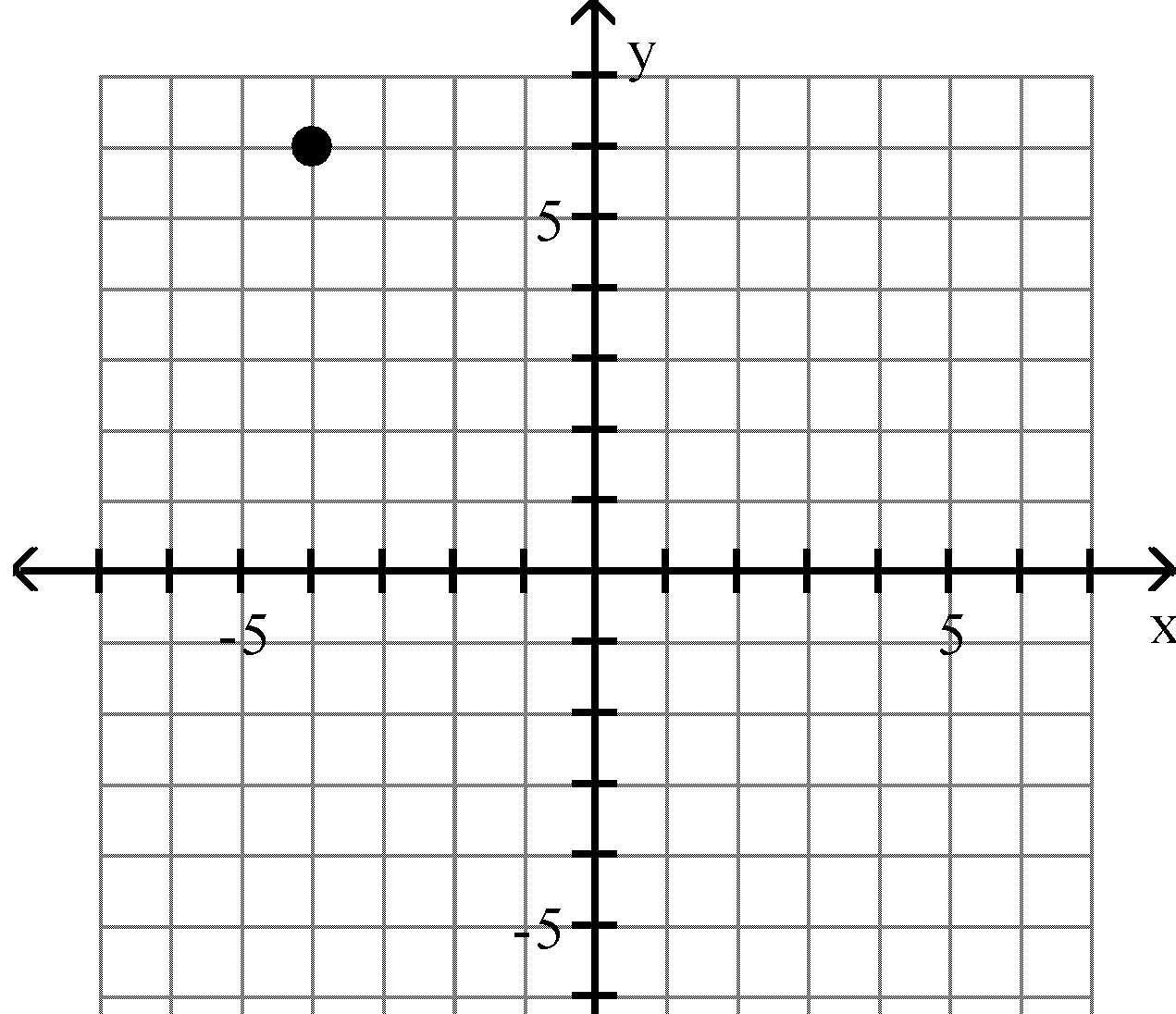

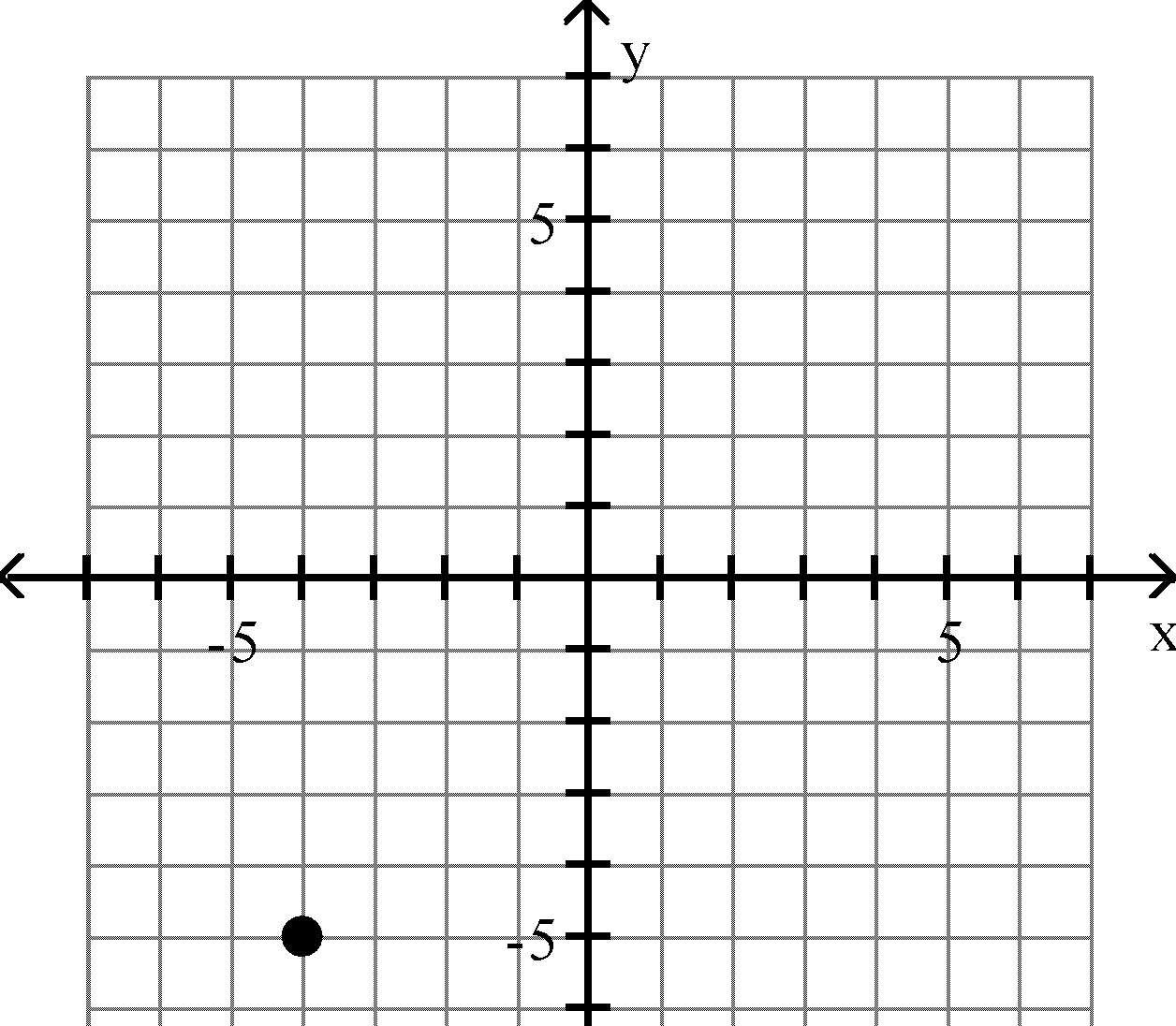
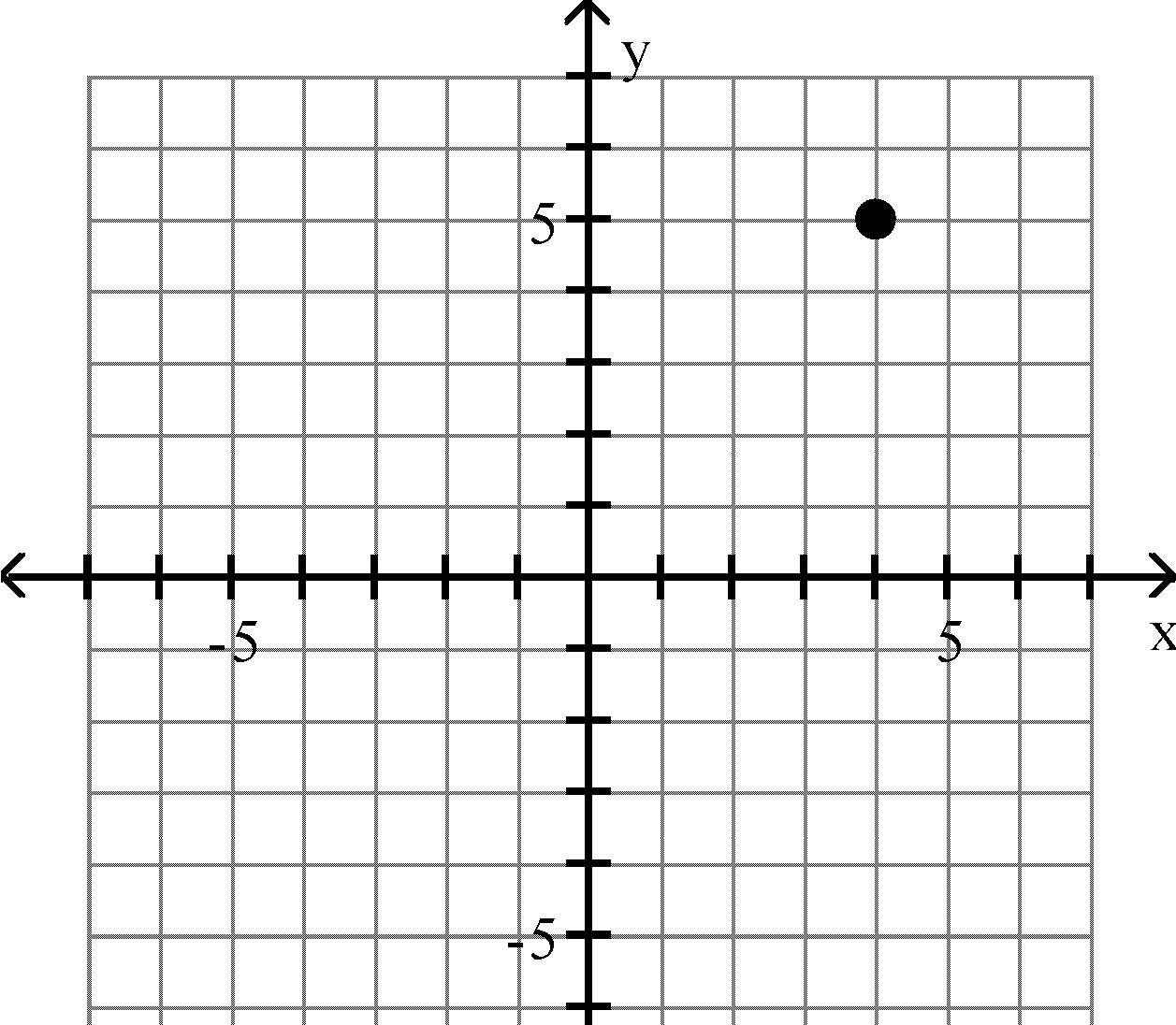

Answer: D
15) (4, -6)
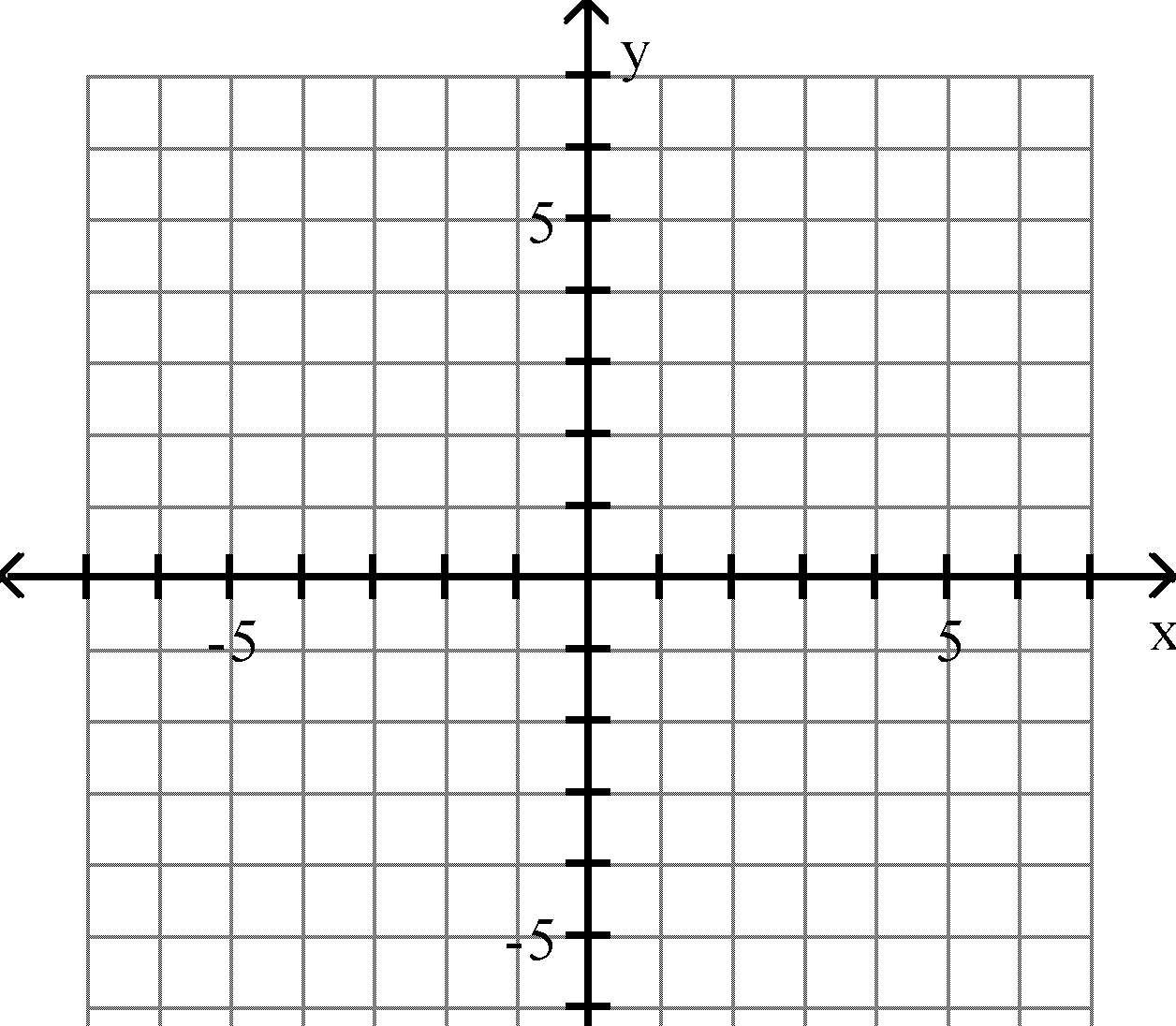
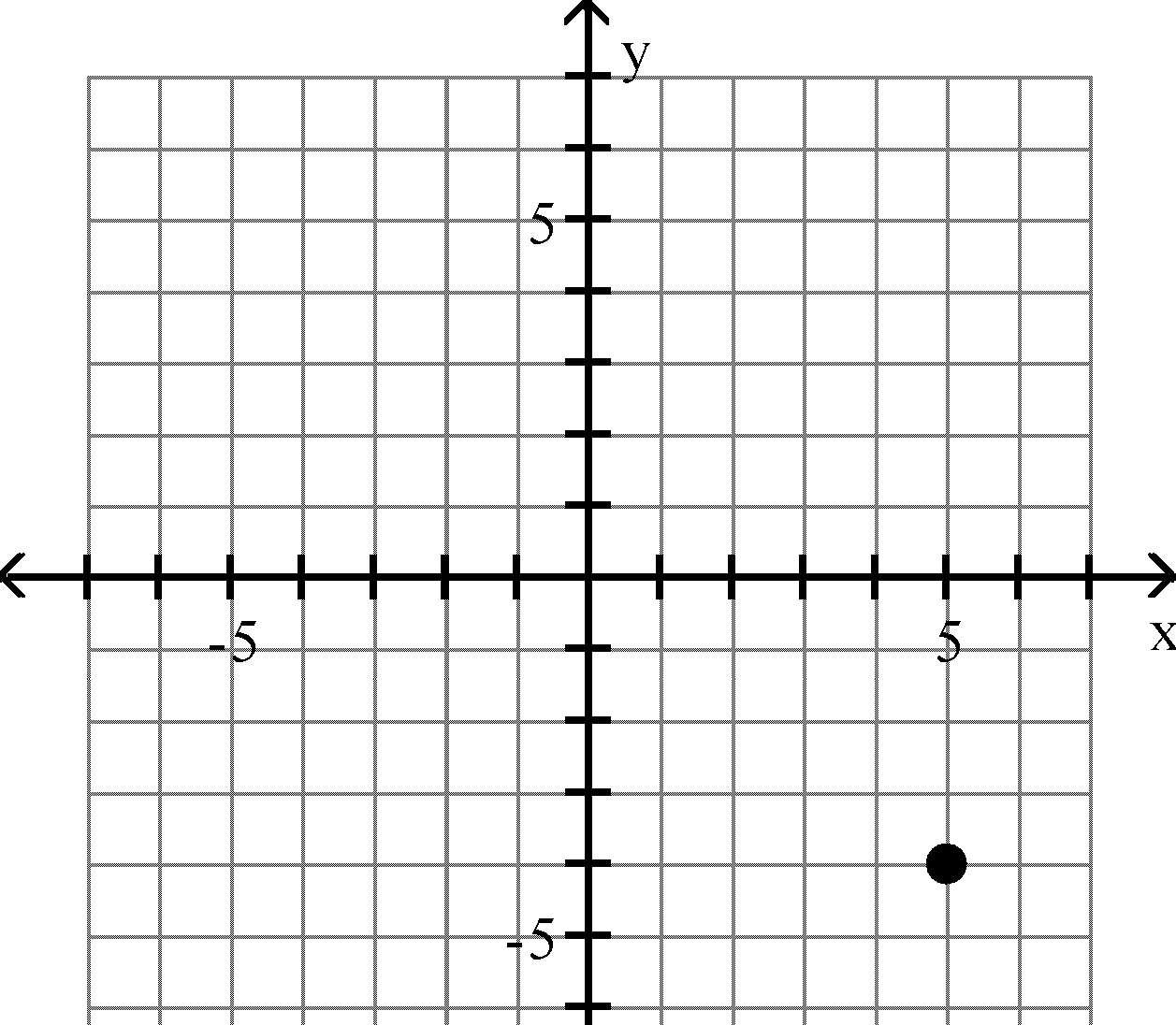
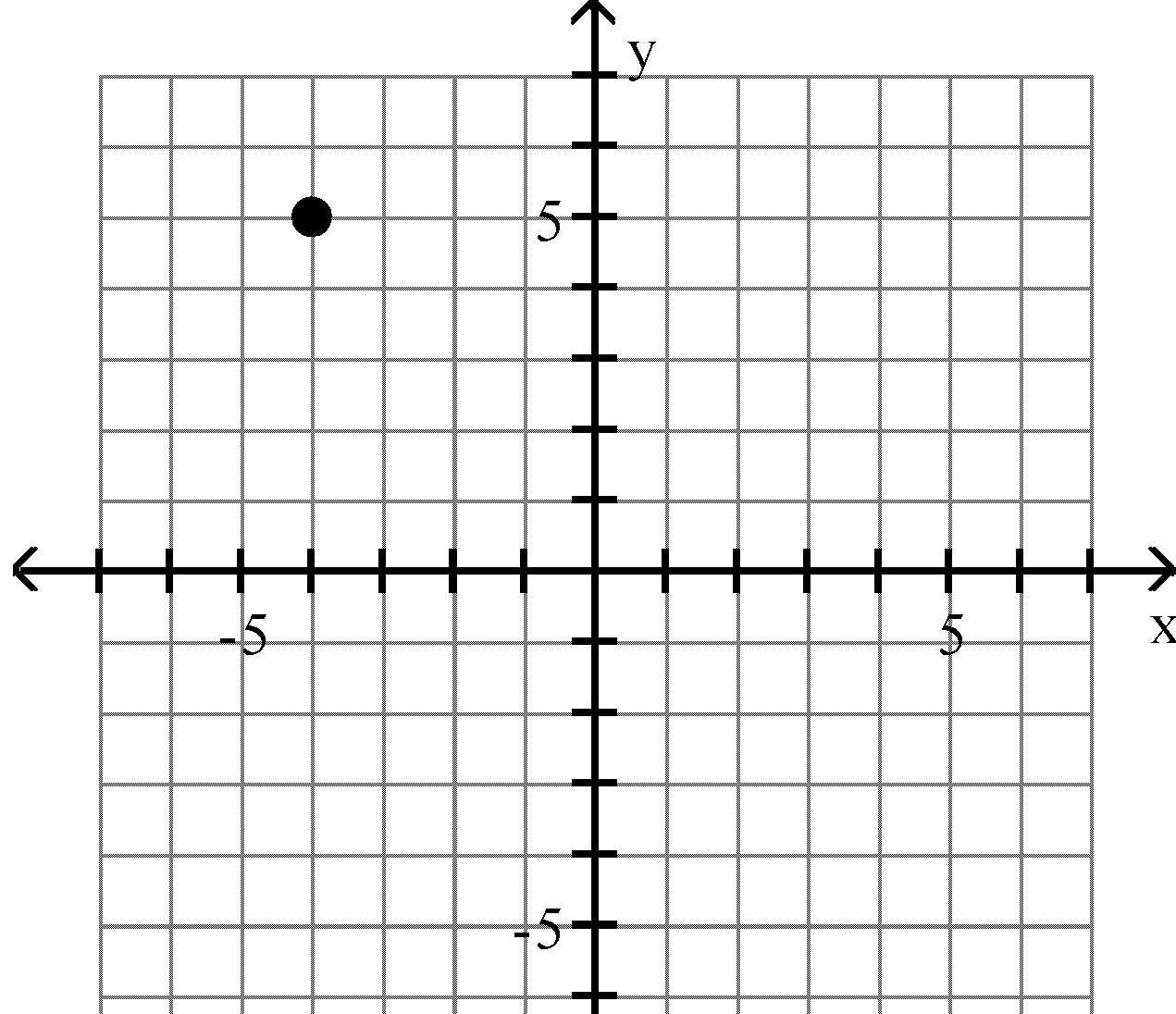

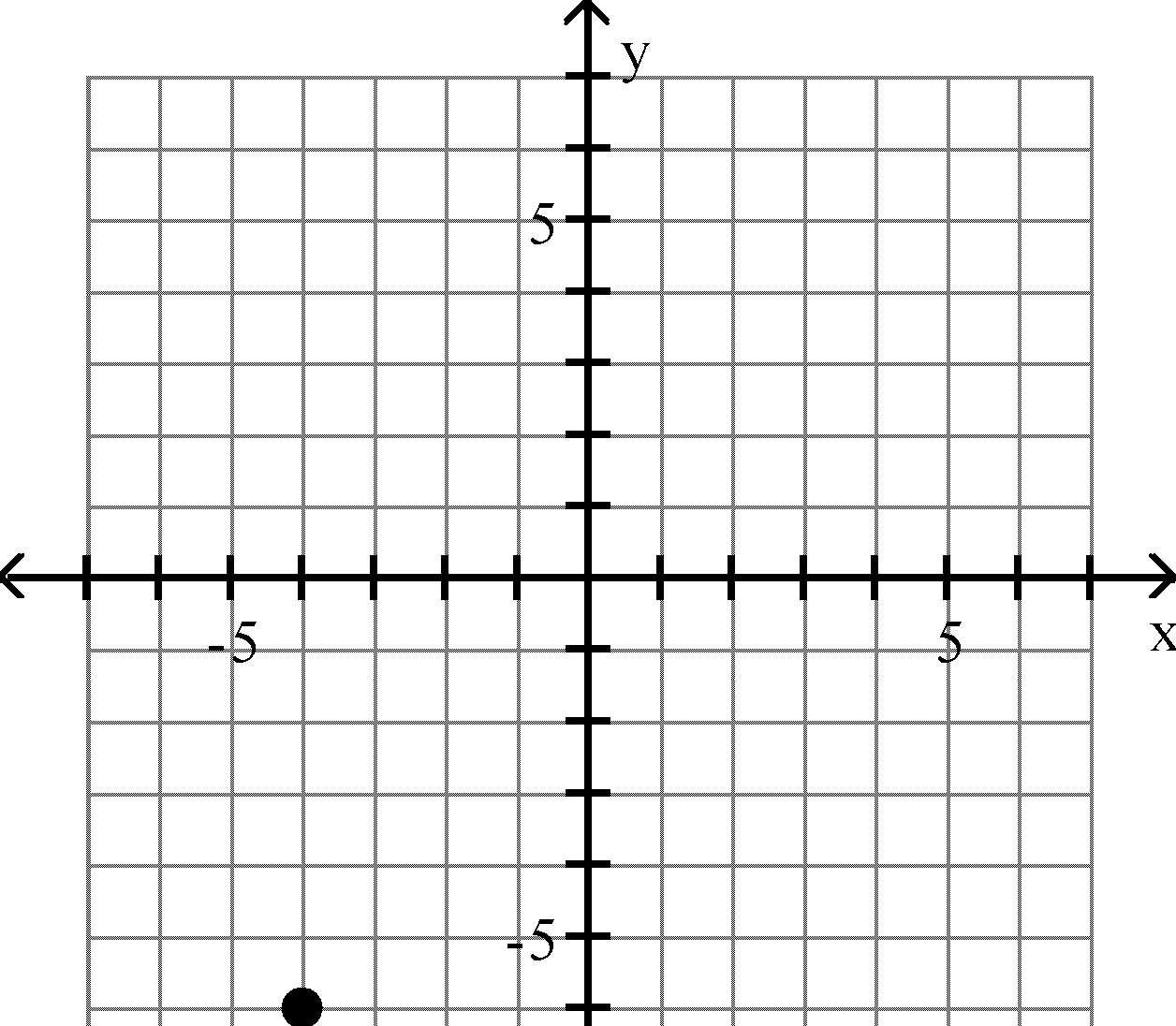
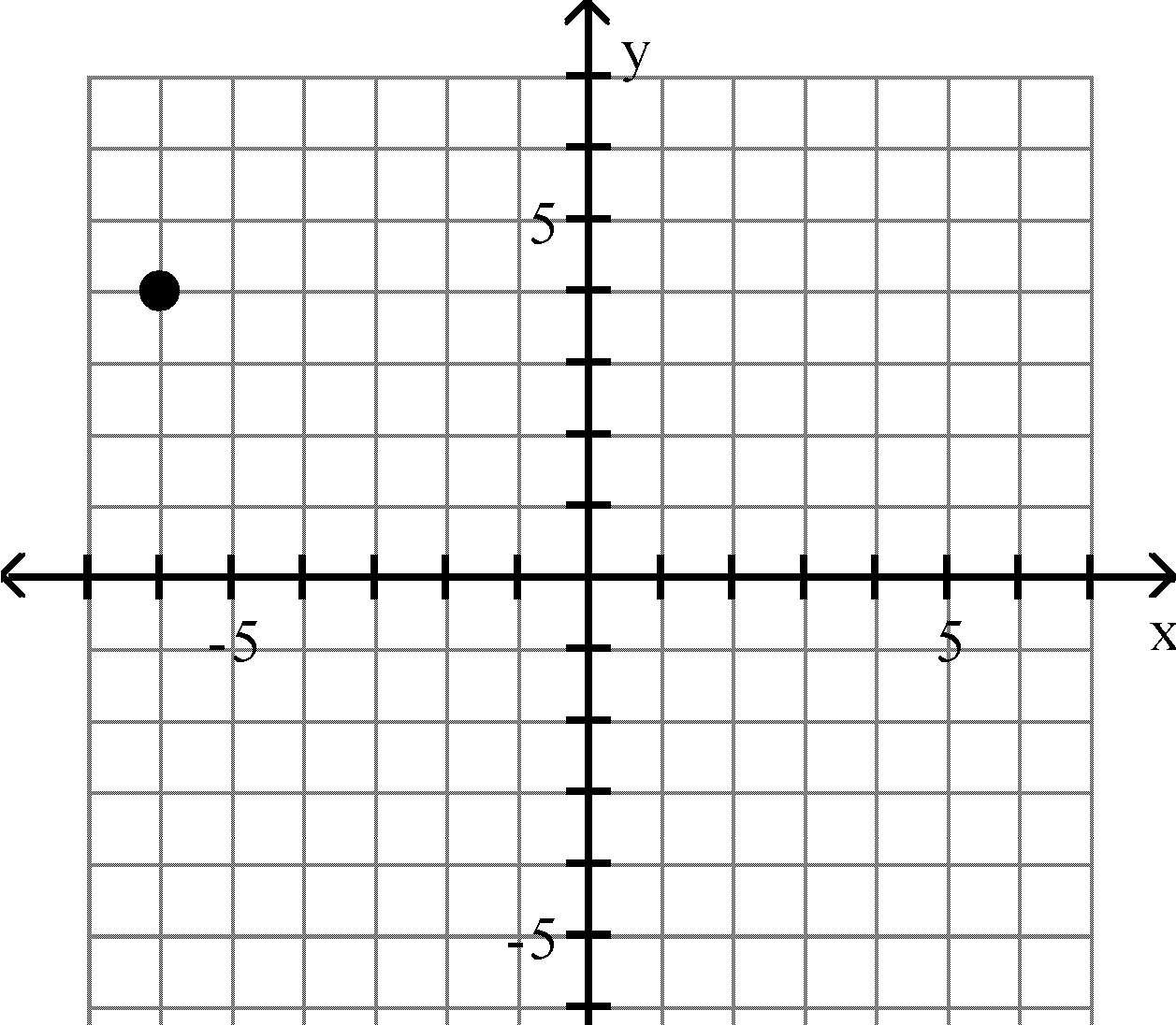

Answer: B
16) (-1, -2)

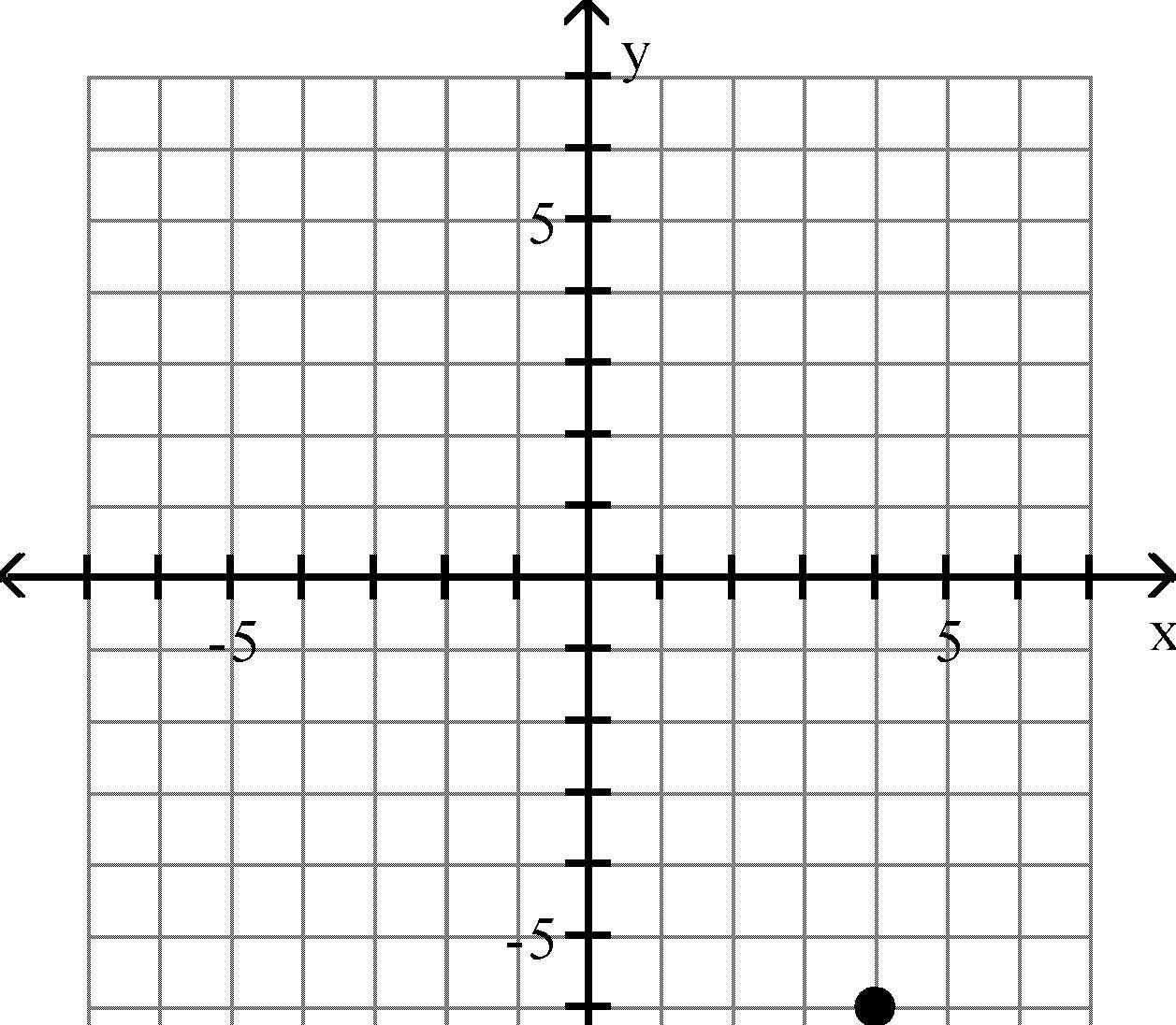
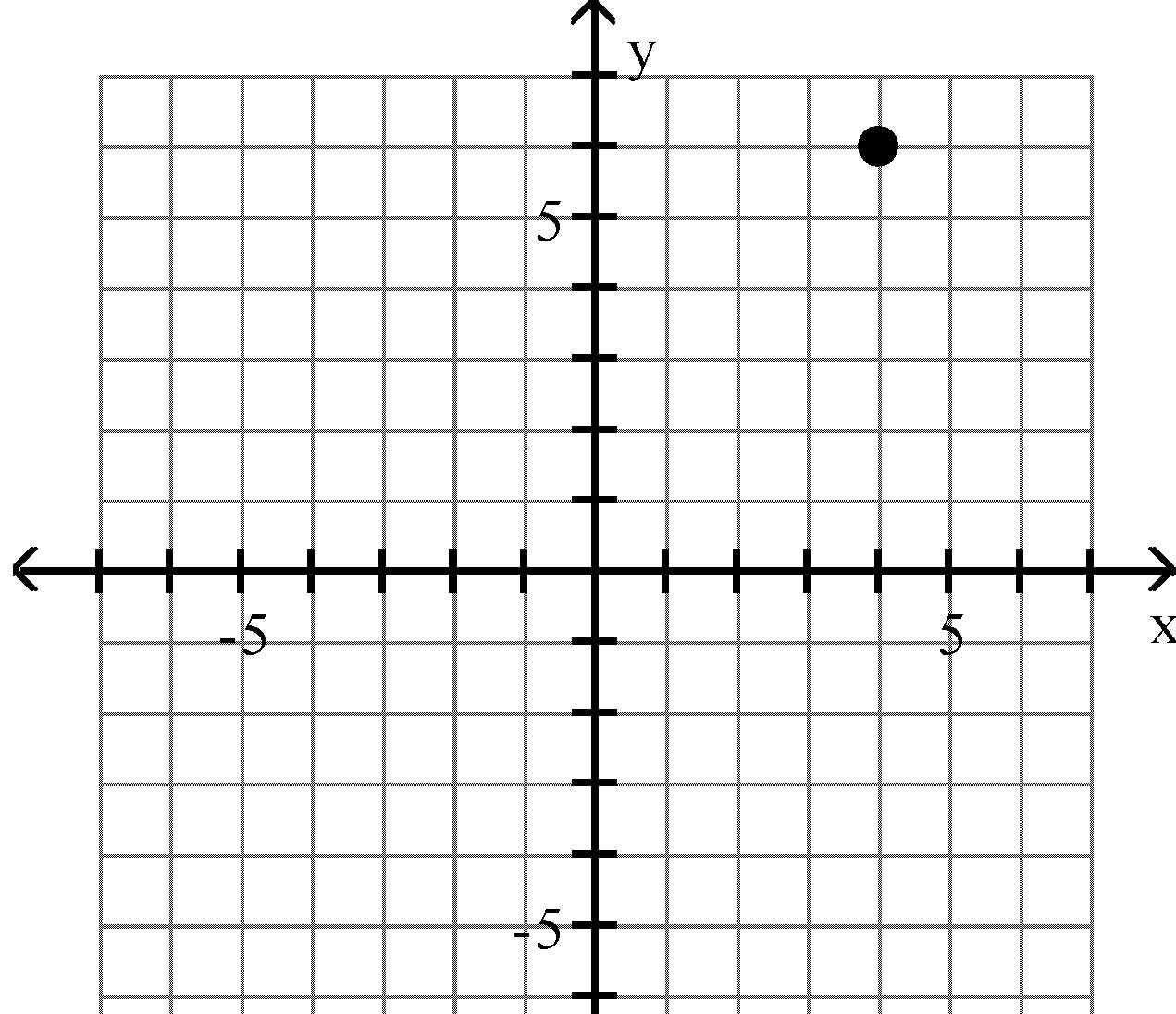

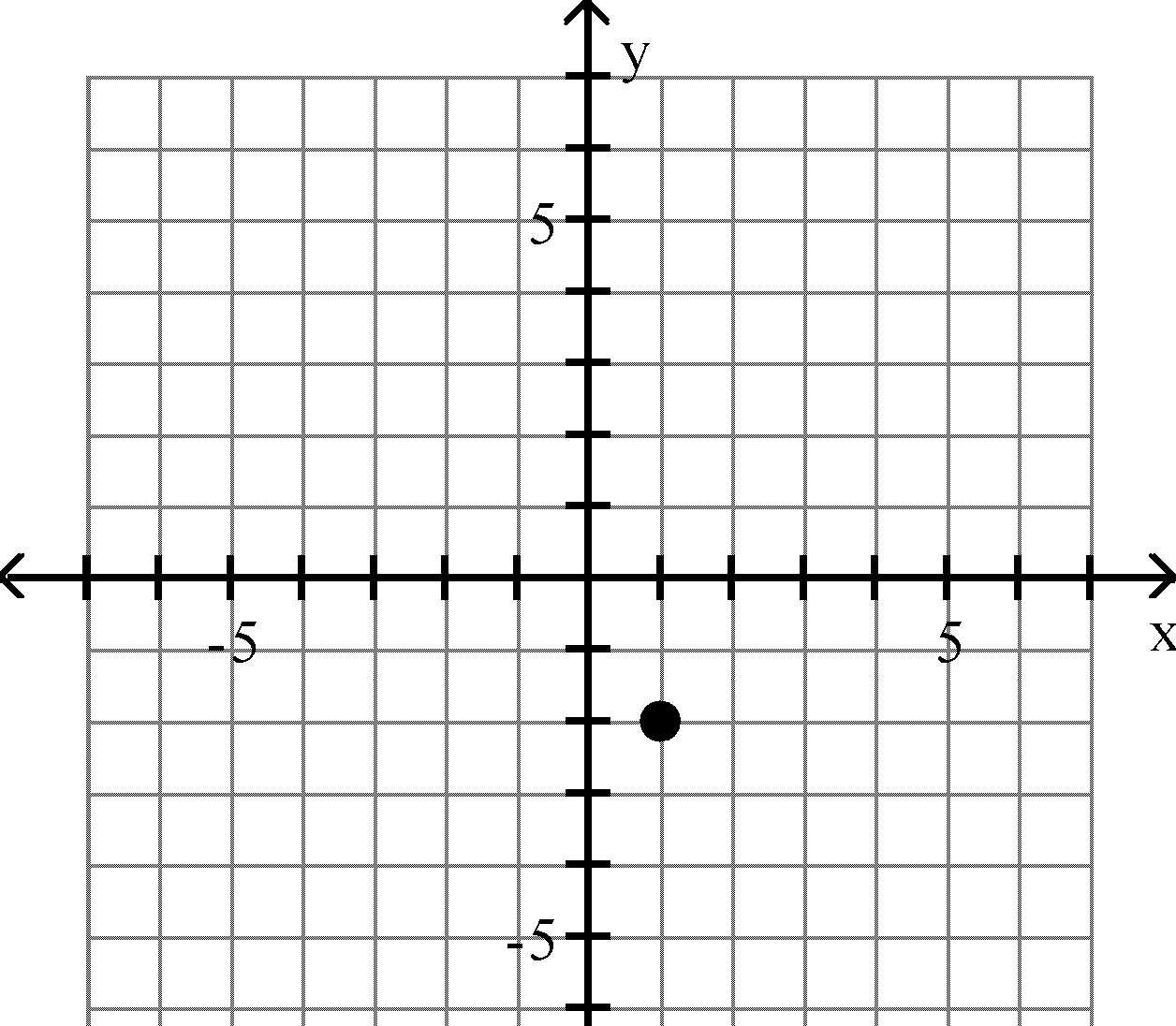
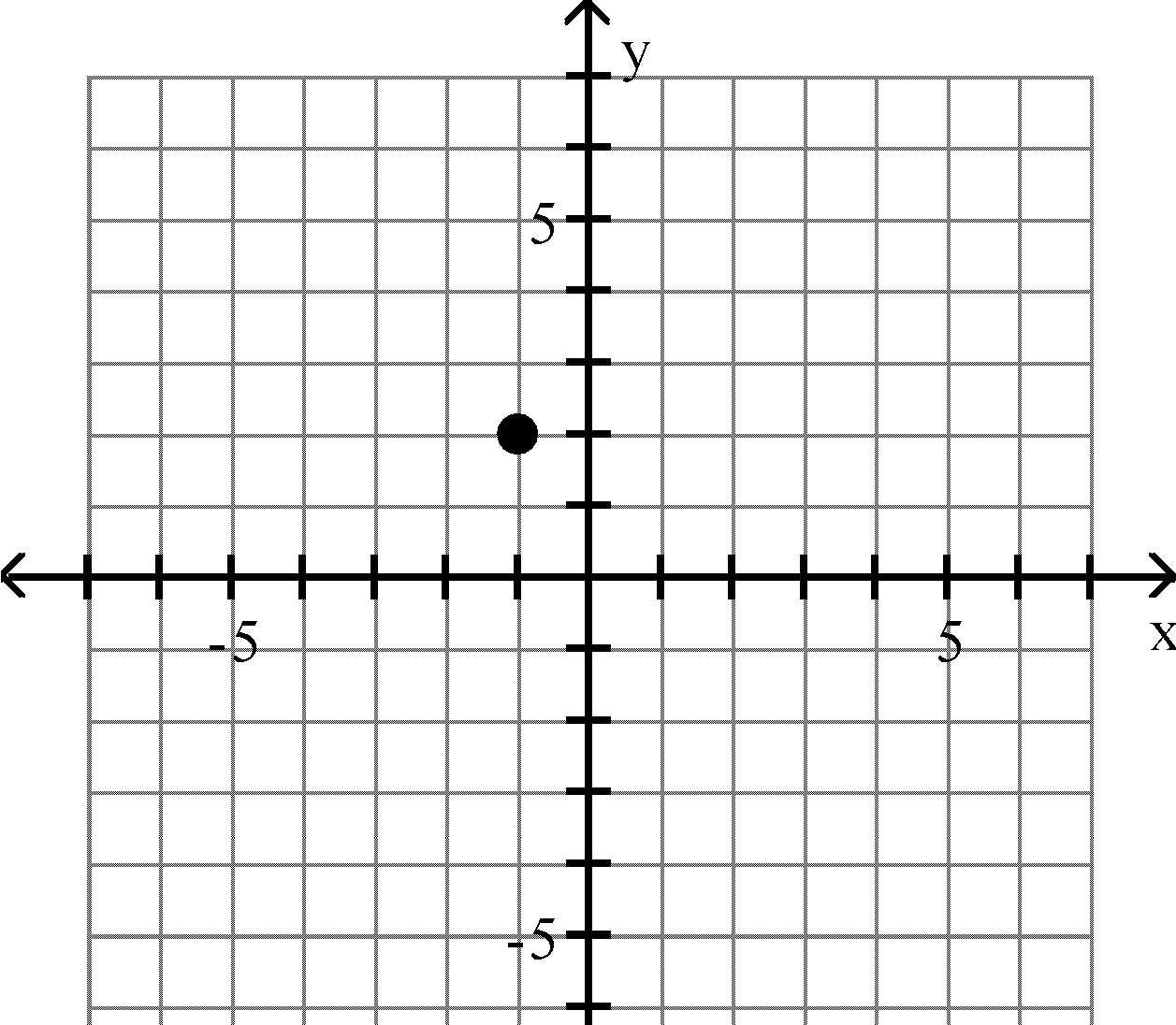

Answer: B

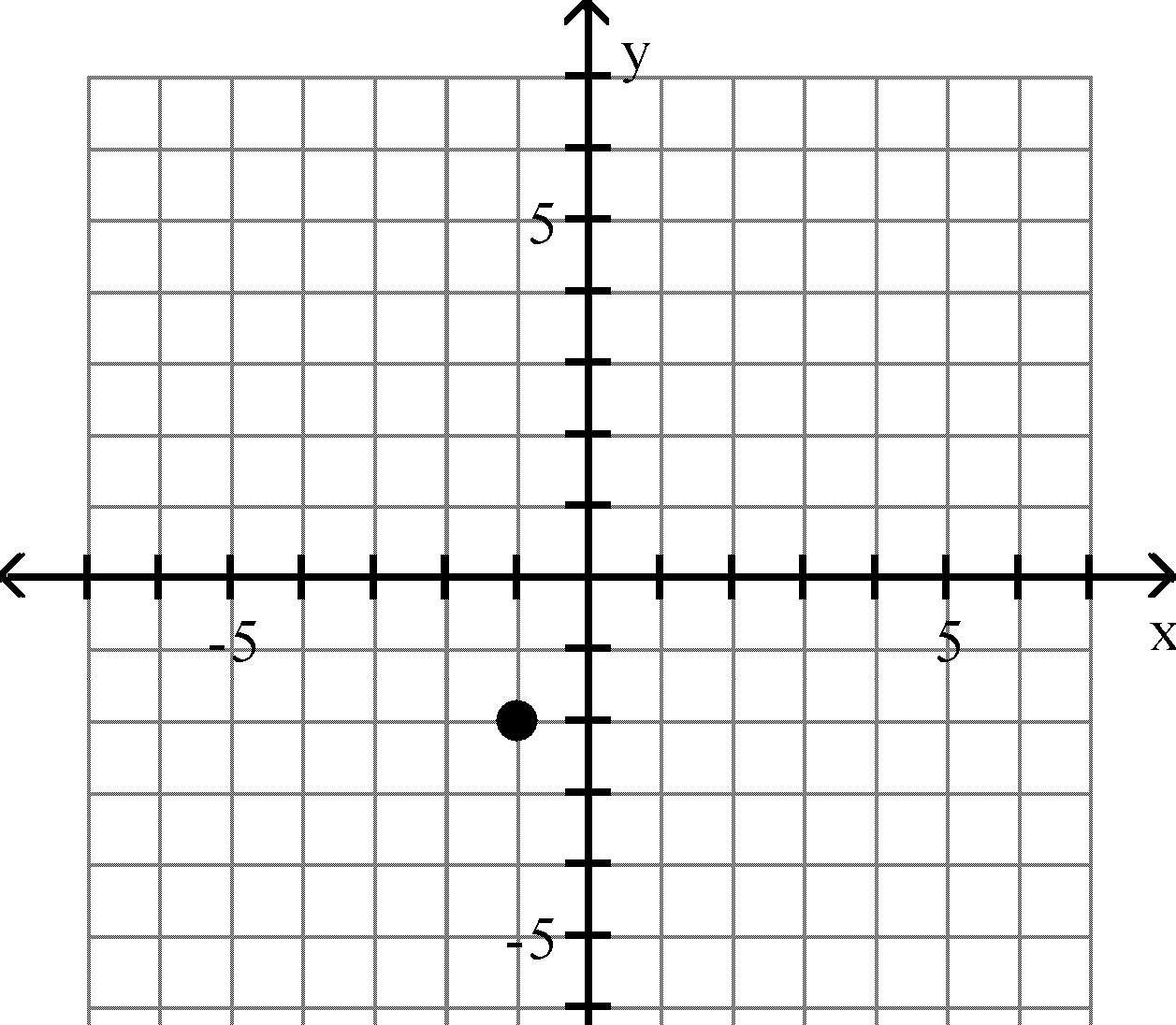
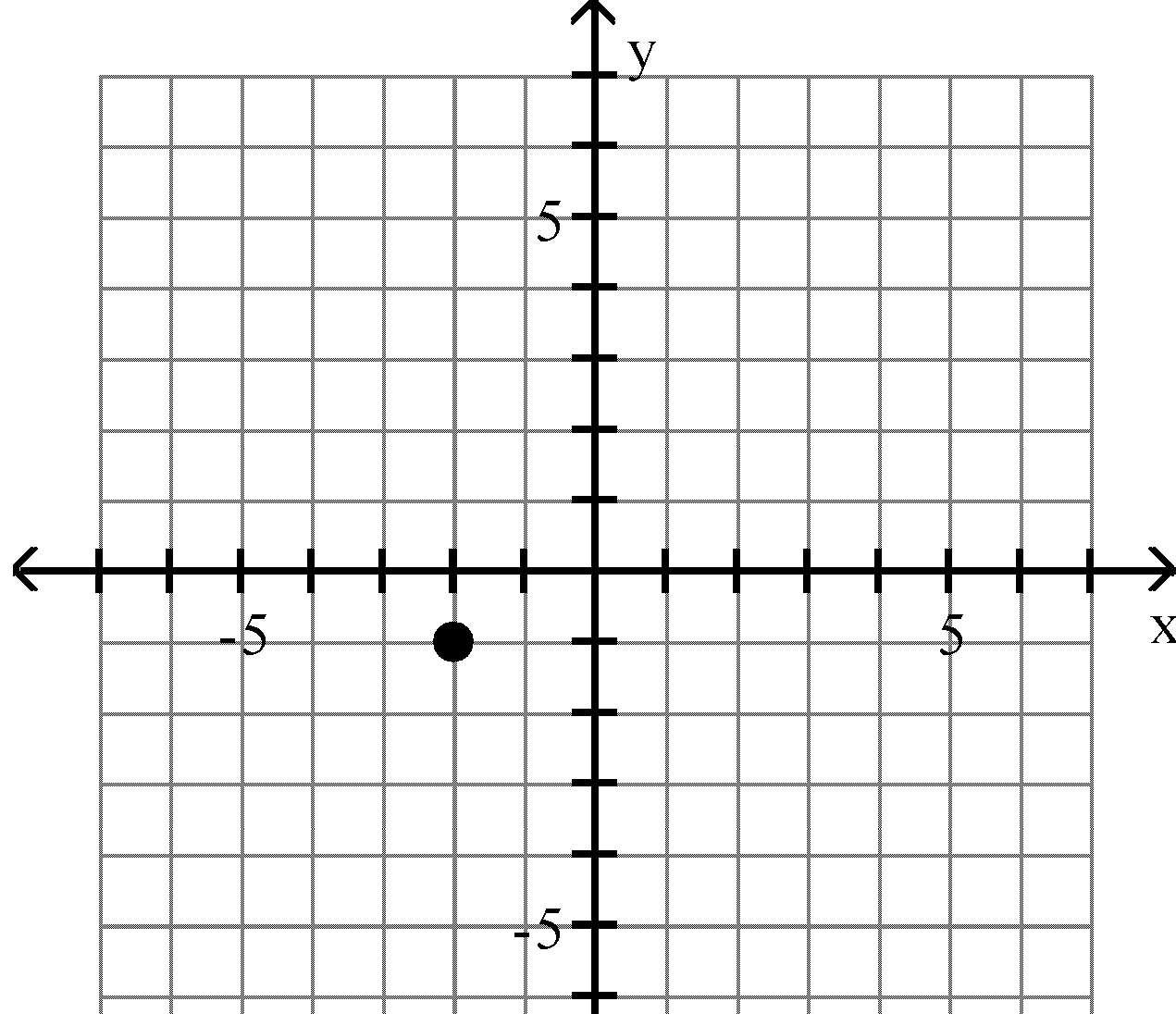

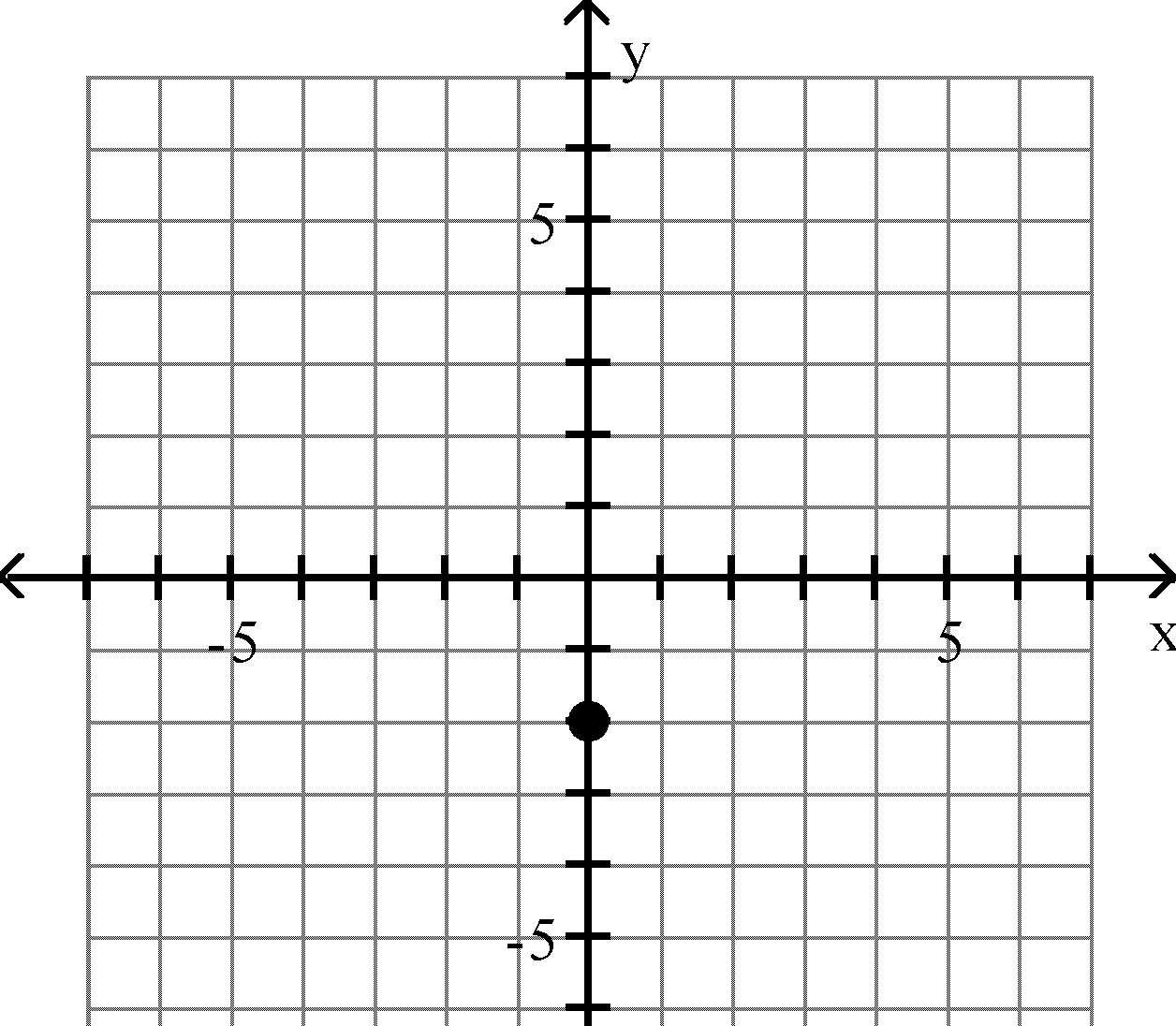
y-axis
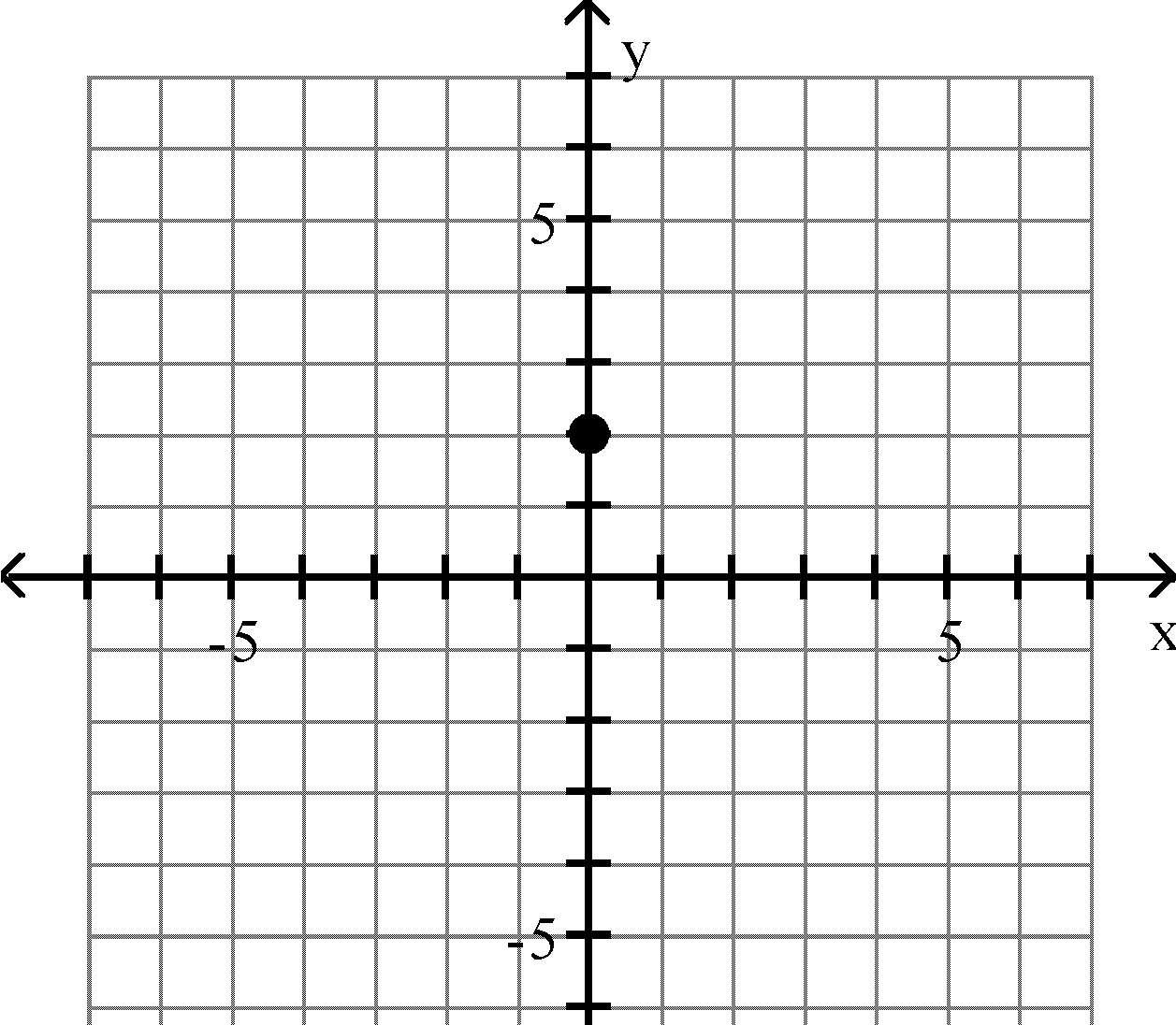

Answer: C

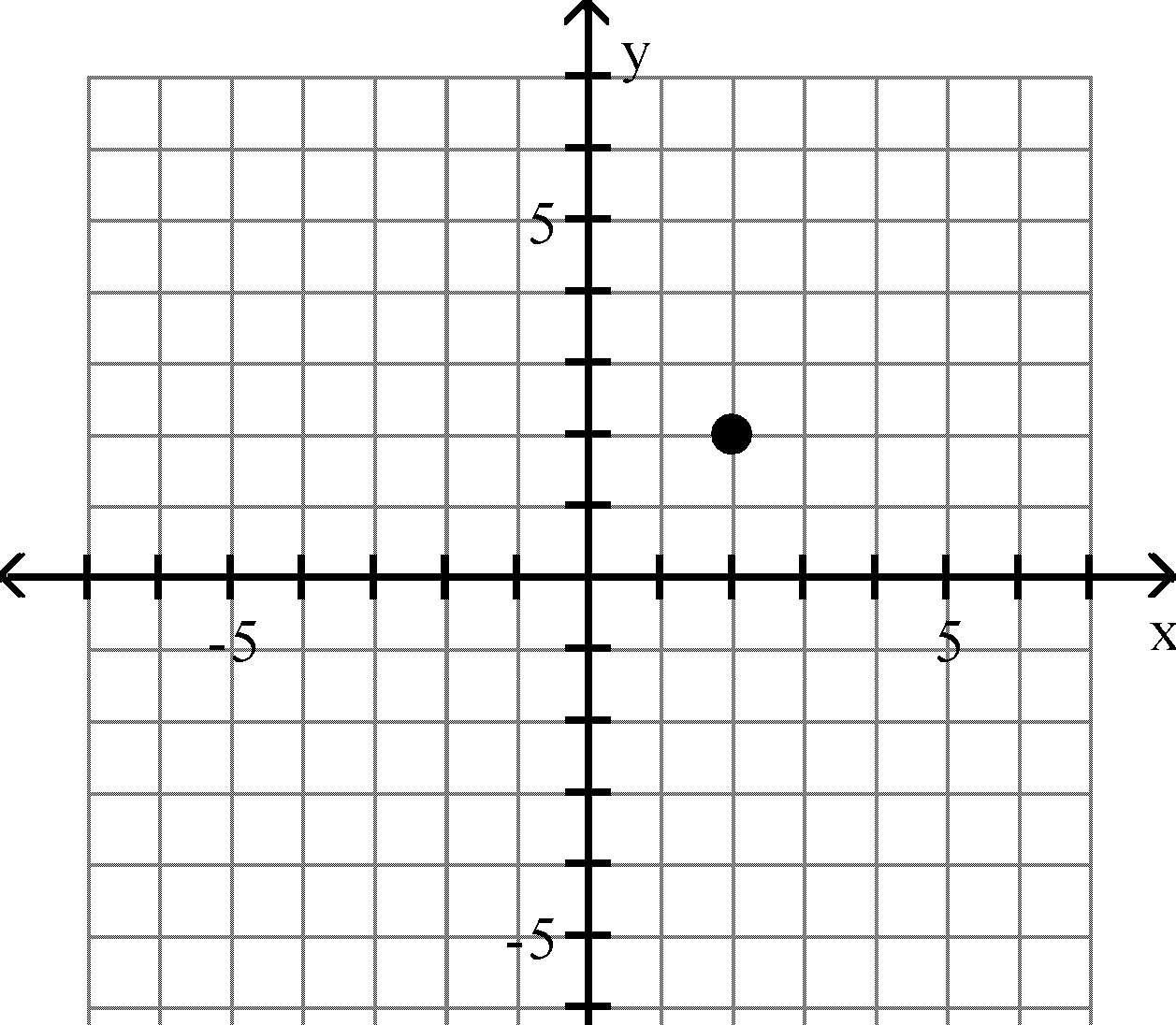
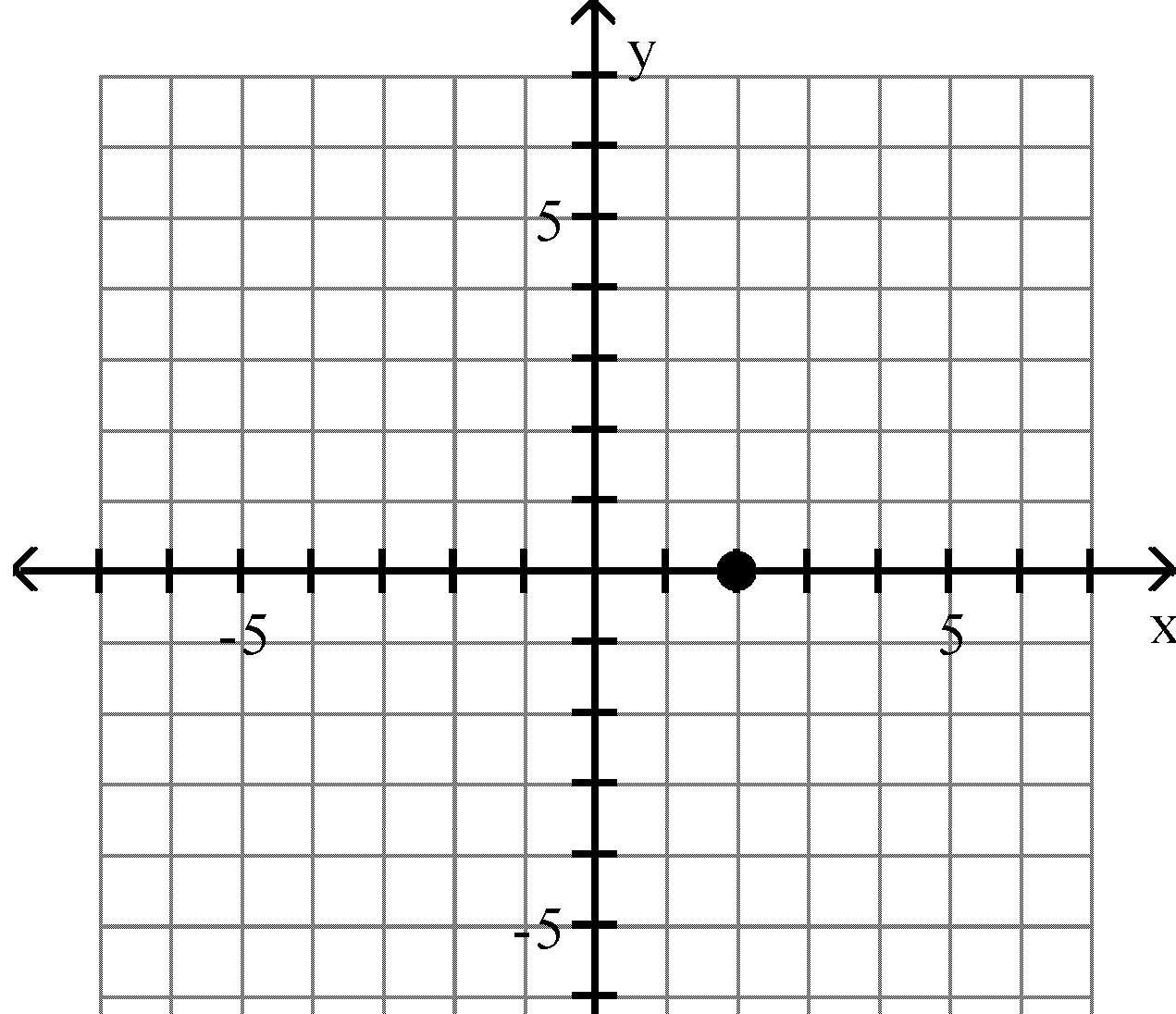

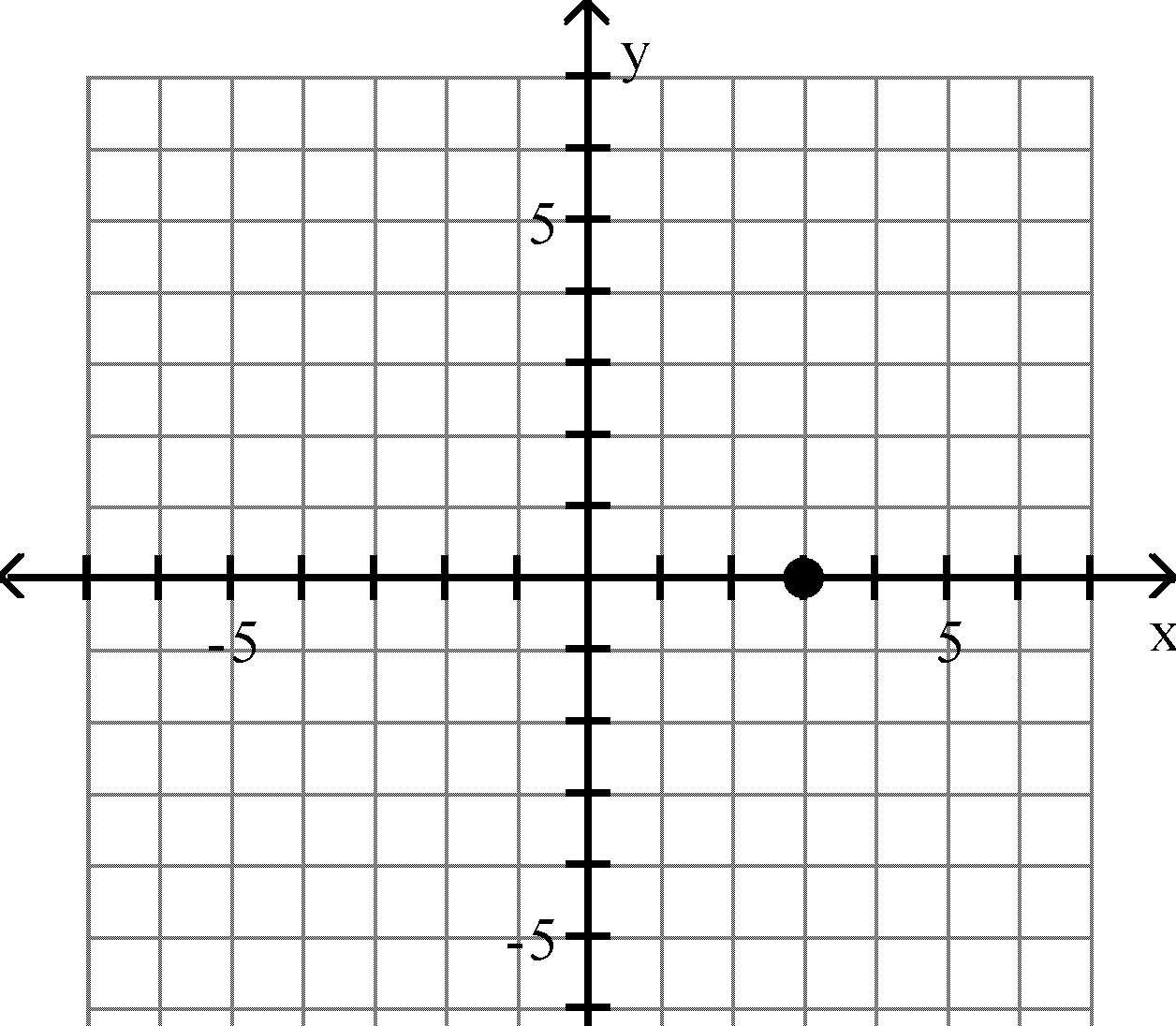
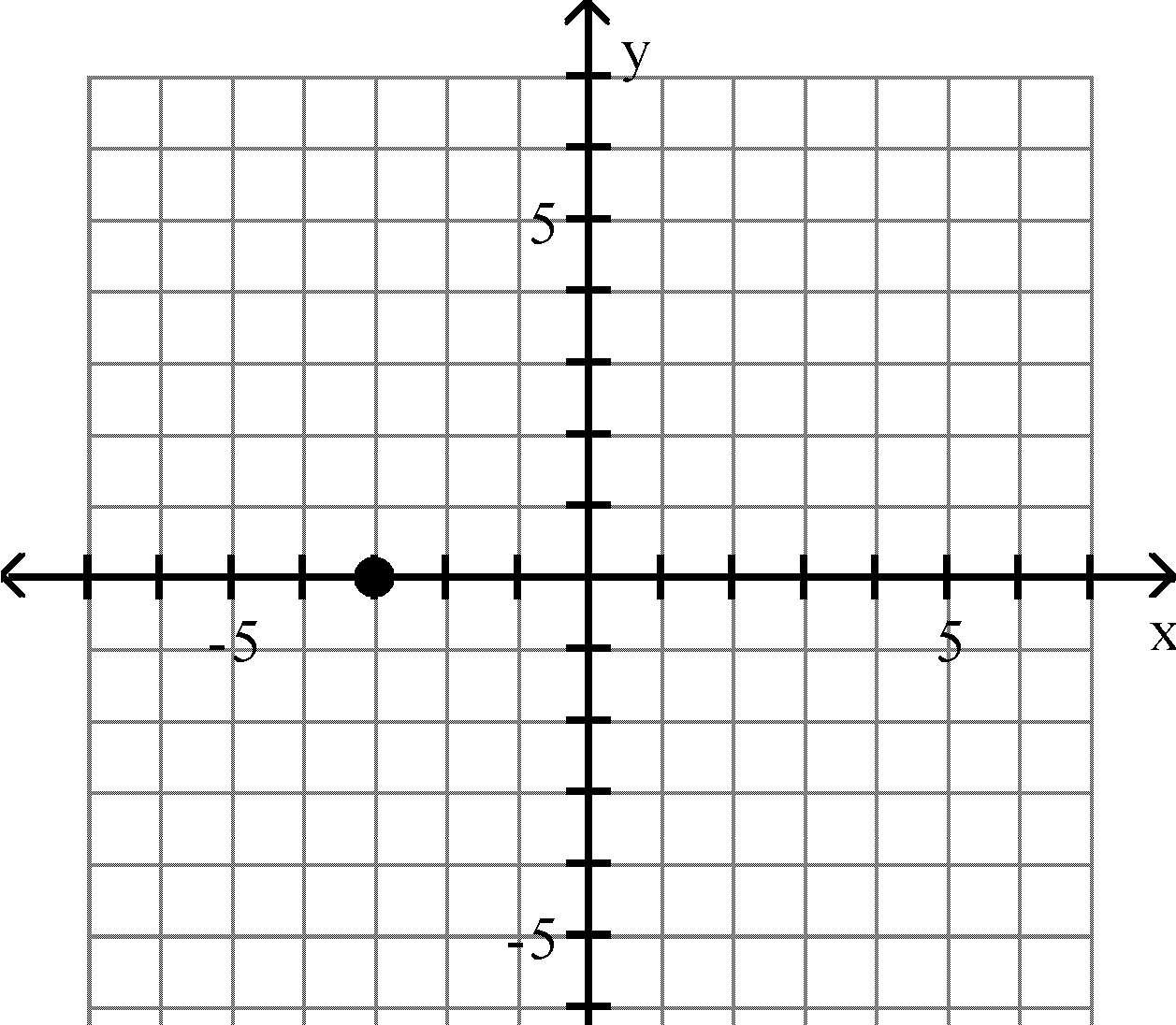

Answer: A
Find the distance d(P1, P2) between the points P1 and P2. 19)
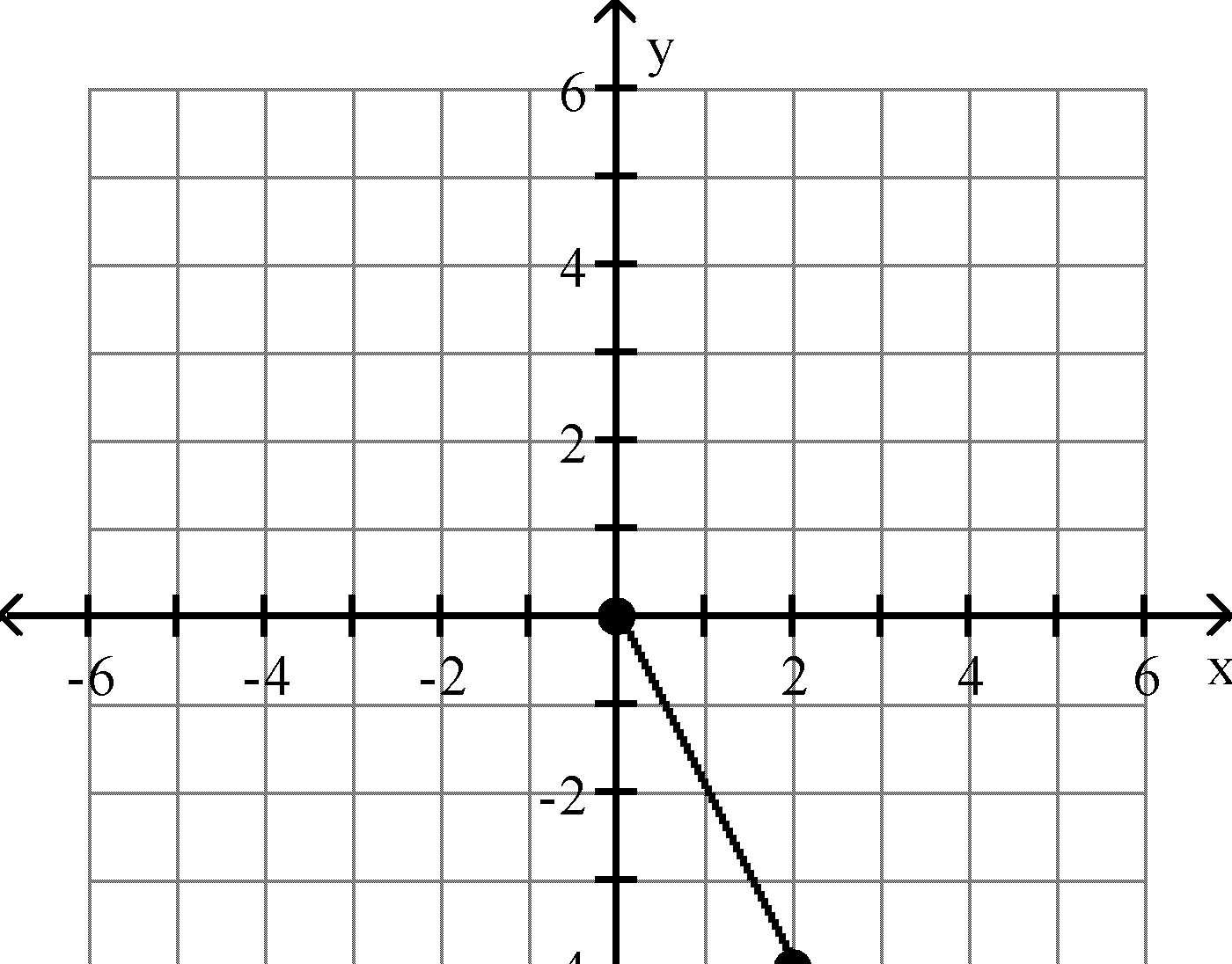

A) 25 B) 7

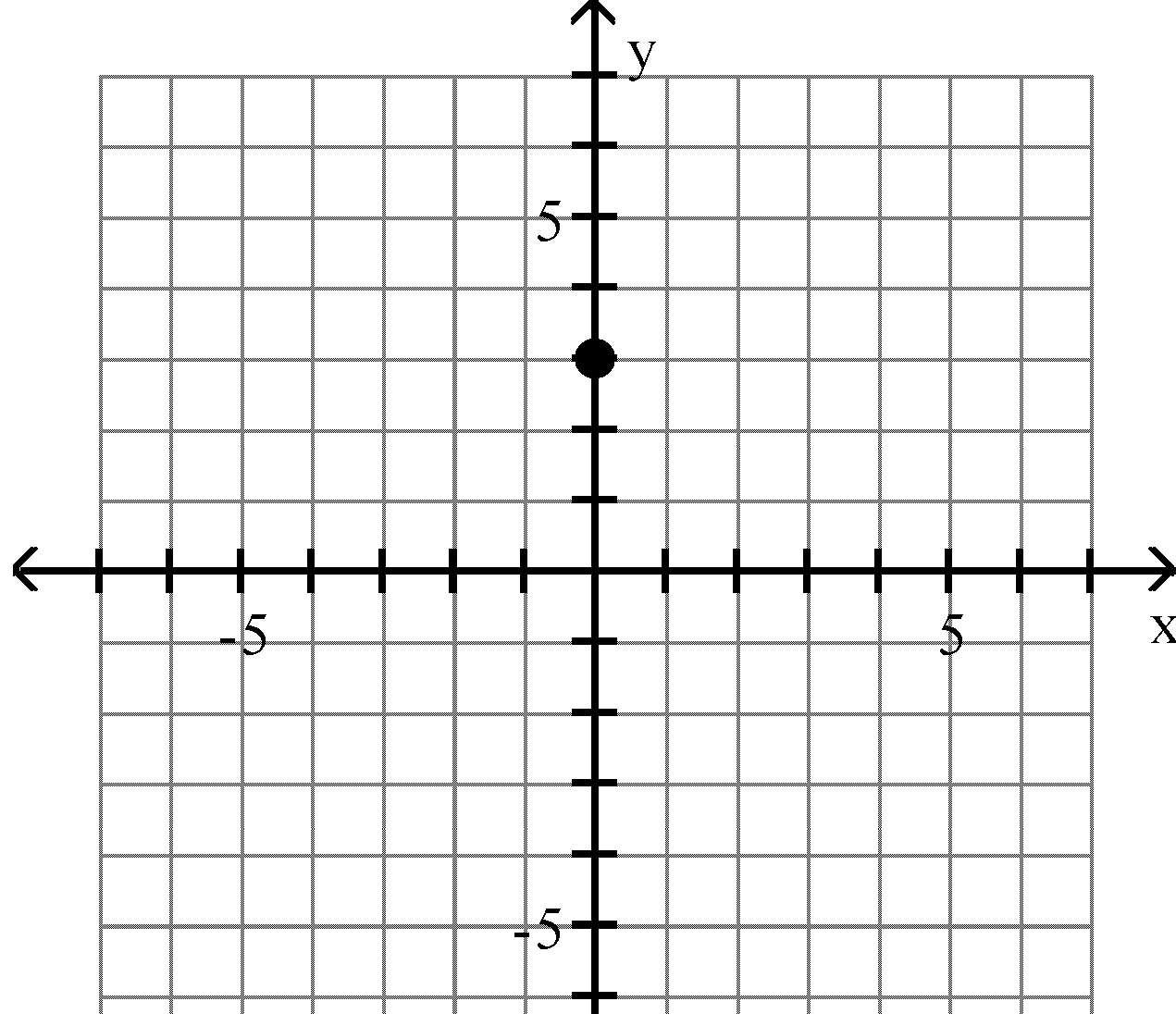

C) 5 D) 6 Answer: A
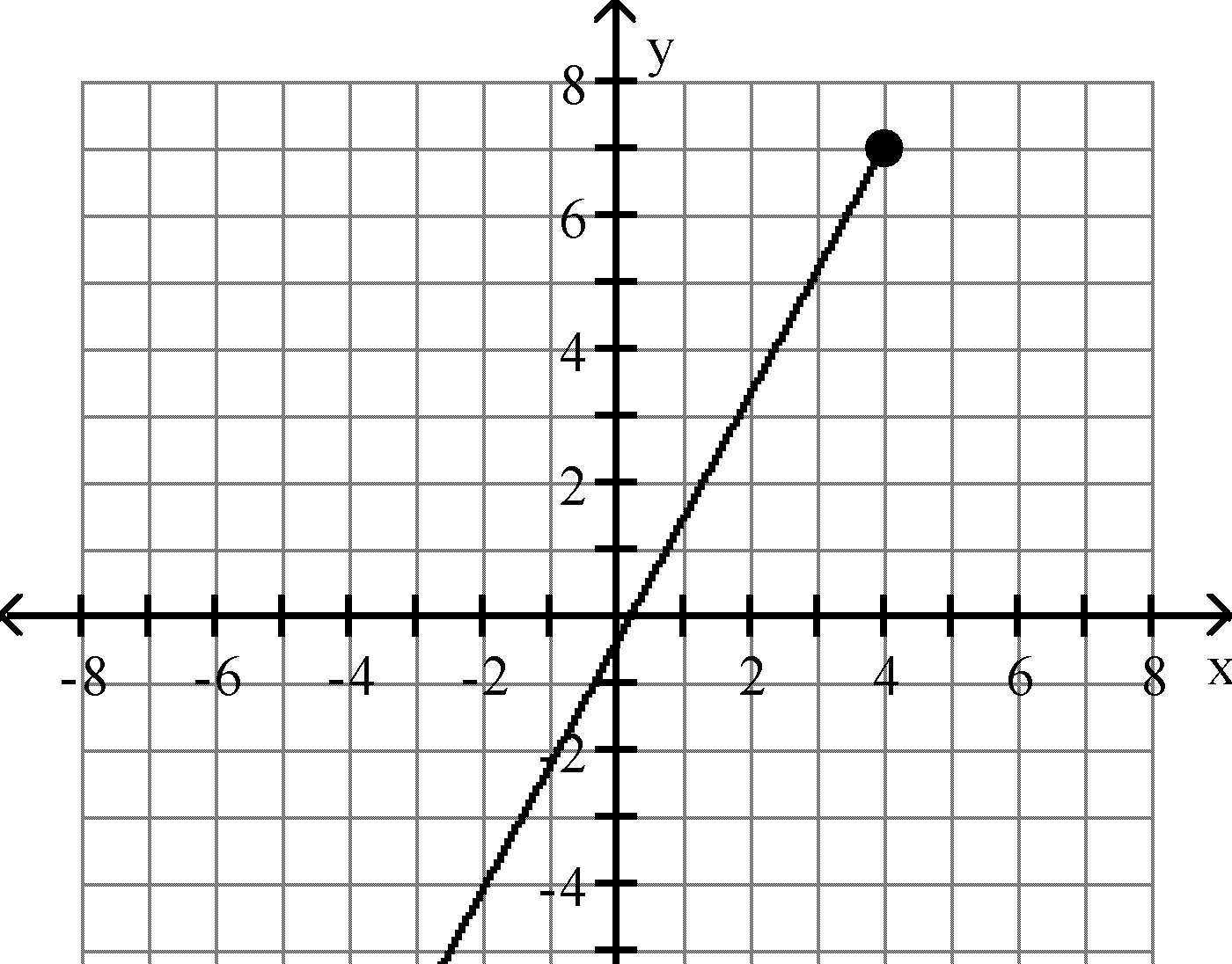

A) 218 B) 91 C) 230 D) 6
Answer: A
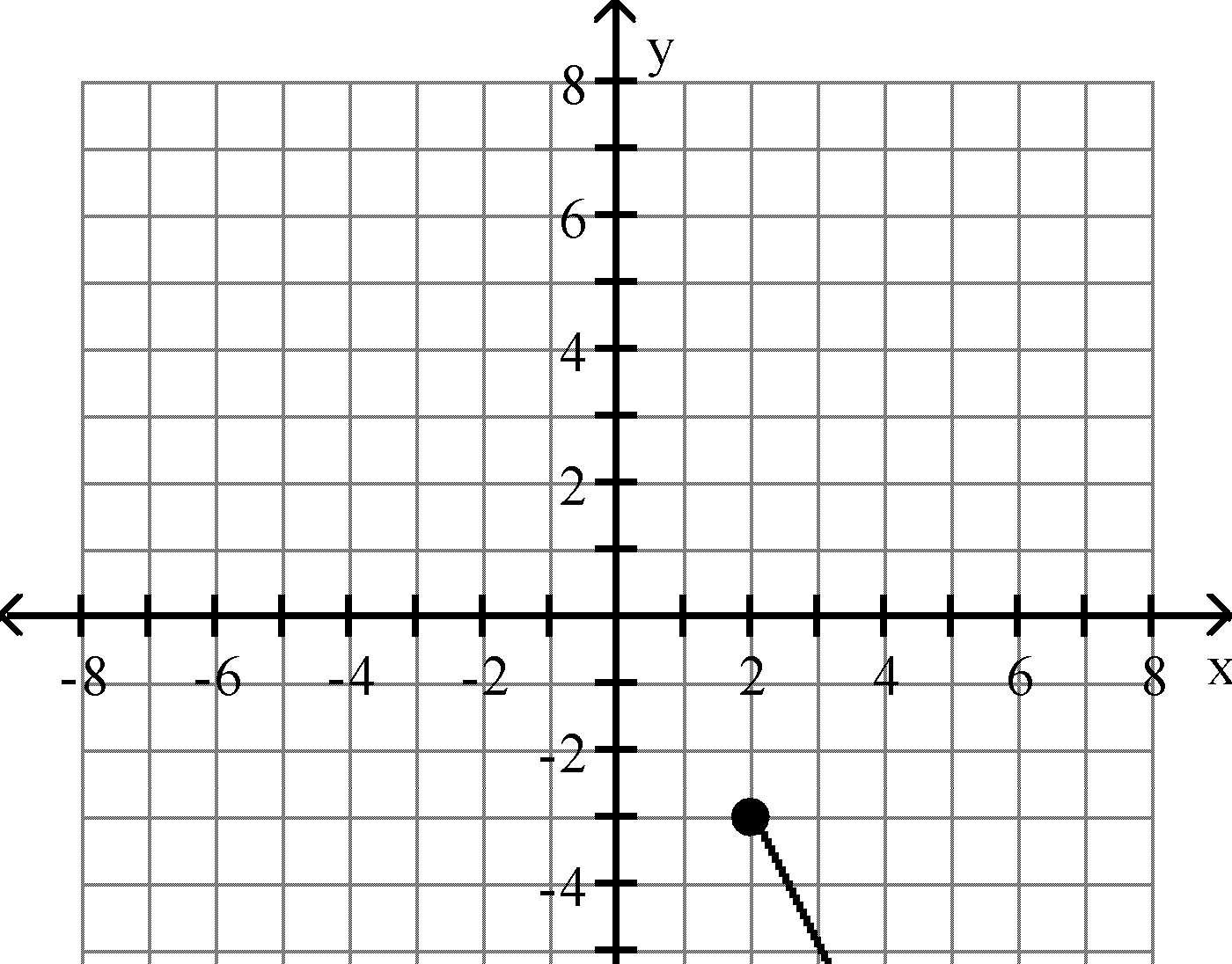

A) 12 B) 25 C) 6 D) 123 Answer: B 22) x
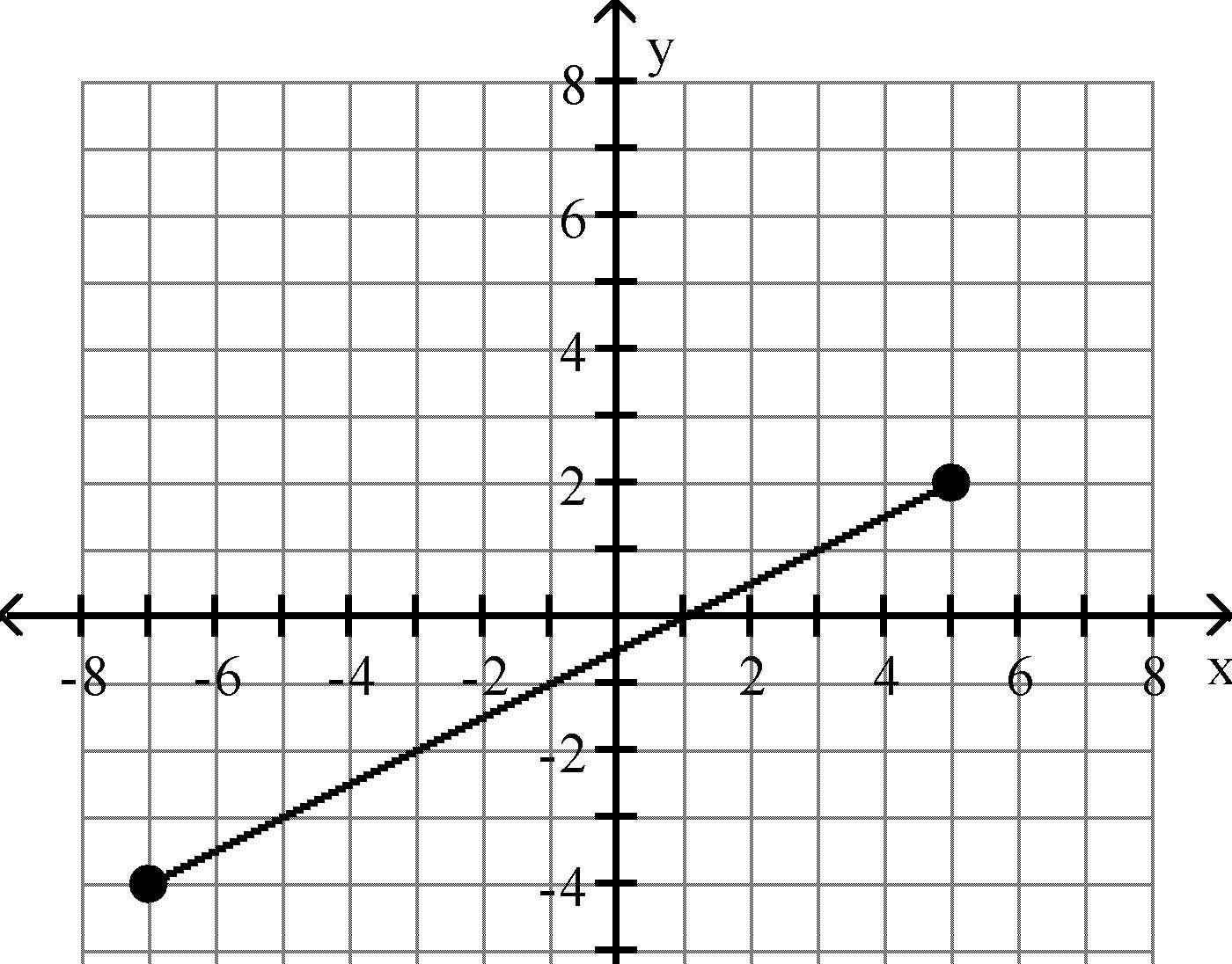

A) 6 B) 1083
C) 65 D) 108 Answer: C
23) P1 = (-3, -3); P2 = (-3, 4)
A) 7 B) 6 C) 8 D) 7 Answer: D
24) P1 = (-2, 2); P2 = (-8, -6)
A) 11 B) 10 C) 100 D) 20 Answer: B
25) P1 = (0, -3); P2 = (8, -3)
A) 8 B) 3 C) 64 D) 73 Answer: A
26) P1 = (0, 0); P2 = (-3, -4) A) 2i3 B) 5 C) 7 D) 25 Answer: B
27) P1 = (4, 3); P2 = (-1, -5) A) 40 B) 3 C) 89 D) 39 Answer: C
28) P1 = (7, -5); P2 = (3, -7) A) 2 B) 25 C) 12 D) 123 Answer: B
29) P1 = (-5, -3); P2 = (7, -7)
A) 410 B) 128 C) 1282 D) 16 Answer: A
30) P1 = (-0.4, -0.8); P2 = (1.6, -2.4) Round to three decimal places, if necessary. A) 2.661 B) 2.561 C) 8.099 D) 18 Answer: B
Decide whether or not the points are the vertices of a right triangle.
31) (-7, 1), (-5, 1), (-5, 5) A) Yes B) No Answer: A
32) (7, 7), (9, 11), (11, 10) A) Yes B) No Answer: A
33) (2, 7), (8, 9), (7, 4) A) Yes B) No Answer: B
34) (6, -4), (12, -2), (18, -9)
A) Yes
Answer: B
Solve the problem.
B) No
35) Find all values of k so that the given points are 29 units apart. (-5, 5), (k, 0)
A) 7
Answer: C
B) 3, 7
C) -3, -7
36) Find the area of the right triangle ABC with A = (-2, 7), B = (7, -1), C = (3, 9).
A) 29 square units
Answer: A
D) -7
B) 29 2 square units C) 58 square units D) 58 2 square units
37) Find all the points having an x-coordinate of 9 whose distance from the point (3, -2) is 10.
A) (9, -12), (9, 8)
Answer: C
B) (9, 2), (9, -4)
C) (9, 6), (9, -10) D) (9, 13), (9, -7)
38) A middle school's baseball playing field is a square, 60 feet on a side. How far is it directly from home plate to second base (the diagonal of the square)? If necessary, round to the nearest foot.
A) 86 feet
Answer: D
B) 92 feet
C) 84 feet D) 85 feet
39) A motorcycle and a car leave an intersection at the same time. The motorcycle heads north at an average speed of 20 miles per hour, while the car heads east at an average speed of 48 miles per hour. Find an expression for their distance apart in miles at the end of t hours.
A) t68 miles
Answer: C
B) 2t13 miles
C) 52t miles
D) 52t miles
40) A rectangular city park has a jogging loop that goes along a length, width, and diagonal of the park. To the nearest yard, find the length of the jogging loop, if the length of the park is 125 yards and its width is 75 yards.
A) 346 yards
Answer: A
B) 145 yards
C) 146 yards
D) 345 yards
41) Find the length of each side of the triangle determined by the three points P1, P2, and P3. State whether the triangle is an isosceles triangle, a right triangle, neither of these, or both. P1 = (-5, -4), P2 = (-3, 4), P3 = (0, -1)
A) d(P1, P2) = 217; d(P2, P3) = 34; d(P1, P3) = 52 neither
B) d(P1, P2) = 217; d(P2, P3) = 34; d(P1, P3) = 52 right triangle
C) d(P1, P2) = 217; d(P2, P3) = 34; d(P1, P3) = 34 both
D) d(P1, P2) = 217; d(P2, P3) = 34; d(P1, P3) = 34 isosceles triangle
Answer: C
Find the midpoint of the line segment joining the points P1 and P2.
42) P1 = (6, 5); P2 = (8, 7)
A) (-2, -2) B) (6, 7)
Answer: D
43) P1 = (4, 9); P2 = (2, -2)
C) (14, 12) D) (7, 6)
A) 1, 11 2 B) 6, 7 C) 2, 11 D) 3, 7 2
Answer: D
44) P1 = (7, 1); P2 = (-16, -16)
A) -9, -15 B) 9, 15 C) 23 2 , 17 2
Answer: D
45) P1 = (0.7, -0.6); P2 = (-2.5, 2.9)
9 2 ,15 2
A) (1.15, -0.9) B) (-0.9, 1.15) C) (-1.6, 1.75) D) (1.75, -1.6)
Answer: B
46) P1 = (y, 5); P2 = (0, 3) A)y 2 , 2 B) y, 4 C) y 2 , 4 D) y, 8
Answer: C
47) P1 = (2b, 9); P2 = (3b, 8) A) 17b 2 , 5 2 B) b, 1
Answer: C
Solve the problem.
5b 2 , 17 2
5b, 17
48) If (-5, -2) is the endpoint of a line segment, and (-2, 0) is its midpoint, find the other endpoint. A) (1, -4) B) (1, 2) C) (-11, -6) D) (-1, 4)
Answer: B
49) If (-2, 3) is the endpoint of a line segment, and (-5, -2) is its midpoint, find the other endpoint. A) (-8, 8) B) (-8, -7) C) (4, 13) D) (-12, -3)
Answer: B
50) If (5, 10) is the endpoint of a line segment, and (10, 8) is its midpoint, find the other endpoint. A) (15, 12) B) (15, 6) C) (-5, 14) D) (1, 20)
Answer: B
51) If (-8, -7) is the endpoint of a line segment, and (-12, -2) is its midpoint, find the other endpoint. A) (2, -15) B) (-16, 3) C) (-16, -12) D) (0, -17)
Answer: B
52) The medians of a triangle intersect at a point. The distance from the vertex to the point is exactly two-thirds of the distance from the vertex to the midpoint of the opposite side. Find the exact distance of that point from the vertex A(3, 4) of a triangle, given that the other two vertices are at (0, 0) and (8, 0).
A) 17 3 B) 2 C) 8 3 D) 217 3
Answer: D
Determine whether the given point is on the graph of the equation.
53) Equation: y = x3 - x Point: (1, 0)
A) No
Answer: B
54) Equation: x2 - y2 = 64 Point: (42, 42)
B) Yes
A) Yes B) No
Answer: B
Graph the equation by plotting points.
55) y = x - 2
Answer: D
y = 2x - 6
Answer: B
y = -x2 + 1
Answer: A 58) 3x + 4y = 12
Answer: D 59) 4x2 + 9y = 36
Answer: C
Solve the problem.
60) If (a, 3) is a point on the graph of y = 2x - 5, what is a? A) 1 B) 4
Answer: B
61) If (3, b) is a point on the graph of 3x - 2y = 17, what is b?
-4
Answer: A
11 3
-4
-1
23 3
4
62) The height of a baseball (in feet) at time t (in seconds) is given by y = -16x2 + 80x + 5. Which one of the following points is not on the graph of the equation?
A) (2, 117)
Answer: A
List the intercepts of the graph. 63)
B) (3, 101)
C) (4, 69)
D) (1, 69)
A) (0, -3), (0, 3) B) (-3, 0), (3, 0) C) (-3, 0), (0, 3)
Answer: B
(0, -3), (3, 0)
Answer: A
A) 0,π 2 , (0, -2), 0, π 2
B) 0,π 2 , (-2, 0), 0, π 2
C)π 2 , 0 , (-2, 0), π 2 , 0 D)π 2 , 0 , (0, -2), π 2 , 0
Answer: D
A) (0, -4), (8, 0), (0, 2) B) (0, -4), (0, 8), (2, 0)
Answer: C
C) (-4, 0), (0, 8), (2, 0) D) (-4, 0), (0, 8), (0, 2)
-10-5510
A) (-1, 0) B) (1, 0)
Answer: A
68) x-10-5510 y 10 5 -5 -10
A) (-2, 0), (0, 2)
C) (-2, 0), (0, -2), (0, 2), (2, 0)
Answer: C
C) (0, -1) D) (0, 1)
B) (0, 2), (2, 0)
D) (-2, 0), (0, -2), (0, 0), (0, 2), (2, 0)
A) (3, 0), (1, 0), (-5, 0), (0, 3)
C) (3, 0), (0, -3), (0, 1), (0, 5)
Answer: D
70)

A) (-4, 0), (0, 4), (4, 0)
Answer: A
B) (-2, 0), (0, 4), (2, 0)
List the intercepts for the graph of the equation.
71) y = x + 3
A) (3, 0), (0, -3)
Answer: D
72) y = -2x
A) (0, 0)
Answer: A
73) y2 = x + 81
A) (9, 0), (0, 81), (0, -81)
B) (3, 0), (0, 3)
B) (3, 0), (0, 3), (0, 1), (0, -5)
D) (-3, 0), (1, 0) (5, 0), (0, 3)
C) (-2, 0), (2, 0) D) (-2, 0), (0, 2), (2, 0)
C) (-3, 0), (0, -3)
D) (-3, 0), (0, 3)
B) (-2, -2)
C) (-2, 0)
D) (0, -2)
B) (-9, 0), (0, -81), (9, 0)
C) (0, -9), (81, 0), (0, 9) D) (0, -9), (-81, 0), (0, 9)
Answer: D
74) y = 6 x
A) (1, 1)
Answer: B
75) x2 + y - 25 = 0
A) (5, 0), (0, 25), (0, -25)
C) (-5, 0), (0, -25), (5, 0)
Answer: D
76) 9x2 + 16y2 = 144
A) (-16, 0), (0, -9), (0, 9), (16, 0)
C) (-4, 0), (0, -3), (0, 3), (4, 0)
Answer: C
77) 9x2 + y2 = 9
A) (-3, 0), (0, -1), (0, 1), (3, 0)
C) (-9, 0), (0, -1), (0, 1), (9, 0)
Answer: D
78) y = x3 - 64
B) (0, 0)
C) (0, 1)
B) (0, -5), (25, 0), (0, 5)
D) (-5, 0), (0, 25), (5, 0)
D) (1, 0)
B) (-9, 0), (-16, 0), (16, 0), (9, 0)
D) (-3, 0), (-4, 0), (4, 0), (3, 0)
B) (-1, 0), (0, -9), (0, 9), (1, 0)
D) (-1, 0), (0, -3), (0, 3), (1, 0)
A) (-64, 0), (0, 4) B) (0, -4), (0, 4)
Answer: C
79) y = x4 - 16
A) (0, 16)
C) (0, 16), (-2, 0), (2, 0)
Answer: B
80) y = x2 + 6x + 9
A) (3, 0), (3, 0), (0, 9) B) (0, -3), (0, -3), (9, 0)
Answer: D
81) y = x2 + 1
A) (1, 0), (0, -1), (0, 1) B) (1, 0)
Answer: C
82) y = 7x x2 + 49
A) (0, -7), (0, 0), (0, 7)
C) (0, -64), (4, 0) D) (0, -4), (-4, 0)
B) (0, -16), (-2, 0), (2, 0)
D) (0, -16)
C) (0, 3), (0, 3), (9, 0) D) (-3, 0), (-3, 0), (0, 9)
C) (0, 1) D) (0, 1), (-1, 0), (1, 0)
B) (-49, 0), (0, 0), (49, 0) C) (0, 0) D) (-7, 0), (0, 0), (7, 0)
Answer: C
83) y = x2 - 16 4x4
A) (-4, 0), (4, 0)
B) (-16, 0), (0, 0), (16, 0)
C) (0, -4), (0, 4) D) (0, 0)
Answer: A
Plot the point A. Plot the point B that has the given symmetry with point A. 84) A = (5, -5); B is symmetric to A with respect to the x-axis x -5-4-3-2-112345
Answer: C
85) A = (0, 5); B is symmetric to A with respect to the origin
Answer: C
List the intercepts of the graph.Tell whether the graph is symmetric with respect to the x-axis, y-axis, origin, or none of these.
A) intercepts: (0, -4) and (0, 4) symmetric with respect to y-axis
B) intercepts: (0, -4) and (0, 4) symmetric with respect to x-axis, y-axis, and origin
C) intercepts: (-4, 0) and (4, 0) symmetric with respect to origin
D) intercepts: (-4, 0) and (4, 0) symmetric with respect to x-axis, y-axis, and origin
Answer: D
87)
A) intercepts: (1, 0) and (-1, 0) symmetric with respect to x-axis, y-axis, and origin
B) intercepts: (0, 1) and (0, -1) symmetric with respect to origin
C) intercepts: (1, 0) and (-1, 0 symmetric with respect to y-axis
D) intercepts: (0, 1) and (0, -1) symmetric with respect to x-axis, y-axis, and origin
Answer: D
A) intercept: (0, 7) symmetric with respect to x-axis
C) intercept: (7, 0) no symmetry
Answer: B
B) intercept: (0, 7) no symmetry
D) intercept: (7, 0) symmetric with respect to y-axis
A) intercept: (5, 0) symmetric with respect to y-axis
C) intercept: (0, 5) symmetric with respect to origin
Answer: B
B) intercept: (0, 5) symmetric with respect to y-axis
D) intercept: (5, 0) symmetric with respect to x-axis
A) intercepts: (-2, 0), (0, 0), (2, 0) symmetric with respect to origin
B) intercepts: (-2, 0), (0, 0), (2, 0) symmetric with respect to x-axis
C) intercepts: (-2, 0), (0, 0), (2, 0) symmetric with respect to x-axis, y-axis, and origin
D) intercepts: (-2, 0), (0, 0), (2, 0) symmetric with respect to y-axis
Answer: A
Draw a complete graph so that it has the given type of symmetry. 91) Symmetric with respect to the y-axis x-5-4-3-2-112345
Answer: B
Answer: C
93) Symmetric with respect to the x-axis
Answer: B
List the intercepts and type(s) of symmetry, if any. 94) y2 = x + 9
A) intercepts: (0, -9), (3, 0), (-3, 0) symmetric with respect to y-axis
C) intercepts: (0, 9), (3, 0), (-3, 0) symmetric with respect to y-axis
Answer: D
95) 4x2 + 9y2 = 36
A) intercepts: (3, 0), (-3, 0), (0, 2), (0, -2) symmetric with respect to x-axis, y-axis, and origin
B) intercepts: (2, 0), (-2, 0), (0, 3), (0, -3) symmetric with respect to the origin
C) intercepts: (3, 0), (-3, 0), (0, 2), (0, -2) symmetric with respect to x-axis and y-axis
D) intercepts: (2, 0), (-2, 0), (0, 3), (0, -3) symmetric with respect to x-axis and y-axis
Answer: A
B) intercepts: (9, 0), (0, 3), (0, -3) symmetric with respect to x-axis
D) intercepts: (-9, 0), (0, 3), (0, -3) symmetric with respect to x-axis
96) y = -x3
x2 - 7
A) intercept: (0, 0) symmetric with respect to x-axis
C) intercept: (0, 0) symmetric with respect to origin
Answer: C
B) intercept: (0, 0) symmetric with respect to y-axis
D) intercepts: (7, 0), (- 7, 0), (0, 0) symmetric with respect to origin
Determine whether the graph of the equation is symmetric with respect to the x-axis, the y-axis, and/or the origin.
97) y = x + 5
A) origin
B) y-axis
C) x-axis
D) x-axis, y-axis, origin
E) none
Answer: E
98) y = 3x
A) y-axis
B) origin
C) x-axis
D) x-axis, y-axis, origin
E) none
Answer: B
99) x2 + y - 25 = 0
A) origin
B) x-axis
C) y-axis
D) x-axis, y-axis, origin
E) none
Answer: C
100) y2 - x - 64 = 0
A) y-axis
B) origin
C) x-axis
D) x-axis, y-axis, origin
E) none
Answer: C
101) 4x2 + 16y2 = 64
A) y-axis
B) origin
C) x-axis
D) x-axis, y-axis, origin
E) none
Answer: D
102) 4x2 + y2 = 4
A) y-axis
B) x-axis
C) origin
D) x-axis, y-axis, origin
E) none
Answer: D
103) y = x2 + 16x + 64
A) y-axis
B) x-axis
C) origin
D) x-axis, y-axis, origin
E) none
Answer: E
104) y = 8x x2 + 64
A) y-axis
B) x-axis
C) origin
D) x-axis, y-axis, origin
E) none
Answer: C
105) y = x2 - 9 3x4
A) y-axis
B) origin
C) x-axis
D) x-axis, y-axis, origin
E) none
Answer: A
106) y = 3x2 + 5
A) origin
B) y-axis
C) x-axis
D) x-axis, y-axis, origin
E) none
Answer: B
107) y = (x - 4)(x - 9)
A) x-axis
B) origin
C) y-axis
D) x-axis, y-axis, origin
E) none
Answer: E
108) y = -5x3 + 5x
A) x-axis
B) origin
C) y-axis
D) x-axis, y-axis, origin
E) none
Answer: B
109) y = -6x4 - 6x - 7
A) x-axis
B) origin
C) y-axis
D) x-axis, y-axis, origin
E) none
Answer: E
Solve the problem.
110) If a graph is symmetric with respect to the y-axis and it contains the point (5, -6), which of the following points is also on the graph?
A) (-5, 6)
Answer: A
B) (-6, 5)
C) (5, -6)
D) (-5, -6)
111) If a graph is symmetric with respect to the origin and it contains the point (-4, 7), which of the following points is also on the graph?
A) (4, -7)
Answer: A
Graph the equation by plotting points.
112) y = x3
B) (-4, -7)
C) (7, -4) D) (4, 7)
Answer: D
Answer: B
Answer: A 115) y = 1 x
Answer: B
Write the standard form of the equation of the circle. 116)
Answer: B
A) (x - 3)2 + (y - 4)2 = 25
C) (x - 4)2 + (y - 3)2 = 25
Answer: A
B) (x + 4)2 + (y + 3)2 = 25
D) (x + 3)2 + (y + 4)2 = 25
Write the standard form of the equation of the circle with radius r and center (h, k).
118) r = 3; (h, k) = (0, 0)
A) x2 + y2 = 3
B) x2 + y2 = 9
C) (x - 3)2 + (y - 3)2 = 3 D) (x - 3)2 + (y - 3)2 = 9
Answer: B
119) r = 2; (h, k) = (4, -1)
A) (x - 4)2 + (y + 1)2 = 4
B) (x - 4)2 + (y + 1)2 = 2
C) (x + 4)2 + (y - 1)2 = 4 D) (x + 4)2 + (y - 1)2 = 2
Answer: A
120) r = 10; (h, k) = (-8, 0)
A) x2 + (y - 8)2 = 10 B) x2 + (y + 8)2 = 10
Answer: C
121) r = 11; (h, k) = (0, 6)
(x + 8)2 + y2 = 100
(x - 8)2 + y2 = 100
A) (x - 6)2 + y2 = 121 B) x2 + (y - 6)2 = 121 C) (x + 6)2 + y2 = 121 D) x2 + (y + 6)2 = 11
Answer: B
122) r = 13; (h, k) = (5, -6)
A) (x - 6)2 + (y + 5)2 = 169
B) (x + 6)2 + (y - 5)2 = 169
C) (x - 5)2 + (y + 6)2 = 13 D) (x + 5)2 + (y - 6)2 = 13
Answer: C
123) r = 14; (h, k) = (0, 1)
A) x2 + (y - 1)2 = 14 B) (x + 1)2 + y2 = 196 C) (x - 1)2 + y2 = 196 D) x2 + (y + 1)2 = 14
Answer: A
Solve the problem.
124) Find the equation of a circle in standard form where C(6, -2) and D(-4, 4) are endpoints of a diameter.
A) (x - 1)2 + (y - 1)2 = 34
C) (x + 1)2 + (y + 1)2 = 136
Answer: A
B) (x - 1)2 + (y - 1)2 = 136
D) (x + 1)2 + (y + 1)2 = 34
125) Find the equation of a circle in standard form with center at the point (-3, 2) and tangent to the line y = 4.
A) (x + 3)2 + (y - 2)2 = 16
C) (x - 3)2 + (y + 2)2 = 4
Answer: B
B) (x + 3)2 + (y - 2)2 = 4
D) (x - 3)2 + (y + 2)2 = 16
126) Find the equation of a circle in standard form that is tangent to the line x = -3 at (-3, 5) and also tangent to the line x = 9.
A) (x + 3)2 + (y - 5)2 = 36
C) (x + 3)2 + (y + 5)2 = 36
Answer: D
Find the center (h, k) and radius r of the circle with the given equation. 127) x2 + y2 = 9
B) (x - 3)2 + (y + 5)2 = 36
D) (x - 3)2 + (y - 5)2 = 36
A) (h, k) = (0, 0); r = 9 B) (h, k) = (3, 3); r = 9 C) (h, k) = (3, 3); r = 3 D) (h, k) = (0, 0); r = 3
Answer: D
128) (x - 9)2 + (y + 3)2 = 4
A) (h, k) = (9, -3); r = 2
C) (h, k) = (-3, 9); r = 4
Answer: A
129) (x + 4)2 + y2 = 16
A) (h, k) = (-4, 0); r = 16
B) (h, k) = (-3, 9); r = 2
D) (h, k) = (9, -3); r = 4
B) (h, k) = (-4, 0); r = 4
C) (h, k) = (0, -4); r = 16 D) (h, k) = (0, -4); r = 4
Answer: B
130) x2 + (y + 1)2 = 100
A) (h, k) = (-1, 0); r = 100
C) (h, k) = (-1, 0); r = 10
Answer: D
131) 5(x + 5)2 + 5(y - 3)2 = 75
A) (h, k) = (-5, 3); r = 515
C) (h, k) = (5, -3); r = 15
Answer: B
B) (h, k) = (0, -1); r = 100
D) (h, k) = (0, -1); r = 10
B) (h, k) = (-5, 3); r = 15
D) (h, k) = (5, -3); r = 515
Solve the problem.
132) Find the standard form of the equation of the circle. Assume that the center has integer coordinates and the radius is an integer. A) (x - 1)2 + (y + 2)2 = 9 B) x2 + y2 + 2x - 4y - 4 = 0 C) x2 + y2 - 2x + 4y - 4 = 0 D) (x + 1)2 + (y - 2)2 = 9

Answer: D
Graph the circle with radius r and center (h, k).
133) r = 2; (h, k) = (0, 0)
Answer: D 134) r = 2; (h, k) = (0, 5)
Answer: D 135) r = 2; (h, k) = (1, 0)
Answer: C
136) r = 3; (h, k) = (5, 4)
Answer: D
Graph the equation. 137) x2 + y2 = 16
Answer: D
(x - 1)2 + (y + 1)2 = 4
Answer: C
x2 + (y - 1)2 = 4
Answer: D
(x - 1)2 + y2 = 9
Answer: D
Find the center (h, k) and radius r of the circle. Graph the circle. 141) x2 + y2 - 8x - 8y + 16 = 0
10
C) (h, k) = (4, 4); r = 4
Answer: C
142) x2 + y2 + 10x + 8y + 25 = 0 x-10-5510 y 10
A) (h, k) = (-5, -4); r = 4
D) (h, k) = (4, -4); r = 4
-10-5510 y 10
B) (h, k) = (-5, 4); r = 4
C) (h, k) = (5, -4); r = 4 x-10-5510 y 10 5 -5 -10
Answer: A
Find the center (h, k) and radius r of the circle with the given equation.
143) x2 - 2x + 1 + (y - 5)2 = 64
A) (h, k) = (1, 5); r = 8
C) (h, k) = (-5, -1); r = 64
Answer: A
144) x2 + 6x + 9 + y2 - 8y + 16 = 49
A) (h, k) = (4, -3); r = 7
C) (h, k) = (3, -4); r = 49
Answer: B
145) x2 + y2 - 2x - 14y + 50 = 25
A) (h, k) = (-1, -7); r = 25
C) (h, k) = (7, 1); r = 5
Answer: D
146) x2 + y2 + 10x + 2y = -1
A) (h, k) = (-1, -5); r = 5
C) (h, k) = (5, 1); r = 25
Answer: B
147) 4x2 + 4y2 - 12x + 16y - 5 = 0
A) (h, k) = ( 3 2 , -2); r = 35 2
C) (h, k) = (3 2 , 2); r= 35 2
Answer: B
Find the general form of the equation of the the circle. 148) Center at the point (-4, -3); containing the point (-3, 3)
A) x2 + y2 + 6x - 6y - 17 = 0
C) x2 + y2 + 6x + 8y - 17 = 0
Answer: B
D) (h, k) = (5, 4); r = 4 x-10-5510 y 10 5 -5 -10
B) (h, k) = (5, 1); r = 8
D) (h, k) = (-1, -5); r = 64
B) (h, k) = (-3, 4); r = 7
D) (h, k) = (-4, 3); r = 49
B) (h, k) = (-7, -1); r = 25
D) (h, k) = (1, 7); r = 5
B) (h, k) = (-5, -1); r = 5
D) (h, k) = (1, 5); r = 25
B) (h, k) = (3 2 , -2); r = 30 2
D) (h, k) = (3 2 , 2); r = 30 2
B) x2 + y2 + 8x + 6y - 12 = 0
D) x2 + y2 - 6x + 6y - 12 = 0
149) Center at the point (2, -3); containing the point (5, -3)
A) x2 + y2 + 4x - 6y + 22 = 0
C) x2 + y2 - 4x + 6y + 4 = 0
Answer: C
150) Center at the point (4, 6); tangent to y-axis
A) x2 + y2 - 8x - 12y + 68 = 0
C) x2 + y2 + 8x + 12y + 36 = 0
Answer: B
Solve the problem.
B) x2 + y2 + 4x - 6y + 4 = 0
D) x2 + y2 - 4x + 6y + 22 = 0
B) x2 + y2 - 8x - 12y + 36 = 0
D) x2 + y2 - 8x - 12y + 16 = 0
151) If a circle of radius 5 is made to roll along the x-axis, what is the equation for the path of the center of the circle?
A) x = 5 B) y = 0 C) y = 5 D) y = 10
Answer: C
152) Earth is represented on a map of the solar system so that its surface is a circle with the equation x2 + y2 + 2x + 8y - 3952 = 0. A weather satellite circles 0.4 units above the Earth with the center of its circular orbit at the center of the Earth. Find the general form of the equation for the orbit of the satellite on this map.
A) x2 + y2 + 2x + 8y - 4002.56 = 0
B) x2 + y2 - 2x - 8y - 4002.56 = 0
C) x2 + y2 + 2x + 8y - 45.84 = 0 D) x2 + y2 + 2x + 8y + 16.84 = 0
Answer: A
153) Find an equation of the line containing the centers of the two circles
x2 + y2 + 6x + 12y + 44 = 0and x2 + y2 + 10x - 2y + 22 = 0
A) 7x - 2y - 33 = 0 B) -7x - 2y - 33 = 0
Answer: B
C)
154) A wildlife researcher is monitoring a black bear that has a radio telemetry collar with a transmitting range of 26 miles. The researcher is in a research station with her receiver and tracking the bear's movements. If we put the origin of a coordinate system at the research station, what is the equation of all possible locations of the bear where the transmitter would be at its maximum range?
A) x2 + y2 = 26 B) x2 + y2 = 676
Answer: B
C) x2 - y2 = 26
x2 + y2 = 52
155) If a satellite is placed in a circular orbit of 370 kilometers above the Earth, what is the equation of the path of the satellite if the origin is placed at the center of the Earth (the diameter of the Earth is approximately 12,740 kilometers)?
A) x2 + y2 = 171,872,100 B) x2 + y2 = 45,427,600
C) x2 + y2 = 136,900 D) x2 + y2 = 40,576,900
Answer: B
156) A power outage affected all homes and businesses within a 15 mi radius of the power station. If the power station is located 14 mi north of the center of town, find an equation of the circle consisting of the furthest points from the station affected by the power outage.
A) x2 + y2 = 225 B) x2 + (y + 14)2 = 225 C) x2 + (y - 14)2 = 15 D) x2 + (y - 14)2 = 225
Answer: D
157) A power outage affected all homes and businesses within a 4 mi radius of the power station. If the power station is located 5 mi west and 6 mi north of the center of town, find an equation of the circle consisting of the furthest points from the station affected by the power outage.
A) (x - 5)2 + (y + 6)2 = 16
C) (x + 5)2 + (y - 6)2 = 16
Answer: C
B) (x + 5)2 + (y + 6)2 = 16
D) (x - 5)2 + (y - 6)2 = 16
158) A Ferris wheel has a diameter of 200 feet and the bottom of the Ferris wheel is 9 feet above the ground. Find the equation of the wheel if the origin is placed on the ground directly below the center of the wheel, as illustrated.
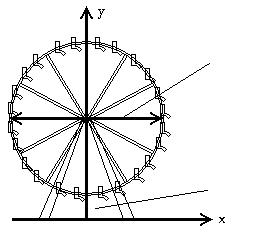
A) x2 + (y - 100)2 = 10,000
200 ft.
9 ft.
B) x2 + y2 = 10,000
C) x2 + (y - 109)2 = 10,000 D) x2 + (y - 100)2 = 40,000
Answer: C
Determine whether the relation represents a function. If it is a function, state the domain and range. 159)
5 → 30
9 → 54

13 → 78
17 → 102
A) function domain:{30, 54, 78, 102} range: {5, 9, 13, 17}
Answer: B
160)

Alice Brad Carl snake cat dog
A) function domain: {snake, cat, dog} range: {Alice, Brad, Carl}
Answer: C
B) function domain: {5, 9, 13, 17} range: {30, 54, 78, 102}
C) not a function
B) function domain: {Alice, Brad, Carl} range: {snake, cat, dog}
C) not a function
Alice Brad Carl

cat dog
A) function domain: {Alice, Brad, Carl} range: {cat, dog}
Answer: A
162) {(-1, 7), (0, 4), (4, 1), (7, -1)}
A) function domain: {-1, 0, 4, 7} range: {7, 4, 1, -1}
Answer: A
163) {(19, -4), (3, -3), (3, 0), (12, 3), (28, 5)}
A) function domain: {-4, -3, 0, 3, 5} range: {19, 12, 3, 28}
Answer: C
164) {(-4, 18), (-3, 11), (0, 2), (3, 11), (5, 27)}
A) function domain: {-4, -3, 0, 3, 5} range: {18, 11, 2, 27}
Answer: A
B) function domain: {cat, dog} range: {Alice, Brad, Carl}
C) not a function
B) function domain: {7, 4, 1, -1} range: {-1, 0, 4, 7}
C) not a function
B) function domain: {19, 12, 3, 28} range: {-4, -3, 0, 3, 5}
B) function domain: {18, 11, 2, 27} range: {-4, -3, 0, 3, 5}
165) {(9.55, 12.95), (9.555, -12.9), (2 3 , 0), (0.67, -9)}
A) function domain: {9.55, 9.555, 2 3 , 0.67} range: {12.95, -12.9, 0, -9}
Answer: A
B) function domain: {12.95, -12.9, 0, -9} range: {9.55, 9.555, 2 3 , 0.67}
Determine whether the equation defines y as a function of x.
166) y = x3
A) function
Answer: A
167) y = 1 x
A) function
Answer: A
168) y = |x|
A) function
Answer: A
B) not a function
C) not a function
B) not a function
C) not a function
B) not a function
C) not a function
169) y2 = 7 - x2
A) function B) not a function Answer: B
170) y = ± 1 - 5x
A) function B) not a function Answer: B
171) x = y2
A) function B) not a function Answer: B
172) y2 + x = 3
A) function B) not a function Answer: B
173) y = 6x2 - 2x + 7
A) function B) not a function Answer: A
174) y = 3x - 1 x - 3
A) function B) not a function Answer: A
175) x2 - 3y2 = 1
A) function B) not a function Answer: B
176) x - 6y = 2
A) function B) not a function Answer: A
177) -7x + x2 + 53 = y
A) function B) not a function Answer: A
Find the value for the function.
178) Find f(3) when f(x) = x2 + 3x - 6. A) 24 B) -6 C) 6 D) 12 Answer: D
179) Find f(-1) when f(x) = x2 - 7 x + 3 . A) - 3 B) 4 C) 2 D) 1 2
Answer: A
180) Find f(-9) when f(x) = |x|- 6. A) -15 B) 3 C) -3 D) 15
Answer: B
181) Find f(5) when f(x) = x2 + 3x A) 210 B) 27 C) 34 D) 23
Answer: A
182) Find f(-x) when f(x) = -2x2 - 5x + 3. A) -2x2 + 5x - 3 B) 2x2 + 5x - 3
Answer: C
-2x2 + 5x + 3
183) Find f(-x) when f(x) = x x2 + 5 A) -x x2 + 5 B) x -x2 + 5 C) -x x2 - 5
Answer: A
184) Find -f(x) when f(x) = 3x2 - 2x + 3. A) -3x2 + 2x + 3 B) -3x2 + 2x - 3
Answer: B
185) Find -f(x) when f(x) = |x| - 8 A) -|x| + 8
Answer: A
186) Find f(x - 1) when f(x) = 4x2 + 4x - 6. A) -4x2 + 4x - 6
Answer: C
187) Find f(x + 1) when f(x) = x2 - 2 x + 3 . A) x2 - 1 x + 4 B) x2 + 2x - 1 x + 4
Answer: B
188) Find f(2x) when f(x) = 3x2 - 2x + 4. A) 6x2 - 4x + 8 B) 6x2 - 4x + 4
Answer: D
-x -x2 + 5
x2 + 2x + 3 x + 4 D) x2 + 2x - 1 x - 2
12x2 - 4x + 8
189) Find f(2x) when f(x) = 5x2 + 7x A) 10x2 + 28x B) 20x2 + 14x C) 25x2 + 7x
Answer: B
12x2 - 4x + 4
10x2 + 14x
190) Find f(x + h) when f(x) = 2x2 + 5x + 2. A) 2x2 + 2xh + 2h2 + 5x + 5h + 2
2x2 + 2h2 + 5x + 5h + 2 C) 2x2 + 4xh + 2h2 + 5x + 5h + 2
Answer: C
191) Find f(x + h) when f(x) = 7x + 4 3x + 5 .
7x + 4h 3x + 5h
Answer: C
Solve the problem.
192) If f(x) = 8x3 + 7x2 - x + C and f(-3) = 1, what is the value of C? A) C = -281
C = 151
2x2 + 2h2 + 9x + 9h + 2
C = -155
C = -5
Answer: B
193) If f(x) = x - B x - A, f(-2) = 0, and f(4) is undefined, what are the values of A and B?
A) A = -2, B = 4 B) A = -4, B = 2 C) A = 2, B = -4
Answer: D
194) If f(x) = x - 5A 10x + 4 and f(10) = -5, what is the value of A?
A) A = 106 B) A = -106
Answer: A
A = 4, B = -2
A = 102 D) A = -102
195) If a rock falls from a height of 40 meters on Earth, the height H (in meters) after x seconds is approximately H(x) = 40 - 4.9x2.
What is the height of the rock when x = 1.8 seconds? Round to the nearest hundredth, if necessary.
A) 31.18 m
Answer: D
B) 24.45 m
C) 55.88 m
D) 24.12 m
196) If a rock falls from a height of 40 meters on Earth, the height H (in meters) after x seconds is approximately H(x) = 40 - 4.9x2
When does the rock strike the ground? Round to the nearest hundredth, if necessary.
A) 1.29 sec
Answer: C
B) 1.67 sec C) 2.86 sec D) 8.16 sec
197) It has been determined that the number of fish f(t) that can be caught in t minutes in a certain pond using a certain bait is f(t) = 0.24t + 1, for t > 10. Find the approximate number of fish that can be caught if you fish for 29 minutes. A) About 7 fish
Answer: A
B) About 31 fish
C) About 33 fish
D) About 17 fish
198) The function P(d) = 1 + d 33 gives the pressure, in atmospheres (atm), at a depth d feet in the sea. Find the pressure at 31 feet.
A) 32 33 atm
Answer: D
B) 31 33 atm C) 2 33 atm D) 64 33 atm
199) The function F described by F(C) = 9 5 C + 32 gives the Fahrenheit temperature corresponding to the Celsius temperature C. Find the Fahrenheit temperature equivalent to 25°C. A) 122°F B) 167°F C) 212°F D) 77°F
Answer: D
Find the domain of the function.
200) f(x) = 8x - 2
A) {x|x ≥ 2} B) {x|x ≠ 0} C) {x|x > 0} D) all real numbers
Answer: D
201) f(x) = x2 + 2
A) {x|x > -2}
Answer: D
202) f(x) = x2 x2 + 20
A) all real numbers
Answer: A
203) g(x) = 2x x2 - 25
B) {x|x ≥ -2} C) {x|x ≠ -2} D) all real numbers
{x|x > -20}
{x|x ≠ 0}
A) all real numbers B) {x|x ≠ 0} C) {x|x > 25}
Answer: D
204) h(x) = x - 3 x3 - 64x
A) all real numbers B) {x|x ≠ 3}
Answer: C
205) f(x) = 2 - x
{x|x ≠ -20}
{x|x ≠ -5, 5}
{x|x ≠ -8, 0, 8}
{x|x ≠ 0}
A) {x|x ≤ 2} B) {x|x ≠ 2} C) {x|x ≠ 2} D) {x|x ≤ 2}
Answer: A
206) x x - 2
A) all real numbers
Answer: B
B) {x|x > 2} C) {x|x ≥ 2}
{x|x ≠ 2}
Determine whether the graph is that of a function. If it is, use the graph to find its domain and range, the intercepts, if any, and any symmetry with respect to the x-axis, the y-axis, or the origin. 207)
-10-5510
A) function domain: {x|-3 ≤ x ≤ 3} range: all real numbers intercepts: (-3, 0), (3, 0) symmetry: x-axis, y-axis
C) function domain: {x|x ≤ -3 or x ≥ 3} range: all real numbers intercepts: (-3, 0), (3, 0) symmetry: x-axis, y-axis, origin
Answer: D
208)
B) function domain: all real numbers range: {y|y ≤ -3 or y ≥ 3} intercepts: (-3, 0), (3, 0) symmetry: y-axis
D) not a function
A) function domain: {x|x > 0} range: all real numbers intercept: (0, 1) symmetry: origin
C) function domain: all real numbers range: {y|y > 0} intercept: (1, 0) symmetry: none
Answer: B
B) function domain: {x|x > 0} range: all real numbers intercept: (1, 0) symmetry: none
D) not a function
A) function
domain: {x|-1 ≤ x ≤ 1}
range: {y|-π ≤ y ≤ π}
intercepts: (-π, 0), (0, 0), (π, 0) symmetry: none
C) function
domain: {x|-π ≤ x ≤ π}
range: {y|-1 ≤ y ≤ 1}
intercepts: (-π, 0), (0, 0), (π, 0) symmetry: origin
Answer: C
B) function domain: all real numbers range: {y|-1 ≤ y ≤ 1}
intercepts: (-π, 0), (0, 0), (π, 0) symmetry: origin
D) not a function
A) function domain: all real numbers
range: {y|y ≤ 4}
intercepts: (-1, 0), (0, 3), (3, 0) symmetry: none
C) function domain: {x|x ≤ 4} range: all real numbers
intercepts: (-1, 0), (0, 3), (3, 0) symmetry: y-axis
Answer: A
B) function domain: all real numbers range: {y|y ≤ 4}
intercepts: (0, -1), (3, 0), (0, 3) symmetry: none
D) not a function
A) function
domain: {x|-8 ≤ x ≤ 8}
range: {y|-8 ≤ y ≤ 8} intercepts: (-8, 0), (0, -8), (0, 8), (8, 0) symmetry: x-axis, y-axis, origin
C) function domain: {x|-8 ≤ x ≤ 8} range: {y|-8 ≤ y ≤ 8} intercepts: (-8, 0), (0, -8), (0, 8), (8, 0) symmetry: x-axis, y-axis
Answer: D
B) function
domain: {x|-8 ≤ x ≤ 8} range: {y|-8 ≤ y ≤ 8} intercepts: (-8, 0), (0, -8), (0, 0), (0, 8), (8, 0) symmetry: origin
D) not a function
A) function domain: all real numbers range: all real numbers intercepts: (-2, 0), (0, 2), (2, 0) symmetry: none
C) function
domain: {x|x ≥ 0} range: {y|y ≥ -2} intercepts: (-2, 0), (0, 2), (2, 0) symmetry: y-axis
Answer: B
B) function domain: {x|x ≥ -2} range: {y|y ≥ 0} intercepts: (-2, 0), (0, 2), (2, 0) symmetry: none
D) not a function
A) function domain: {x|x = 3 or x = 5} range: all real numbers intercept: (5, 0)
symmetry: x-axis
C) function domain: all real numbers range: {y|y = 3 or y = 5} intercept: (0, 5)
symmetry: none
Answer: D
B) function domain: all real numbers range: all real numbers intercept: (0, 5) symmetry: none
D) not a function
The graph of a function f is given. Use the graph to answer the question. 214) Use the graph of f given below to find f(50).
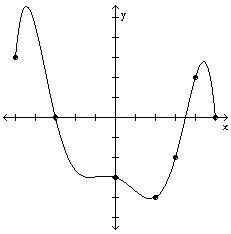
Answer: D
215) Is f(40) positive or negative?
50 -5050 -50

A) positive
Answer: A
216) Is f(20) positive or negative?
50 -5050 -50

A) positive
Answer: B
B) negative
B) negative
217) For what numbers x is f(x) = 0?
-100100 -100
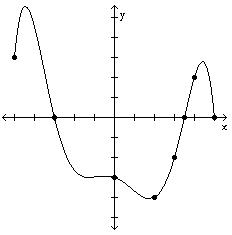
A) (-100, -60), (70, 100) B) -60 C) (-60, 70) D) -60, 70, 100
Answer: D
218) For what numbers x is f(x) > 0? 5 -55 -5

Answer: B
219) For what numbers x is f(x) < 0?
-100100 -100

A) (-60, 70)
C) (-60, ∞)
Answer: A
220) What is the domain of f? 10 -1010 -10

A) all real numbers B) {x|-8 ≤ x ≤ 11}
Answer: D
B) (-∞ , -60)
D) [-100, -60), (70, 100)
C) {x|x ≥ 0} D) {x|-10 ≤ x ≤ 10}
221) What are the x-intercepts?
-2020 -20

A) -12, 14
Answer: C
B) -12
222) What is the y-intercept? 50 -5050 -50

A) -30
Answer: A
B) 50
C) -12, 14, 20
D) -20, -12, 14, 20
C) 35 D) -40
223) How often does the line y = -10 intersect the graph?

1010 -10
A) once B) twice C) three times D) does not intersect
Answer: D
224) How often does the line y = 5 intersect the graph? 25 -2525 -25

A) once B) twice C) three times D) does not intersect Answer: C
225) For which of the following values of x does f(x) = 2?

-55 -5
A) 5 B) 4
Answer: B
Answer the question about the given function.
C) 2 D) 7
226) Given the function f(x) = -4x2 + 8x + 8, is the point (1, 12) on the graph of f?
A) Yes B) No
Answer: A
227) Given the function f(x) = -7x2 - 14x + 7, is the point (-2, -7) on the graph of f?
A) Yes B) No
Answer: B
228) Given the function f(x) = -2x2 - 4x - 1, if x = -1, what is f(x)? What point is on the graph of f? A) 1; (-1, 1) B) 1; (1, -1) C) -7; (-1, -7) D) -7; (-7, -1)
Answer: A
229) Given the function f(x) = 5x2 + 10x - 6, what is the domain of f? A) all real numbers B) {x|x ≥-1} C) {x|x ≥ 1} D) {x|x ≤ -1}
Answer: A
230) Given the function f(x) = x2 + 7x - 30, list the x-intercepts, if any, of the graph of f. A) (10, 0), (-3, 0) B) (-10, 0), (1, 0) C) (-10, 0), (3, 0) D) (10, 0), (3, 0)
Answer: C
231) Given the function f(x) = 7x2 + 14x + 2, list the y-intercept, if there is one, of the graph of f. A) 2 B) 16 C) -5 D) 23
Answer: B
232) Given the function f(x) = x2 - 2 x - 3 , is the point (-2,2 5 ) on the graph of f?
A) Yes B) No
Answer: A
233) Given the function f(x) = x2 - 6 x - 1 , is the point (2, 10) on the graph of f?
A) Yes B) No
Answer: B
234) Given the function f(x) = x2 - 5 x + 1 , if x = 2, what is f(x)? What point is on the graph of f?
A)1 3 ; (1 3 , 2) B)1 3 ; (2,1 3 ) C) 3; (3, 2)
Answer: B
235) Given the function f(x) = x2 + 8 x - 9 , what is the domain of f?
A) {x|x ≠ 9}
Answer: A
B) {x|x ≠ 8 9 }
C) {x|x ≠ -9}
236) Given the function f(x) = x2 + 6 x - 4 , list the x-intercepts, if any, of the graph of f.
A) (- 6, 0)
Answer: D
B) (6, 0), (-6, 0)
C) (4, 0)
237) Given the function f(x) = x2 + 3 x + 9 , list the y-intercept, if there is one, of the graph of f.
A) (0, 1 3 ) B) (0, -3)
Answer: A
Solve the problem.
C) (0, -9)
3; (2, 3)
D) {x|x ≠ 8}
D) none
D) (1 3 , 0)
238) If an object weighs m pounds at sea level, then its weight W (in pounds) at a height of h miles above sea level is given approximately by W(h) = m 4000 4000 + h 2 . How much will a man who weighs 165 pounds at sea level weigh on the top of a mountain which is 14,494 feet above sea level? Round to the nearest hundredth of a pound, if necessary.
A) 165.23 pounds B) 164.77 pounds C) 165 pounds D) 7.72 pounds
Answer: B
Match the function with the graph that best describes the situation.
239) The amount of rainfall as a function of time, if the rain fell more and more softly.
Answer: C
240) The height of an animal as a function of time.
Answer: C
SHORT ANSWER. Write the word or phrase that best completes each statement or answers the question.
Solve the problem.
241) Michael decides to walk to the mall to do some errands. He leaves home, walks 4 blocks in 12 minutes at a constant speed, and realizes that he forgot his wallet at home. So Michael runs back in 8 minutes. At home, it takes him 3 minutes to find his wallet and close the door. Michael walks 3 blocks in 10 minutes and then decides to jog to the mall. It takes him 8 minutes to get to the mall which is 4 blocks away. Draw a graph of Michael's distance from home (in blocks) as a function of time.
MULTIPLE CHOICE. Choose the one alternative that best completes the statement or answers the question.
242) A steel can in the shape of a right circular cylinder must be designed to hold 400 cubic centimeters of juice (see figure). It can be shown that the total surface area of the can (including the ends) is given by S(r) = 2πr2 + 800 r , where r is the radius of the can in centimeters. Using the TABLE feature of a graphing utility, find the radius that minimizes the surface area (and thus the cost) of the can. Round to the nearest tenth of a centimeter.

A) 5.2 cm
Answer: B
B) 4 cm
C) 0 cm
D) 3.2 cm
243) The concentration C (arbitrary units) of a certain drug in a patient's bloodstream can be modeled using C(t) = t 0.506t + 1.975 2 , where t is the number of hours since a 500 milligram oral dose was administered. Using the TABLE feature of a graphing utility, find the time at which the concentration of the drug is greatest. Round to the nearest tenth of an hour.
A) 4.7 hours
Answer: D
B) 6.2 hours
C) 5.4 hours
The graph of a function is given. Decide whether it is even, odd, or neither. 244)
x-10-8-6-4-2246810
A) even
Answer: A
B) odd
C) neither
D) 3.9 hours
A) even B) odd C) neither Answer: A 246)
A) even B) odd C) neither Answer: C 247) x
odd C) neither Answer: C
A) even B) odd C) neither Answer: B
A) even B) odd C) neither Answer: B 250)
A) even B) odd C) neither Answer: B
A) even B) odd
C) neither Answer: A
Determine algebraically whether the function is even, odd, or neither.
252) f(x) = 5x3
A) even B) odd
C) neither Answer: B
253) f(x) = -4x4 - x2
A) even B) odd
C) neither Answer: A
254) f(x) = -9x2 - 2
A) even B) odd
C) neither Answer: A
255) f(x) = 2x3 + 4
A) even B) odd
C) neither Answer: C
256) f(x) = 3 x
A) even B) odd
C) neither Answer: B
257) f(x) = x A) even B) odd
C) neither Answer: C
258) 3 7x2 + 4
A) even B) odd
C) neither Answer: A
259) f(x) = 1 x2
A) even B) odd
C) neither Answer: A
260) f(x) = x x2 + 3
A) even B) odd
C) neither Answer: B
261) f(x) = -x3 7x2 - 9
A) even B) odd
C) neither Answer: B
262) f(x) = -5x |x|
A) even B) odd
C) neither Answer: B
The graph of a function is given. Determine whether the function is increasing, decreasing, or constant on the given interval.
263) (- 2, - 1) x-55 y 5 -5
A) constant
B) decreasing
C) increasing Answer: B
264) (- 1, 0)
A) decreasing
B) constant C) increasing Answer: C
265) (0, 1) -55x y 5 -5
A) constant
B) increasing C) decreasing Answer: C
266) (1, 2) -55x y 5 -5
A) increasing B) constant C) decreasing Answer: A
267) (0, 3)
x-10-5510 y 10
A) decreasing
B) constant C) increasing Answer: B
268) (-1, 0)
x-10-5510 y 10 5 -5 -10
A) increasing
B) constant C) decreasing Answer: A
269) (3, ∞)
x-10-5510 y 10 5 -5 -10
A) increasing B) constant C) decreasing Answer: C
(-3, ∞)
A) decreasing B) increasing C) constant Answer: B
(1, 2)
A) decreasing B) constant C) increasing Answer: C
272) (-5, -3) x-55 y 5
A) increasing B) decreasing C) constant Answer: C
(-6,2)
273) (-1, 0) x-55 y 5 -5
(-2.5,0)
(-1,-2)(0,-2) (2,0) (5,-4)
A) decreasing B) constant C) increasing Answer: B
274) (5, ∞) x-1010 y 10 -10
(-9.5,0)
(-8,5) (-5,0) (0,0) (4,0) (5,-2.5)
(-2.5,-3.3) (2.2,3.9)
A) increasing
B) constant C) decreasing Answer: A
Use the graph to find the intervals on which it is increasing, decreasing, or constant.


A) Increasing on (-∞, 0); decreasing on (0, ∞)
C) Decreasing on (-∞, 0); increasing on (0, ∞)
Answer: A 276)
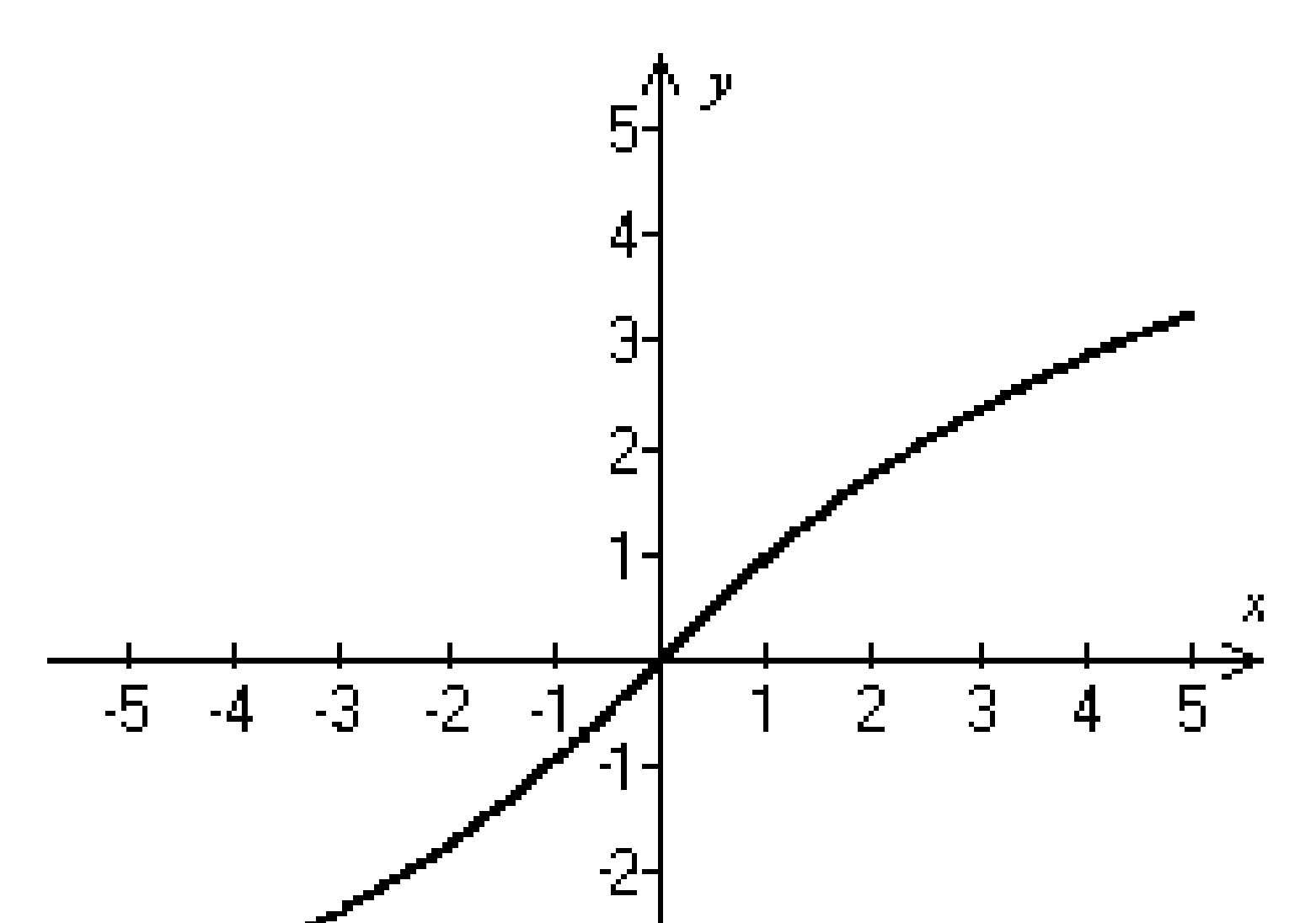

A) Decreasing on (-∞ , ∞)
C) Increasing on (-∞, 0); decreasing on (0, ∞)
Answer: D
B) Decreasing on (-∞ , ∞)
D) Increasing on (-∞ , ∞)
B) Decreasing on (-∞, 0); increasing on (0, ∞)
D) Increasing on (-∞ , ∞)
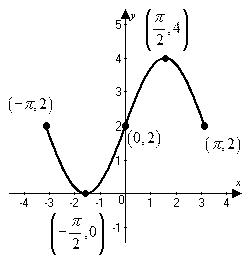
A) Increasing on (-∞ , ∞)
B) Increasing on - π,π 2 and π 2 , π ; decreasing onπ 2 , π 2
C) Decreasing on - π,π 2 and π 2 , π ; increasing onπ 2 , π 2
D) Decreasing on - π, 0 ; increasing on 0, π
Answer: C
278)
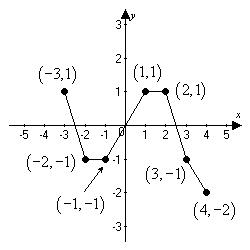
A) Decreasing on (-3, -2) and (2, 4); increasing on (-1, 1); constant on (-2, -1) and (1, 2)
B) Decreasing on (-3, -1) and (1, 4); increasing on (-2, 1)
C) Decreasing on (-3, -2) and (2, 4); increasing on (-1, 1)
D) Increasing on (-3, -2) and (2, 4); decreasing on (-1, 1); constant on (-2, -1) and (1, 2)
Answer: A
The graph of a function f is given. Use the graph to answer the question.
279) Find the numbers, if any, at which f has a local maximum. What are the local maxima? x-5-4-3-2-112345
A) f has a local maximum at x = 0; the local maximum is 2
B) f has a local maximum at x = 2; the local maximum is 2
C) f has a local maximum at x = -2 and 2; the local maximum is 0
D) f has no local maximum
Answer: A
280) Find the numbers, if any, at which f has a local minimum. What are the local minima? x-5-4-3-2-112345
A) f has a local minimum at x = 0; the local minimum is 3
B) f has a local minimum at x = -3 and 3; the local minimum is 0
C) f has a local minimum at x = -3; the local minimum is 0
D) f has no local minimum
Answer: B
281) Find the numbers, if any, at which f has a local maximum. What are the local maxima?
A) f has a local maximum at x = -π and π; the local maximum is -1
B) f has a local maximum at -π; the local maximum is 1
C) f has a local maximum at x = 0; the local maximum is 1
D) f has no local maximum
Answer: C
282) Find the numbers, if any, at which f has a local minimum. What are the local minima?
A) f has no local minimum
B) f has a local minimum at x = -π; the local minimum is -2
C) f has a local minimum at x = 0; the local minimum is -2
D) f has a local minimum at x = -π and π; the local minimum is 2
Answer: C
5)
0) (-2.5,-3.3) (2.2,3.9)
0) (0,0) (4,0) (5,-2.5)
Find the numbers, if any, at which f has a local minimum. What are the local maxima?
A) f has a local maximum at x = -3.3 and -2.5; the local maximum at -3.3 is -2.5; the local maximum at -2.5 is 5
B) f has a local maximum at x = -2.5 and 5; the local maximum at -2.5 is -3.3; the local maximum at 5 is -2.5
C) f has a local minimum at x = -3.3 and -2.5; the local minimum at -3.3 is -2.5; the local minimum at -2.5 is 5
D) f has a local minimum at x = -2.5 and 5; the local minimum at -2.5 is -3.3; the local minimum at 5 is -2.5
Answer: D
Solve the problem.
284) The height s of a ball (in feet) thrown with an initial velocity of 80 feet per second from an initial height of 8 feet is given as a function of time t (in seconds) by s(t) = -16t2 + 80t + 8. What is the maximum height? Round to the nearest hundredth, if necessary.
Answer: B
For the graph of the function y = f(x), find the absolute maximum and the absolute minimum, if it exists. 285)
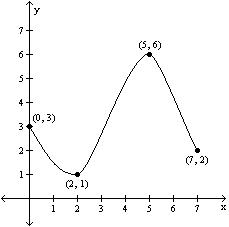
A) Absolute maximum: f(2) = 7; Absolute minimum: f(3) = 0
B) Absolute maximum: f(6) = 5; Absolute minimum: f(1) = 2
C) Absolute maximum: f(7) = 2; Absolute minimum: f(0) = 3
D) Absolute maximum: f(5) = 6; Absolute minimum: f(2) = 1
Answer: D
286)
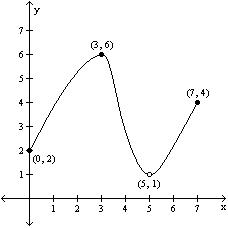
A) Absolute maximum: f(7) = 4; Absolute minimum: f(0) = 2
B) Absolute maximum: f(3) = 6; Absolute minimum: f(0) = 2
C) Absolute maximum: f(3) = 6; Absolute minimum: f(5) = 1
D) Absolute maximum: f(3) = 6; Absolute minimum: none
Answer: D
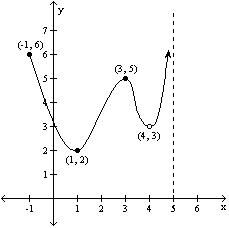
A) Absolute maximum: f(3) = 5; Absolute minimum: f(1) = 2
B) Absolute maximum: none; Absolute minimum: f(1) = 2
C) Absolute maximum: f(-1) = 6; Absolute minimum: f(1) = 2
D) Absolute maximum: none; Absolute minimum: none
Answer: B
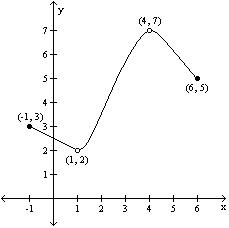
A) Absolute maximum: f(4) = 7; Absolute minimum: none
B) Absolute maximum: f(4) = 7; Absolute minimum: f(1) = 2
C) Absolute maximum: none; Absolute minimum: f(1) = 2
D) Absolute maximum: none; Absolute minimum: none
Answer: D
Use a graphing utility to graph the function over the indicated interval and approximate any local maxima and local minima. Determine where the function is increasing and where it is decreasing. If necessary, round answers to two decimal places.
289) f(x) = x3 - 3x + 1, (-2, 2)
A) local maximum at (-1, 3)
local minimum at (1, -1) increasing on (-1, 1) decreasing on (-2, -1) and (1, 2)
C) local maximum at (1, -1)
local minimum at (-1, 3) increasing on (-2, -1) decreasing on (-1, 1)
Answer: D
B) local maximum at (1, -1)
local minimum at (-1, 3) increasing on (-2, -1) and (1, 2) decreasing on (-1, 1)
D) local maximum at (-1, 3) local minimum at (1, -1) increasing on (-2, -1) and (1, 2) decreasing on (-1, 1)
SHORT ANSWER. Write the word or phrase that best completes each statement or answers the question.
290) f(x) = x3 - 4x2 + 6; (-1, 4)
Answer: local maximum at (0, 6) local minimum at (2.67, -3.48) increasing on (-1, 0) and (2.67, 4) decreasing on (0, 2.67)
291) f(x) = x5 - x2; (-2, 2)
Answer: local maximum at (0, 0) local minimum at (0.74, -0.33) increasing on (-2, 0) and (0.74, 2) decreasing on (0, 0.74)
292) f(x) = -0.3x3 + 0.2x2 + 4x - 5; (-4, 5)
Answer: local maximum at (2.34, 1.61) local minimum at (-1.9, -9.82) increasing on (-1.9, 2.34) decreasing on (-4, -1.9) and (2.34, 5)
293) f(x) = 0.15x4 + 0.3x3 - 0.8x2 + 5; (-4, 2)
Answer: local maximum at (0, 5) local minima at (-2.55, 1.17) and (1.05, 4.65) increasing on (-2.55, 0) and (1.05, 2) decreasing on (-4, -2.55) and (0, 1.05)
MULTIPLE CHOICE. Choose the one alternative that best completes the statement or answers the question.
Use a graphing utility to graph the function over the indicated interval and approximate any local maxima and local minima. If necessary, round answers to two decimal places.
294) f(x) = x2 + 2x - 3; (-5, 5)
A) local maximum at (1, -4)
C) local maximum at (-1, 4)
Answer: B
B) local minimum at (-1, -4)
D) local minimum at (1, 4)
295) f(x) = 2 + 8x - x2; (-5, 5)
A) local minimum at (-4, 18)
C) local minimum at (4, 50)
Answer: B
296) f(x) = x3 - 3x2 + 1; (-5, 5)
A) local minimum at (0, 1) local maximum at (2, -3)
C) local maximum at (0, 1) local minimum at (2, -3)
Answer: C
297) f(x) = x3 - 12x + 2; (-5, 5)
A) local maximum at (-2, 18) local minimum at (0, 0) local minimum at (2, -14)
C) local maximum at (-2, 18) local minimum at (2, -14)
Answer: C
298) f(x) = x4 - 5x3 + 3x2 + 9x - 3; (-5, 5)
A) local minimum at (-0.61, -5.64) local maximum at (1.41, 6.12) local minimum at (3, -3)
C) local minimum at (-0.57, -6.12) local maximum at (1.32, 5.64) local minimum at (3, -3)
Answer: C
Solve.
B) local maximum at (4, 18)
D) local maximum at (-4, 50)
B) local minimum at (2, -3)
D) none
B) local minimum at (0, 0)
D) none
B) local minimum at (-1, -6) local maximum at (1, 6) local minimum at (3, -3)
D) local minimum at (-3, -3) local maximum at (-1.32, 5.64) local minimum at (0.57, -6.12)
299) John owns a hotdog stand. He has found that his profit is represented by the equation P(x) = -x2 + 60x + 79, with P being profits and x the number of hotdogs sold. How many hotdogs must he sell to earn the most profit?
A) 49 hotdogs
Answer: C
B) 31 hotdogs
C) 30 hotdogs D) 24 hotdogs
300) Bob owns a watch repair shop. He has found that the cost of operating his shop is given by c(x) = 4x2 - 312x + 55, where c is cost and x is the number of watches repaired. How many watches must he repair to have the lowest cost?
A) 55 watches
Answer: B
B) 39 watches
C) 27 watches
D) 40 watches
301) John owns a hotdog stand. His profit is represented by the equation P(x) = -x2 + 14x + 59, with P being profits and x the number of hotdogs sold. What is the most he can earn?
A) $150
Answer: B
B) $108
C) $87
D) $49
302) A rock falls from a tower that is 142.1 m high. As it is falling, its height is given by the formula h(t) = 142.1 - 4.9t2 How many seconds will it take for the rock to hit the ground (h=0)? Round to the nearest tenth. A) 4100 sec
Answer: C
303) A projectile is thrown upward so that its distance above the ground after t seconds is h(t) = -16t2 + 240t. After how many seconds does it reach its maximum height? Round to the nearest second. A) 6 sec B) 8 sec
24 sec
18 sec
Answer: B
304) A rock falls from a tower that is 464 ft high. As it is falling, its height is given by the formula h(t) = 464 - 16t2. How many seconds will it take for the rock to hit the ground (h=0)? Round to the nearest tenth. A) 13,456
Answer: C
For the function, find the average rate of change of f from 1 to x: f(x) - f(1) x - 1 , x ≠ 1
305) f(x) = 3x A) 3 x - 1 B) 3
Answer: B
306) f(x) = x2 - 2x
Answer: A 307)
Answer: B
308) f(x) = x + 35
Answer: D
Find the average rate of change for the function between the given values.
309) f(x) = -3x + 6; from 1 to 2 A) 6
Answer: C
-6
0
2
3
310) f(x) = x2 + 5x; from 1 to 4
Answer: C
311) f(x) = 2x3 + 7x2 - 3; from 5 to 7
513
Answer: D
312) f(x) = 2x; from 2 to 8
3 10
Answer: D
313) f(x) = 3 x - 2; from 4 to 7
Answer: D 314) f(x) = 4x2; from 0 to 7 4
1 3
Answer: B 315) f(x) = -3x2 - x; from 5 to 6
Answer:
Answer: D 318) f(x) = 3 x + 2; from 1 to 4
1 6
Answer: A
Find an equation of the secant line containing (1, f(1)) and (2, f(2)).
319) f(x) = x3 + x A) y = -8x + 6
Answer: D
320) f(x) = 3 x + 2
y = 8x + 6
y = -8x - 6
y = 8x - 6
Answer: A
321) f(x) = x + 48
A) y = (52 - 7)x - 52 + 14 B) y = (-52 - 7)x - 52 + 14
C) y = (52 - 7)x + 52 - 14 D) y = (-52 + 7)x + 52 - 14
Answer: A
Solve the problem.
322) From April through December 2000, the stock price of QRS Company had a roller coaster ride. The chart below indicates the price of the stock at the beginning of each month during that period. Find the monthly average rate of change in price between June and September.
MonthPrice
April (x = 1)114
May108
June88
July99
August94
September111
October91
November85
December64 A) $11.50 per month B) -$11.50 per month C) $7.67 per month D) -$7.67 per month Answer: C
323) Along with incomes, people's charitable contributions have steadily increased over the past few years. The table below shows the average deduction for charitable contributions reported on individual income tax returns for the period 1993 to 1998. Find the average rate of change between 1995 and 1997.
YearCharitable Contributions
1993$1660
1994$2350
1995$2450
1996$2800
1997$3040
1998$3150
A) $350 per year B) $295 per year C) $590 per year D) $345 per year
Answer: B
324) A deep sea diving bell is being lowered at a constant rate. After 12 minutes, the bell is at a depth of 400 ft. After 40 minutes the bell is at a depth of 1500 ft. What is the average rate of lowering per minute? Round to the nearest hundredth is needed.
A) 37.5 ft per minute B) 39.3 ft per minute C) 0.03 ft per minute D) 27.5 ft per minute
Answer: B
Match the graph to the function listed whose graph most resembles the one given. 325)
A) cube function
B) absolute value function
C) square function D) reciprocal function
Answer: C
326)
A) reciprocal function
B) linear function
C) absolute value function D) constant function
Answer: D
327)
A) square function
B) cube function
C) cube root function D) square root function
Answer: D
328)
A) reciprocal function
B) linear function
C) absolute value function D) square function
Answer: C
A) constant function
C) linear function
Answer: C
330)
B) reciprocal function
D) absolute value function
A) cube function
C) cube root function
Answer: A
331)
B) square root function
D) square function
A) square root function
B) reciprocal function
C) absolute value function D) square function
Answer: B
332)
A) square function
B) cube root function
C) square root function D) cube function
Answer: B
Graph the function.
Answer: A
Answer: A
Answer: A
Answer: C
Answer: A
Answer: A
Answer: D
Answer: A
Answer: D
Answer: A
Answer: C
f(x) = x + 3if -8 ≤ x < 2 -8if x = 2 -x + 4if x > 2 x -10-5510 y 10 5 -5 -10 A) x -10-5510 y 10 5 -5 -10 (-8,-5) (2,5) (2,-8) (2,2)
x -10-5510 y 10 5 -5 -10 (-8,-4) (2,6) (2,-8) (2,2) C) x -10-5510 y 10 5 -5 -10 (-8,-5) (2,5) (2,-8) (2,2)
Answer: C
x -10-5510 y 10 5 -5 -10 (-8,-4) (2,6) (2,-8) (2,2)
f(x) = 1if -1 ≤ x < 6 |x|if 6 ≤ x < 8 3 x if 8 ≤ x ≤ 14 x-10-551015 y10 5 -5 -10
Answer: A
Find the domain of the function.
346)
f(x) = -4xif x ≠ 0 -1if x = 0
A) {x|x ≠ 0}
Answer: B
347)
f(x) =
1if -3 ≤ x < -1
|x|if -1 ≤ x < 3
x if 3 ≤ x ≤ 24
A) {x|3 ≤ x ≤ 24}
C) {x|-3 ≤ x ≤ 24}
Answer: C
Locate any intercepts of the function.
348)
f(x) = -2x + 7if x < 1 7x - 2if x ≥ 1
B) all real numbers
C) {0}
B) {x|x ≥ -3}
D) {x|-3 ≤ x < 3 or 3 < x ≤ 24}
D) {x|x ≤ 0}
A) (0, 7) B) (0, -2), (7 2 , 0), (2 7 , 0) C) (0, 7), (7 2 , 0), (2 7 , 0) D) (0, -2)
Answer: A
349)
f(x) = 1if -4 ≤ x < -2
|x|if -2 ≤ x < 4
x if 4 ≤ x ≤ 29
A) (0, 0), (1, 0)
Answer: C
B) (0, 0), (0, 1)
C) (0, 0)
D) none
Based on the graph, find the range of y = f(x).
350)
f(x) = 1 4 xif x ≠ 0
6if x = 0 x-10-55 y10 5 -5 -10 (0,6)
A) (-∞, 0) or {0} or (0, ∞)
B) (-∞, 0) or (0, ∞) C) (-10, 10) D) (-∞ , ∞)
Answer: B
351)
f(x) = 4if -4 ≤ x < -3 |x|if -3 ≤ x < 5 3 x if 5 ≤ x ≤ 13 x-10-551015 y10 5 -5 -10 (-4,4) (-3,4) (-3,3) (5,5) (5,1.7) (13,2.4)
Answer: D
The graph of a piecewise-defined function is given. Write a definition for the function.
352) x-55 y 5 -5 (-4,2) (3,3)
A)
f(x) = 1 2 xif -4 < x < 0 xif 0 < x < 3
f(x) =1 2 xif -4 < x < 0 xif 0 < x < 3 C)
f(x) = -2xif -4 ≤ x ≤ 0 xif 0 < x ≤ 3
Answer: D
353) x-55 y 5 -5 (0,1) (3,4) (3,2) (5,3)
A)
f(x) = x + 1if 0 ≤ x ≤ 3 1 2 x + 2if 3 < x ≤ 5 B)
f(x) =1 2 xif -4 ≤ x ≤ 0 xif 0 < x ≤ 3
C)
f(x) = x + 1if 0 ≤ x ≤ 3 1 2 x1 2 if 3 < x ≤ 5
Answer: D
f(x) = x + 1if 0 ≤ x ≤ 3 1 2 xif 3 < x ≤ 5
f(x) = x + 1if 0 ≤ x ≤ 3 1 2 x + 1 2 if 3 < x ≤ 5
(-3,0) (0,4) (3,2)
x-55 y 5 -5
A)
f(x) = 3 4 x + 4if -3 ≤ x ≤ 0 3 2 xif 0 < x ≤ 3
C)
B)
f(x) = 4 3 x - 4if -3 ≤ x ≤ 0 2 3 xif 0 ≤ x ≤ 3
f(x) = 4 3 x + 4if -3 ≤ x ≤ 0 2 3 x + 2if 0 < x ≤ 3 D)
Answer: D
f(x) = 4 3 x + 4if -3 ≤ x ≤ 0 2 3 xif 0 < x ≤ 3
=
Answer: D
Solve the problem.
356) If f(x) = int(3x), find f(1.4).
4
Answer: A
5
1
SHORT ANSWER. Write the word or phrase that best completes each statement or answers the question.
357) A gas company has the following rate schedule for natural gas usage in single-family residences: Monthly service charge $8.80 Per therm service charge 1st 25 therms$0.6686/therm Over 25 therms$0.85870/therm
What is the charge for using 25 therms in one month?
What is the charge for using 45 therms in one month? Construct a function that gives the monthly charge C for x therms of gas.
Answer: $25.52
$42.69
C(x) = 8.8 + 0.6686xif 0 ≤ x ≤ 25 4.0475 + 0.8587xif x > 25
358) An electric company has the following rate schedule for electricity usage in single-family residences:
Monthly service charge $4.93
Per kilowatt service charge
1st 300 kilowatts$0.11589/kW
Over 300 kilowatts$0.13321/kW
What is the charge for using 300 kilowatts in one month?
What is the charge for using 375 kilowatts in one month?
Construct a function that gives the monthly charge C for x kilowatts of electricity.
Answer: $39.70
$49.69
C(x) = 4.93 + 0.11589x -0.266 + 0.13321x if 0 ≤ x ≤ 300 if x > 300
359) One Internet service provider has the following rate schedule for high-speed Internet service:
Monthly service charge$18.00
1st 50 hours of usefree
Next 50 hours of use$0.25/hour
Over 100 hours of use$1.00/hour
What is the charge for 50 hours of high-speed Internet use in one month?
What is the charge for 75 hours of high-speed Internet use in one month?
What is the charge for 135 hours of high-speed Internet use in one month?
Answer: $18.00
$24.25
$65.50
360) The wind chill factor represents the equivalent air temperature at a standard wind speed that would produce the same heat loss as the given temperature and wind speed. One formula for computing the equivalent temperature is W(t) = t 33(10.45 + 10v - v)(33 - t ) 22.04 33 - 1.5958(33 - t)
where v represents the wind speed (in meters per second) and t represents the air temperature (°C). Compute the wind chill for an air temperature of 15°C and a wind speed of 12 meters per second. (Round the answer to one decimal place.)
Answer: 6.0°C
361) A cellular phone plan had the following schedule of charges:
Basic service, including 100 minutes of calls$20.00 per month
2nd 100 minutes of calls$0.075 per minute
Additional minutes of calls$0.10 per minute
What is the charge for 200 minutes of calls in one month?
What is the charge for 250 minutes of calls in one month?
Construct a function that relates the monthly charge C for x minutes of calls.
Answer: $27.50 $32.50;
MULTIPLE CHOICE. Choose the one alternative that best completes the statement or answers the question.
Match the correct function to the graph.
Write the equation of a sine function that has the given characteristics.
364) The graph of y = x2, shifted 6 units upward
A) y = x2 + 6
Answer: A
y = x2 - 6
365) The graph of y = x , shifted 6 units to the right
A) y = x - 6 B) y = x - 6
Answer: A
366) The graph of y = x , shifted 5 units upward
A) y = x + 5 B) y = x - 5
Answer: C
367) The graph of y = x, shifted 3 units to the right
A) y = x - 3 B) y = x + 3
y = 6x2
y = x2 6
y = x - 3
y = x + 3 Answer: C
368) The graph of y = x, shifted 2 units to the left
A) y = x - 2
Answer: D
y = x + 2
369) The graph of y = x, shifted 5 units upward A) y = x - 5 B) y = x + 5
Answer: C
370) The graph of y = x, shifted 7 units downward A) y = x - 7
y = x + 7
y = x + 5
y = x - 5
Answer: D
Suppose the point (2, 4) is on the graph of y = f(x). Find a point on the graph of the given function.
371) y = f(x + 3)
A) (2, 7) B) (2, 1)
(-1, 4)
(5, 4) Answer: C
372) f(x) + 4
A) (2, -4) B) (-2, 4)
(6, 4)
(2, 8) Answer: D
Solve the problem.
373) Suppose that the x-intercepts of the graph of y = f(x) are 7 and 3. What are the x-intercepts of y = f(x + 9)?
A) 16 and 12 B) 7 and 12 C) -2 and -6 D) 63 and 27
Answer: C
374) Suppose that the x-intercepts of the graph of y = f(x) are 8 and 6. What are the x-intercepts of y = f(x - 4)?
A) 8 and 2
Answer: C
B) 32 and 24
C) 12 and 10
D) 4 and 2
375) Suppose that the function y = f(x) is increasing on the interval (6, 8). Over what interval is the graph of y = f(x + 7) increasing?
A) (13, 15)
Answer: C
B) (42, 56)
C) (-1, 1)
D) (6, 8)
376) Suppose that the function y = f(x) is increasing on the interval (2, 4). Over what interval is the graph of y = f(x - 6) increasing?
A) (12 , 24)
Answer: D
B) (2, 4)
C) (-4, -2)
D) (8, 10)
Graph the function by starting with the graph of the basic function and then using the techniques of shifting, compressing, stretching, and/or reflecting.
377) f(x) = x2 + 4
Answer: C
378) f(x) = (x - 2)2
Answer: A
379) f(x) = (x + 1)2 + 6
Answer: D 380) f(x) = x3 + 4
Answer: D
381) f(x) = (x + 3)3
Answer: A
382) f(x) = (x + 2)3 - 4
Answer: C
Answer: C 384) f(x) = x - 5
Answer: C
Answer: B 386) f(x) = x + 1 - 2
Answer: C 387) f(x) = |x| + 4
Answer: D 388) f(x) = |x - 5|
Answer: A 389) f(x) = |x + 5| - 7
Answer: D 390) f(x) = 1 x - 4
Answer: C
391) f(x) = 1 x - 1
Answer: C
392) f(x) = 1 x + 3 + 1
Answer: D
Using transformations, sketch the graph of the requested function.
393) The graph of a function f is illustrated. Use the graph of f as the first step toward graphing the function F(x), where F(x) = f(x + 2) - 1.
Answer: B
Complete the square and then use the shifting technique to graph the function. 394) f(x) = x2 - 12x
Answer: A 395) f(x) = x2 + 2x - 8
Answer: D
Solve the problem.
396) The following numerical representation for f computes the average number of hours of television watched per day based on year of birth x.
x 1975198019831988199019921995
2 2.5 3 3.5 4 3.5 4
Give a numerical representation for a function g that computes the average number of hours of television watched per day for the year x, where x = 0 corresponds to the birth year 1975. Write an equation that shows the relationship between f(x) and g(x).
A) x 0 5 8 13 15 17 20 g(x) 22.533.543.54
f(x) = g(x + 1975) B) x 75 80 83 88 90 92 95 g(x) 22.533.543.54
C) x 0 5 8 13 15 17 20
f(x) = g(x) - 1975
Answer: D
f(x) = g(x - 1900)
= g(x - 1975)
397) Suppose a cold front is passing through the United States at noon with a shape described by the function y = 1 30x2, where each unit represents 100 miles. St. Louis, Missouri is located at (0, 0), and the positive y-axis points north. N
Suppose the front moves south 340 miles and west 120 miles and maintains its shape. Give the equation for the new front and plot the new position of the front.
Answer: B
Write the equation that results in the desired transformation.
398) The graph of y = x2, vertically stretched by a factor of 10
A) y = (x - 10)2 B) y = -10x2 C) y = 10x2
Answer: C
399) The graph of y = x3, vertically compressed by a factor of 0.4
y = (x + 0.4)3
Answer: C
y = 10(x - 10)x2
y = (x - 0.4)3
y = 0.4x3
Suppose the point (2, 4) is on the graph of y = f(x). Find a point on the graph of the given function.
400) y = 4f(x)
A) (5, 3) B) (3, 8) C) (8, 4) D) (2, 16)
Answer: D
Solve the problem.
401) Suppose that the x-intercepts of the graph of y = f(x) are 7 and 5. What are the x-intercepts of y = 9f(x)?
A) 35 and 45
Answer: C
B) 16 and 14
C) 7 and 5
D) -2 and -4
Graph the function by starting with the graph of the basic function and then using the techniques of shifting, compressing, stretching, and/or reflecting.
402) f(x) = 2x2
Answer: D
Answer: A
Answer: A
Answer: B
Answer: C
Answer: D
Answer: C
Answer: B
Answer: B
Answer: A
412) f(x) = 3(x + 1)2 + 3
Answer: B
Use the accompanying graph of y = f(x) to sketch the graph of the indicated equation.
Answer: A
414) y =1 2 f(x)
Answer: C
-4)
-4)
2) (6,0)
-2)
4) (6,0) (3,4)
Answer: A
Match the correct function to the graph. 416)
A) y = -2x2
Answer: D
B) y = -2x2 - 1
C) y = 1 - x2
Suppose the point (2, 4) is on the graph of y = f(x). Find a point on the graph of the given function.
417) The reflection of the graph of y = f(x) across the x-axis
A) (-2, -4)
Answer: B
B) (2, -4)
418) The reflection of the graph of y = f(x) across the y-axis
A) (2, 4)
Answer: B
Solve the problem.
B) (-2, 4)
C) (2, 4)
D) y = -2x2 + 1
D) (-2, 4)
C) (-2, -4)
D) (2, -4)
419) Suppose that the x-intercepts of the graph of y = f(x) are 6 and 2. What are the x-intercepts of y = f(-x)?
A) 6 and -2
Answer: C
B) -6 and 2
C) -6 and -2
D) 6 and 2
420) Suppose that the function y = f(x) is decreasing on the interval (6, 3). What can be said about the graph of y = -f(x)?
A) increasing on (6, 3) B) increasing on (-6, -3) C) decreasing on (6, 3) D) decreasing on (-6, -3)
Answer: A
Find the function.
421) Find the function that is finally graphed after the following transformations are applied to the graph of y = |x|. The graph is shifted right 3 units, stretched by a factor of 3, shifted vertically down 2 units, and finally reflected across the x-axis.
A) y = -3|x - 3| - 2 B) y = 3|-x - 3| - 2
Answer: D
C) y = -(3|x + 3| - 2)
D) y = -(3|x - 3| - 2)
422) Find the function that is finally graphed after the following transformations are applied to the graph of y = x. The graph is shifted up 2 units, reflected about the y-axis, and finally shifted left 5 units.
A) y =-x - 5 - 2 B) y =-x + 5 - 2
Answer: D
C) y = - x + 5 + 2
D) y =-x - 5 + 2
423) Find the function that is finally graphed after the following transformations are applied to the graph of y = x The graph is shifted down 6 units, reflected about the x-axis, and finally shifted right 5 units.
Answer: D
Graph the function by starting with the graph of the basic function and then using the techniques of shifting, compressing, stretching, and/or reflecting.
424) f(x) = -x2
Answer: B
Answer: A
Answer: D
Answer: C
Answer: C
Answer: C
Answer: D
Answer: D
Answer: C
Answer: A
434) f(x) = -3(x + 1)2 + 2
Answer: B
Indicate whether the function is one-to-one.
435) {(-19, -9), (2, 12), (11, -5)} A) Yes B) No
Answer: A
436) {(13, 4), (-1, 4), (16, 18)} A) Yes B) No
Answer: B
437) {(2, -7), (3, -7), (4, -6), (5, 7)}
A) Yes
B) No Answer: B
438) {(6, -8), (11, -7), (9, -6), (7, -5)}
A) Yes
B) No Answer: A
439) {(-5, -9), (9, 5), (-7, -1), (7, 1)}
A) Yes
B) No Answer: A
Use the horizontal line test to determine whether the function is one-to-one. 440) x y
A) Yes
B) No Answer: A
441)
A) Yes B) No Answer: B
A) Yes B) No Answer: A
A) Yes B) No Answer: B
A) Yes B) No Answer: B
x
A) Yes
Answer: A
Find the inverse of the function and state its domain and range .
446) {(10, -6), (8, -5), (6, -4), (4, -3)}
B) No
A) 10,1 6 , 8,1 5 , 6,1 4 , 4,1 3 ; D = { 10, 8, 6, 4}, R =1 6 ,1 5 ,1 4 ,1 3
B) {(-5, -6), (-6, 6), (10, 8), (-5, -4)}; D = {(-5, -6, 10}; R = {(-6, 6 8, -4}
C) {(-5, -6), (-3, 6), (10, 6), (-5, -4)}; D = {-5, -3, 10}; R = {-6, 6, -4}
D) {(-6, 10), (-5, 8), (-4, 6), (-3, 4)}; D = {-6, -5, -4, -3 }; R = {10, 8, 6, 4}
Answer: D
447) {(-2, 6), (-6, 2), (7, 8), (-7, -8)}
A) -2, 1 6 , -6, 1 2 , 7, 1 8 , -7,1 8 D = { -2, -6, 7, -7}, R = 1 6 , 1 2 , 1 8 ,1 8
B) {(-8, 7), (7, -6), (6, -2), (8, -7)}; D = {-8, 7, 6, 8}; R = {7, -6, -2, -7}
C) {(6, -2), (2, -6), (8, 7), (-8, -7)} D = {6, 2, 8, -8}; R = {-2, -6, 7, -7}
D) {(-8, 7), (2, -6), (6, -6), (8, -7)}; D = {(-8, 2, 6, 8}; R = {7, -6, -7}
Answer: C
448) {(-3, 4), (-1, 5), (0, 2), (2, 6), (5, 7)}
A) {(4, -3), (5, -1), (2, 0), (6, 2), (7, 5)} D = {2, 4, 5, 6, 7}; R = {-3, -1, 0, 2, 5}
B) {(3, -4), (1, -5), (0, -2), (-2, -6), (-5, -7)}; D = {3, 1, 0, -2, -5}; R = {-7, -6, -5, -4, -2}
C) {(3, 4), (1, 5), (0, 2), (-2, 6), (-5, 7)}; D = {3, 1, 0, -2, -5}; R = {2, 4, 5, 6, 7}
D) {(-3, -4), (-1, -5), (0, -2), (2, -6), (5, -7)}; D = {-3, -1, 0, 2, 5}; R = {-7, -6, -5, -4, -2}
Answer: A
Find the inverse. Determine whether the inverse represents a function.
449) {(6, 1), (-5, 2), (-7, 3), (-9, 4)}
A) {(2, 1), (1, -7), (6, -5), (2, 3)}; not a function
C) {(2, 1), (4, -7), (6, -7), (2, 3)}; a function
Answer: B
B) {(1, 6), (2, -5), (3, -7), (4, -9)}; a function
D) {(1, 6), (2, -5), (3, -7), (4, -9)}; not a function
The graph of a one-to-one function f is given. Draw the graph of the inverse function f-1 as a dashed line or curve. 450) f(x) = 4x
Answer: B
Answer: A
Answer: B
A) Function is its own inverse
Answer: A
Use the graph of the given one-to-one function to sketch the graph of the inverse function. For convenience, the graph of y = x is also given. 454)
Answer: B
Decide whether or not the functions are inverses of each other.
455) f(x) = 9x - 4, g(x) = x + 9 4
A) Yes
B) No Answer: B
456) f(x) = 4x + 16, g(x) = 1 4 x - 4
A) Yes
B) No Answer: A
457) f(x) = 8x - 8, g(x) = 1 8 x + 1
A) No
B) Yes Answer: B
458) f(x) = 2x2 + 1, g(x) = x - 1 2
A) Yes; Exclude the interval (-∞ , 2)
C) No
B) Yes; No values need to be excluded.
D) Yes; Exclude the interval (-∞ , 1) Answer: D
459) f(x) = (x - 3)2, x ≥ 3; g(x) = x + 3
A) Yes
B) No Answer: A
460) f(x) = (x - 6)2, x ≥ 6; g(x) = x + 6
A) Yes
B) No Answer: B
461) f(x) = 4 x + 6, g(x) = 6x + 4 x
A) Yes
B) Yes; Exclude the value {-6} C) No Answer: C
462) f(x) = 8 + x x , g(x) = 8 x - 1
A) No
B) Yes Answer: B
463) f(x) = x + 7, domain [-7, ∞); g(x) = x2 + 7, domain (-∞ , ∞)
A) Yes
B) No Answer: B
464) f(x) = x3 - 7, g(x) = 3 x + 7
A) Yes
B) No Answer: A
The function f is one-to-one. Find its inverse. 465) f(x) = 8x
Answer: C
466) f(x) = 5x + 7
Answer: B
467) f(x) = 4x - 7 A) f-1(x) = x 4 - 7
Answer: D
468) f(x) = 8 x
f-1(x) = -8x
Answer: C
469) f(x) = x2 + 3, x ≥ 0
Answer: B 470) f(x) = 7x2 + 7, x ≥ 0
f-1(x) = 7 x - 7
Answer: C
471) f(x) = x3 - 6
Answer: D
f(x)
Answer: A 473) f(x) = 3
Answer: D
Answer: B 475) f(x) = (x - 5)3
Answer: D
f-1(x) = x 8
f-1(x) = 8 x
f-1(x) = 8x
476) f(x) = (x + 2)3 - 8.
A) f-1(x) = 3 x - 2 + 8 B) f-1(x) = 3 x + 10 C) f-1(x) = 3 x + 6
Answer: D
477) f(x) = x - 3
A) f-1(x) = x2 + 3, x ≥ 0 B) f-1(x) = x + 3
C) f-1(x) = x2 - 3, x ≥ 0
Answer: A
f-1(x) = 3 x + 8 - 2
f-1(x) = (x - 3)2
478) f(x) = 3 x + 3 A) f-1(x) = x3 - 3 B) f-1(x) = x3 + 9 C) f-1(x) = 1 x3 - 3
Answer: A
479) f(x) = -3x + 9 8x - 4 A) f-1(x) = 4x + 9 8x + 3
Answer: A
f-1(x) = 8x + 3 4x + 9
Find the inverse function of f. State the domain and range of f.
480) f(x) = 3x - 2 x + 5
f-1(x) = x - 3
f-1(x) = -3x - 3 8x - 4
A) f-1(x) = 5x + 2 3 + x ; domain of f: {x x ≠ -5}; range of f: {y y ≠ - 3}
B) f-1(x) = x + 5 3x - 2; domain of f: {x x ≠ -5}; range of f: {y y ≠ 2 3 }
C) f-1(x) = 5x + 2 3 - x ; domain of f: {x x ≠ -5}; range of f: {y y ≠ 3}
D) f-1(x) = 3x + 2 x - 5 ; domain of f: {x x ≠ -5}; range of f: {y y ≠ 5}
Answer: C
Determine i) the domain of the function, ii) the range of the function, iii) the domain of the inverse, and iv) the range of the inverse.
481) f(x) = -3x - 4
A) f(x): D = {x|x > -3}, R = {y|y > -4}; f-1(x): D = {x|x < -3}, R = {y|y < -4}
C) f(x): D is all real numbers, R is all real numbers; f-1(x): D is all real numbers, R is all real numbers
Answer: C
B) f(x): D is all real numbers, R = {y|y > -4}; f-1(x): D is all real numbers, R = {y|y < -4}
D) f(x): D = {x|x > -3}, R is all real numbers; f-1(x): D = {x|x < -3}, R is all real numbers
482) f(x) = 4 x + 3
A) f(x): D = {x|x ≠ -3}, R = {y ≠ 0}; f-1(x): D = {x|x ≠ 0}, R = {y|y ≠ -3}
C) f(x): D is all real numbers, R = y y ≠ 4 3 ; f-1(x): D = x x ≠ 4 3 , R is all real numbers
Answer: A
483) f(x) = 3 7x + 5
A) f(x): D is all real numbers, R is all real numbers; f-1(x): D is all real numbers, R is all real numbers
C) f(x): D = x x ≠5 7 , R = y y ≠ 0 ;
B) f(x): D = x x ≠ 4 3 , R = y y ≠ -3 ; f-1(x): D = x x ≠ -3 , R = y y ≠ 4 3
D) f(x): D is all real numbers, R is all real numbers; f-1(x): D is all real numbers, R is all real numbers
B) f(x): D = x x ≠ 5 7 , R = y y ≠ -5 ; f-1(x): D = x x ≠ -5 , R = y y ≠ 5 7
f-1(x): D = x x ≠ 0 , R = y y ≠5 7 D) f(x): D = x x ≠ 3 7 , R = y y ≠ 3 5 ; f-1(x): D = x x ≠ 3 5 , R = y y ≠ 3 7
Answer: C
484) f(x) = 5x - 6
A) f(x): D = x x ≥ 0 , R = y y ≥ 0 ; f-1(x): D = x x ≥ 0 , R = y y ≥ 6 5
C) f(x): D = x x ≥ 6 5 , R = y y ≥ 0 ;
f-1(x): D is all real numbers, R = y y ≥ 6 5
Answer: D
485) f(x) = 5 + 3x
A) f(x): D = x x ≥5 3 , R = y y ≥ 0 ;
f-1(x): D = x x ≥ 0 , R = y y ≥5 3
C) f(x): D = x x ≤ 0 , R = y y ≤ 0 ;
f-1(x): D = x x ≤ 0 , R = y y ≤5 3
Answer: A
B) f(x): D = x x ≥ 6 5 , R is all real numbers; f-1(x): D is all real numbers, R = y y ≥ 6 5
D) f(x): D = x x ≥ 6 5 , R = y y ≥ 0 ; f-1(x): D = x x ≥ 0 , R = y y ≥ 6 5
B) f(x): D = x x ≥5 3 , R = y y ≥ 0 ;
f-1(x): D is all real numbers, R = y y ≥5 3
D) f(x): D = x x ≥5 3 , R is all real numbers; f-1(x): D is all real numbers, R = y y ≥5 3
SHORT ANSWER. Write the word or phrase that best completes each statement or answers the question.
Solve the problem.
486) The profit P for selling x items is given by the equation P(x) = 2x - 500. Express the sales amount x as a function of the profit P.
Answer: x(P) = 1 2 P + 250
487) The function f(x) = |x|- 5 is not one-to-one.
(a) Find a suitable restriction on the domain of f so that the new function that results is one-to-one.
(b) Find the inverse of f.
Answer: (a) x ≥ 0 is one correct answer; another equally correct answer is x ≤ 0.
(b) For the case x ≥ 0, the inverse is f-1(x) = x + 5.
For the case x ≤ 0, the inverse is f-1(x) = -x - 5.
488) The weight W of a bird's brain (in ounces) is related to the volume V of the bird's skull (in cubic ounces) through the function W(V) = 3.57 3 V + 1.26.
(a)Express the skull volume V as a function of brain weight W.
(b)Predict the skull volume of a bird whose brain weighs 5 oz.
Answer: (a)V(W) = (W - 1.26 3.57 ) 3
(b)1.15
MULTIPLE CHOICE. Choose the one alternative that best completes the statement or answers the question.
489) The accompanying tables represent a function f that converts seconds to hours and a function g that converts hours to days.
x
f(x)24487296120
x 24 48 72 96 120 g(x) 12345
Express (f -1∘g -1)(x) symbolically.
A) (f -1∘g -1)(x) = 86,400x2
B) (f -1∘g -1)(x) = x2 86,400
C) (f -1∘g -1)(x) = x 86,400 D) (f -1∘g -1)(x) = 86,400x
Answer: D
490) To remodel a bathroom, a contractor charges $25 per hour plus material costs, which amount to $3675. Therefore, the total cost to remodel the bathroom is given by f(x) = 25x + 3675 where x is the number of hours the contractor works. Find a formula for f -1(x). What does f -1(x) compute?
A) f -1(x) = x 25 - 147; This computes the total cost if the contractor works x hours.
B) f -1(x) = x 25 - 3675; This computes the number of hours worked if the total cost is x dollars.
C) f -1(x) = x 25 - 3675; This computes the total cost if the contractor works x hours.
D) f -1(x) = x 25 - 147; This computes the number of hours worked if the total cost is x dollars.
Answer: D
Find a formula for the inverse of the function described below.
491) A size 8 dress in Country C is size 34 in Country D. A function that converts dress sizes in Country C to those in Country D is f(x) = x + 26.
A) f-1(x) = x + 26 B) f-1(x) = x -26 C) f-1(x) = x 26 D) f-1(x) = x - 26
Answer: D
492) A size 12 dress in Country C is size 56 in Country D. A function that converts dress sizes in Country C to those in Country D is f(x) = 2(x + 16).
A) f-1(x) = x - 16 2 B) f-1(x) = x - 16
Answer: D
f-1(x) = x 2 + 16 D) f-1(x) = x 2 - 16
493) A size 50 dress in Country C is size 9 in Country D. A function that converts dress sizes in Country C to those in Country D is f(x) = x 2 - 16.
A) f-1(x) = 2(x + 16) B) f-1(x) = x + 16 C) f-1(x) = 2x + 16 D) f-1(x) = 2(x - 16)
Answer: A
494) 32° Fahrenheit = 0° Celsius. A function that converts temperatures in Celsius to those in Fahrenheit is f(x) = 9 5 x + 32 .
A) f-1(x) = x + 32 B) f-1(x) = 5 9 (x + 32) C) f-1(x) = 9 5 x + 32 D) f-1(x) = 5 9 (x - 32)
Answer: D
495) An organization determines that the cost per person of chartering a bus is given by the formula C(x) = 150 + 3x x , where x is the number of people in the group and C(x) is in dollars. A) C-1(x) = 150 x - 3 B) C-1(x) = 150 x + 3 C) C-1(x) = 3 x - 150 D) C-1(x) = 150 + x 3
Answer: A
AnswerKey
Testname:UNTITLED1
1) A
2) B
3) C
4) D
5) B
6) B
7) D
8) D
9) B
10) D
11) C
12) D
13) C
14) D
15) B
16) B
17) C
18) A
19) A
20) A
21) B
22) C
23) D
24) B
25) A
26) B
27) C
28) B
29) A
30) B
31) A
32) A
33) B
34) B
35) C
36) A
37) C
38) D
39) C
40) A
41) C
42) D
43) D
44) D
45) B
46) C
47) C
48) B
49) B
50) B
AnswerKey
Testname:UNTITLED1
51) B
52) D
53) B
54) B
55) D
56) B
57) A
58) D
59) C
60) B
61) A
62) A
63) B
64) A 65) D
66) C
67) A
68) C
69) D
70) A
71) D
72) A
73) D
74) B
75) D
76) C
77) D
78) C
79) B
80) D
81) C
82) C
83) A
84) C
85) C
86) D
87) D
88) B
89) B
90) A
91) B
92) C
93) B 94) D
95) A
96) C
97) E 98) B
99) C
100) C
AnswerKey
Testname:UNTITLED1
101) D
102) D
103) E
104) C
105) A
106) B
107) E
108) B
109) E
110) A
111) A
112) D
113) B
114) A
115) B
116) B
117) A
118) B
119) A
120) C
121) B
122) C
123) A
124) A
125) B
126) D
127) D
128) A
129) B
130) D
131) B
132) D
133) D
134) D
135) C
136) D
137) D
138) C
139) D
140) D
141) C
142) A
143) A
144) B
145) D
146) B
147) B
148) B
149) C
150) B
AnswerKey
Testname:UNTITLED1
151) C
152) A
153) B
154) B
155) B
156) D
157) C
158) C
159) B
160) C
161) A
162) A
163) C
164) A
165) A
166) A
167) A
168) A
169) B
170) B
171) B
172) B
173) A
174) A
175) B
176) A
177) A
178) D
179) A
180) B
181) A
182) C
183) A
184) B
185) A
186) C
187) B
188) D
189) B
190) C
191) C
192) B
193) D
194) A
195) D
196) C
197) A
198) D
199) D
200) D
AnswerKey
Testname:UNTITLED1
201) D
202) A
203) D
204) C
205) A
206) B
207) D
208) B
209) C
210) A
211) D
212) B
213) D
214) D
215) A
216) B
217) D
218) B
219) A
220) D
221) C
222) A
223) D
224) C
225) B
226) A
227) B
228) A
229) A
230) C
231) B
232) A
233) B
234) B
235) A
236) D
237) A
238) B
239) C
240) C
242) B
243) D
244) A
245) A
246) C
247) C
248) B
249) B
250) B
251) A
252) B
253) A
254) A
255) C
256) B
257) C
258) A
259) A
260) B
261) B
262) B
263) B
264) C
265) C
266) A 267) B
268) A
269) C
270) B 271) C
272) C
273) B 274) A
275) A 276) D
277) C
Answer
278) A
279) A
280) B
281) C
282) C
283) D
284) B
285) D
286) D
287) B
288) D
289) D
290) local maximum at (0, 6) local minimum at (2.67, -3.48) increasing on (-1, 0) and (2.67, 4) decreasing on (0, 2.67)
291) local maximum at (0, 0) local minimum at (0.74, -0.33) increasing on (-2, 0) and (0.74, 2) decreasing on (0, 0.74)
292) local maximum at (2.34, 1.61) local minimum at (-1.9, -9.82) increasing on (-1.9, 2.34) decreasing on (-4, -1.9) and (2.34, 5)
293) local maximum at (0, 5) local minima at (-2.55, 1.17) and (1.05, 4.65) increasing on (-2.55, 0) and (1.05, 2) decreasing on (-4, -2.55) and (0, 1.05)
294) B
295) B
296) C
297) C
298) C
299) C
300) B
301) B
302) C
303) B
304) C
305) B
306) A
307) B
308) D
309) C
310) C
311) D
312) D
313) D
314) B
315) A
AnswerKey
Testname:UNTITLED1
316) B
317) D
318) A
319) D
320) A
321) A
322) C
323) B
324) B
325) C
326) D
327) D
328) C
329) C
330) A
331) B
332) B
333) A
334) A
335) A
336) C 337) A
338) A 339) D
340) A 341) D
342) A 343) C 344) C 345) A 346) B
347) C
348) A
349) C
350) B
351) D
352) D
353) D 354) D 355) D 356) A 357) $25.52 $42.69
C(x) = 8.8 + 0.6686xif 0 ≤ x ≤ 25 4.0475 + 0.8587xif x > 25
358) $39.70 $49.69
C(x) =
+
AnswerKey Testname:UNTITLED1
359) $18.00
$24.25
$65.50
360) 6.0°C
361) $27.50 $32.50;
=
+
+
362) C
363) C
364) A
365) A
366) C
367) C
368) D
369) C
370) D
371) C
372) D
373) C
374) C
375) C
376) D
377) C
378) A
379) D
380) D
381) A
382) C
383) C
384) C
385) B
386) C
387) D
388) A
389) D
390) C
391) C
392) D
393) B
394) A
395) D
396) D
397) B
398) C
399) C
400) D
401) C
402) D
AnswerKey
Testname:UNTITLED1
403) A
404) A
405) B
406) C
407) D
408) C
409) B
410) B
411) A
412) B
413) A
414) C
415) A
416) D
417) B
418) B
419) C
420) A
421) D
422) D
423) D
424) B
425) A
426) D
427) C
428) C
429) C
430) D
431) D
432) C
433) A
434) B
435) A
436) B
437) B
438) A
439) A
440) A
441) B
442) A
443) B
444) B
445) A
446) D
447) C
448) A
449) B
450) B
451) A
452) B
AnswerKey
Testname:UNTITLED1
453) A
454) B
455) B
456) A
457) B
458) D
459) A
460) B
461) C
462) B
463) B
464) A
465) C
466) B
467) D
468) C
469) B
470) C
471) D
472) A
473) D
474) B
475) D
476) D
477) A
478) A
479) A
480) C
481) C
482) A
483) C
484) D
485) A
486) x(P) = 1 2 P + 250
487) (a) x ≥ 0 is one correct answer; another equally correct answer is x ≤ 0. (b) For the case x ≥ 0, the inverse is f-1(x) = x + 5. For the case x ≤ 0, the inverse is f-1(x) = -x - 5.
488) (a)V(W) = (W - 1.26 3.57 ) 3 (b)1.15
489) D
490) D
491) D
492) D
493) A
494) D
495) A
